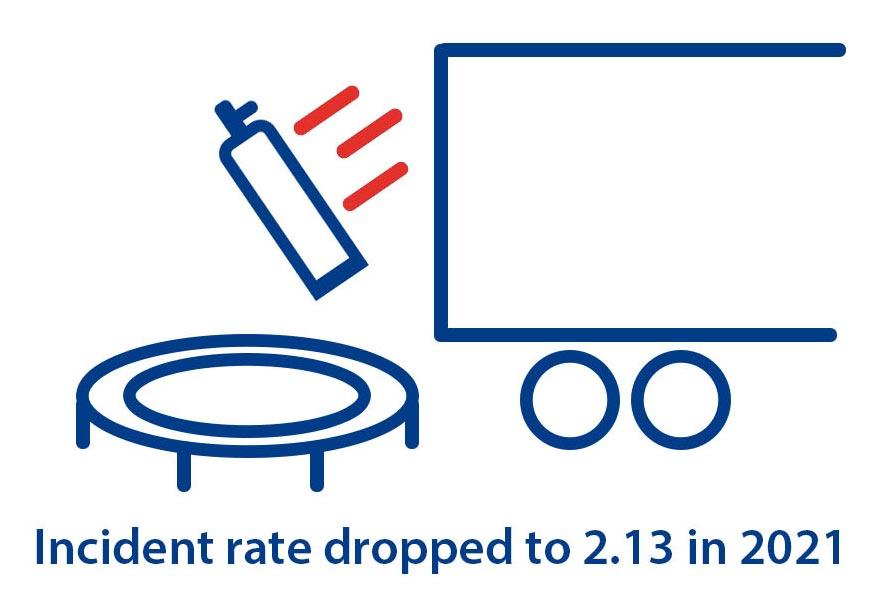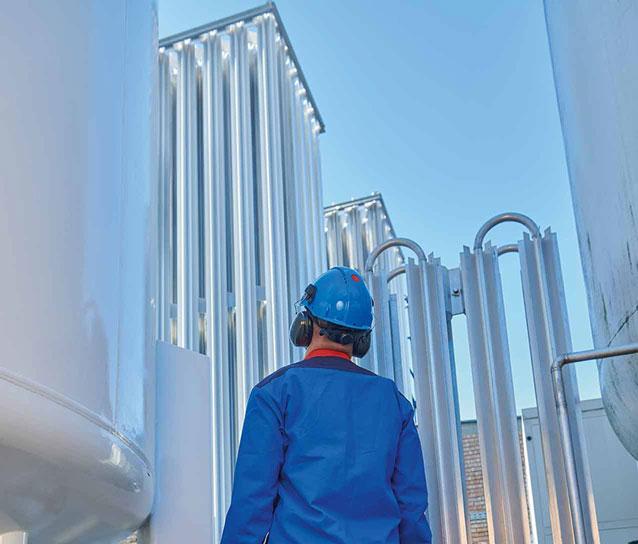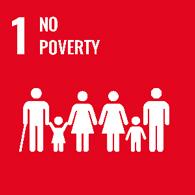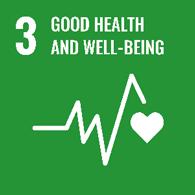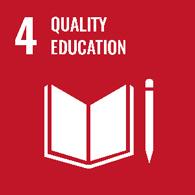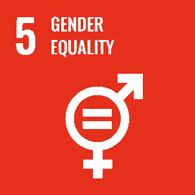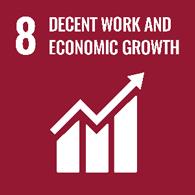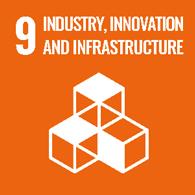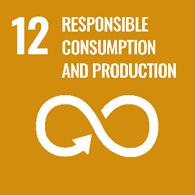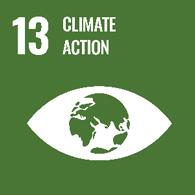Overview UN Goals
Breadcrumb
Header - Overview UN Goals
Introduction UN Goals
In 2015, under the aegis of the United Nations, the international community adopted Agenda 2030. It lays out 17 global goals together with the call to implement measures to achieve those goals. In particular, the Sustainable Development Goals No Poverty, Health and Well-being, Quality Education, Gender Equality, Decent Work and Economic Growth, Industry, Innovation and Infrastructure, Resonsible Consumption and Production, Climate Action and Peace, Justice and Strong Institutions are of great importance to Messer. Both global and local projects and activities, as well as initiatives supported by Messer, contribute to various sustainability goals. The individual projects contribute to long-term improvement and can be viewed here:
UN Goal 1 - No poverty
Ria Messer Foundation
The aim of the Ria Messer Foundation is to support the most vulnerable members of our society. In accordance with the charter, the foundation supports charitable projects and public welfare projects.
Even today, there are many people who are more vulnerable than others. People who are sick or need care, people who do not receive enough support in our society, but desperately need help. This is precisely where the Ria Messer Foundation seeks to provide assistance. In keeping with the times, it fulfills the binding social contract implicit in the will of the founder: helping other people.
The Ria Messer Foundation treats all people with respect and tolerance. Its activities encompass support and funding as well as operational aspects. It has been a charitable dependent foundation established under private law since it was founded. It is held in trust by the Dr. Hans Messer Foundation.
The purpose of the foundation is to provide support to specific individuals within the meaning of § 53 AO (German tax code) and to promote social welfare. This purpose shall be achieved by helping individuals who are dependent on the help of others as a result of their physical, mental or psychological condition (§ 53 No. 1 AO of the German tax code), who find themselves in need through no fault of their own, for example as a result of natural disasters, who are in need according to § 53 No. 2 Clause 3 AO of the German tax code, by providing one-off or ongoing financial support in order to remedy their need in the long term or by financially aiding the work of the leading independent welfare organizations or other tax-privileged bodies operating in the charitable sector or other tax-privileged organizations providing care and treatment to individuals suffering from serious illnesses through no fault of their own.
International: Donations for the people affected by typhoon “Molave” in Vietnam
Messer organized an international drive to collect private donations from among all employees in solidarity with the employees of Messer in Dung Quat, Vietnam, and their families who were affected by the typhoon “Molave.” In so doing, they supported the reconstruction of private homes, an infirmary and schools, and provided direct care for people in urgent need.
Spain: Food bank donations
The Covid-19 pandemic, which affects the entire planet and each and every one of us, has triggered not only an unprecedented health crisis, but also an economic and social one as well. Many families depend on aid for survival. The number of requests received by the food bank (Banco de Alimentos) in Spain, for example, has risen by 40 percent this year. In view of this situation, Messer Ibérica renewed its collaboration with Tarragona’s regional food bank. In 2020, a donation of 3,000 euros was used to invest in the purchase of food for the neediest families.
Spain: Support for people with cerebral palsy
In Tarragona province, the foundation La Muntanyeta supports people with cerebral palsy in a dedicated school, a day care center and a dormitory. Its goal is to defend the rights of these people and to improve their quality of life. The foundation is currently building a new center, La Muntanyeta Bonavista, which will give disabled persons a home and provide them with room for lifelong projects. This segment of the population suffers from tremendous need and long waiting lists. The center will provide 50 places in the day care center and dormitory rooms for 60 adults. Messer was one of the first companies to support this project. Thanks to that support, every room of the new facility will have a medical oxygen supply station.
China: Donations for the poor
To relieve poverty and support disabled persons, the local Chinese Messer company ZMG donated 30,000 renminbi to needy families in the area in 2019.
USA: Day to help others
In November 2019, the employees at our location in Stewartsville, New Jersey, gathered for a day as volunteers to help deserving members of the community. The employees donated their time and worked together with the nearby Saint Philip & Saint James Church to distribute some 400 Thanksgiving meals to needy families just in time for the holiday. It was a team-building exercise in the service of a good cause and offered proof of Messer’s commitment to mobilize for the well-being of society and of the communities where we work.
Americas: Season of giving
During the Messer “Season of Giving Campaign” in December 2019, employees of various locations in the USA, Canada, Brazil, Colombia and Chile took time out to give something back to their community. From Bogotá to Vancouver, Messer volunteers donated essential non-perishable goods to local food banks, assisted more than 30,000 families, and worked together with local hospitals and charities over the Christmas holidays, in order to support the neighborhoods around our companies.
USA: Food donation
In 2019 the employees of the headquarters of Messer Americas in Bridgewater, New Jersey, donated food to feed hungry people in the local community. Just in time for the Christmas holidays, the volunteer helpers gave the donations to the Food Bank Network of Somerset County in New Jersey.
Volunteers in Vancouver, Washington, collected and delivered more than 300 kilogram of food to the Clark County Salvation Army Food Bank, which distributed it to the local community during the holidays.
Colombia: Food drive
Messer Colombia organized a food drive to collect and donate food to feed many families during the holidays in 2019. The employees of Messer Colombia also volunteered at the Food Bank of Bogotá, where they packaged nutritious food to support some of the city’s most impoverished communities. Messer Colombia employees also collected Christmas gifts for children receiving care under the REMEO program. A team of Messer volunteers visited the REMEO facilities, spending time with the children and reading to them. Messer employees from throughout Colombia distributed and donated gifts to young patients in several cities where our REMEO program operates. The gifts brought a smile of delight to the face of many children receiving ventilator support.
Brazil: Successful holiday food drive
In 2019 dedicated volunteers from Messer Gases Brazil completed a successful holiday food drive, collecting and distributing tons of non-perishable items to feed the needy during the holidays. The Messer Brazil Industrial Maintenance team also worked together with the Rio de Janeiro-based charity SBA (Anchieta Charitable Society) to collect desperately needed goods and distribute them to needy families.
Chile: Gifts for the the children of Moritas Garden
In 2019 employees of Messer in Chile visited the children of Moritas Garden, where volunteers organized activities such as face-painting, a puppet show and a visit from Santa. In collaboration with our logistics services provider in Chile, Red Cargo, Messer employees distributed gifts and were glad to see the beaming smiles on the faces of the children.
Brazil: Solidarity for underserved communities
For the Messer Brazil team’s year-end charitable effort, employees donated around 300 new or semi-new toys to local non-government organizations (NGO) and other institutions. In addition, through a Solidarity Raffle, employees voluntarily donated cash to be split among four NGOs.
Canada: Addressing food insecurity
Employees at the offices, plants and branches of Messer in Canada support the Breakfast Club of Canada as its national charity. Messer colleagues participate in several internal campaigns throughout the year, raising funds that enable students to gain access to nutritious foods. The team donated close to $25,000 to the Breakfast Club of Canada in 2021.
Croatia: Solidarity after earthquakes
Two powerful earthquakes shook central Croatia at the end of December 2020. The quakes destroyed the small towns of Sisak, Petrinja and Glina. In Zaprešić alone, more than 100 families were forced to leave their inhabitable homes. To provide rapid support to the victims of the natural catastrophe, Messer initiated a fundraising drive.The entire workforce donated part of their December salary to help affected families make their homes habitable again.
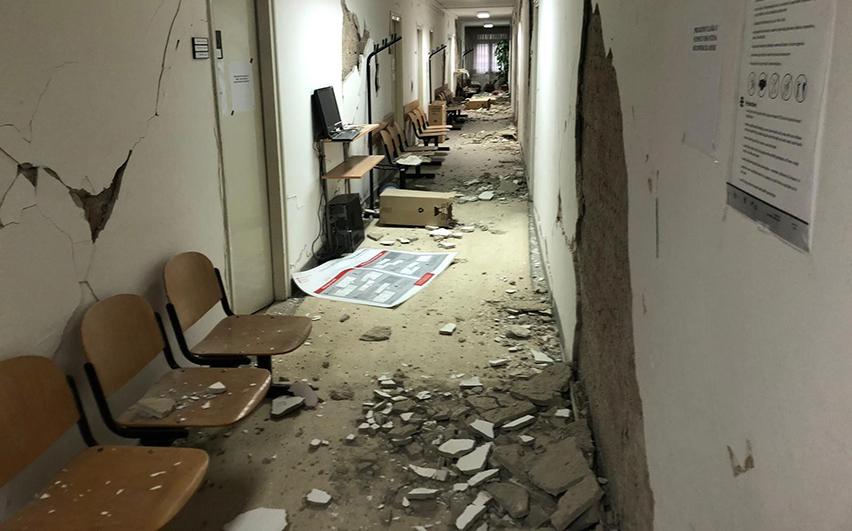
Germany: Help after catastrophic flooding
In mid-July 2021, heavy rains triggered devastating flash flooding along several tributaries of the Rhine River. There were 184 deaths in Germany. To support aid efforts in the flooded areas, Messer provided protective clothing, buckets, tools, pumps and drying equipment, drinking water, batteries, disinfectant, insect repellent and headlamps.
Beekeeper, Messer’s in-house communications app, was used to organize the deployment of volunteers from the workforce. On July 21, Messer teams traveled to the heavily impacted Ahr Valley to help with the clean-up. Among other things, they removed heating oil-contaminated sludge and water from cellars and cleared away debris.
A short time later, Stefan Messer visited affected colleagues and their families in Sinzig and Ahrweiler and decided: We’ll keep on helping. Messer organized an international solidarity campaign. Donations from employees and from Messer SE & Co. KGaA provided financial support for three facilities affected by the flood: An elementary school, a kindergarten, and a home for disabled persons.
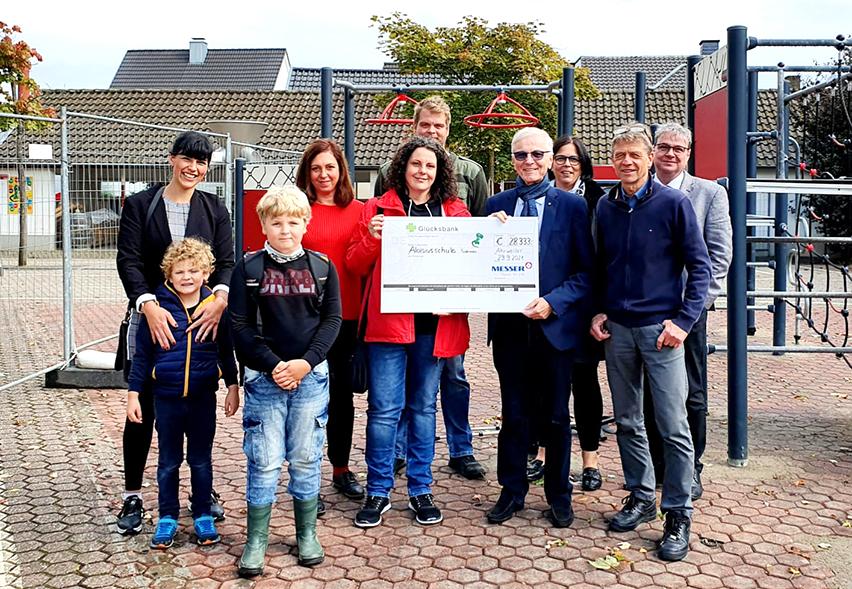
Hungary: Support for three relief efforts
Messer in Hungary supported three relief efforts: One donation went to an organization that is helping a child who suffers from leukemia and whose family needs financial support. A local animal rescue station and an institution that promotes better education for children from the poorer regions of the country were also supported.
Spain: New food bank donations
In Spain, the coronavirus pandemic triggered an unprecedented crisis affecting healthcare, the economy and social services. Many families depend on aid for their existence. The number of requests from the needy at the Spanish food bank “Banco de Alimentos” has increased by 40 percent since the outbreak of the pandemic. In view of this emergency, Messer in Spain decided once again to make a donation to support the food bank in Tarragona province.
USA: Holiday clothing drives for people in need
For the holiday season, Messer in the Bridgewater, New Jersey, corporate office hosted clothing drives to benefit underserved communities. New winter clothing was donated to the Veterans Affairs Supportive Housing community, an organization that provides supportive services to help veteran residents re-enter the workforce.
Additionally, the MEPS collected clothing and personal effects from employees in the Stewartsville, New Jersey and Naperville, Illinois sites. The clothing collected was donated to the WINGS program, the largest domestic violence service provider in the state of Illinois.
Vietnam: Covid rapid tests donated, donations received
In July 2021, Messer donated 30,000 Covid-19 rapid antigen tests to Vietnam. Messer regularly provides support to communities in areas surrounding its Vietnamese production sites and has helped establish and upgrade several hospitals and schools there in recent years.
Our worldwide workforce is also committed to supporting Vietnam: the proceeds from an in-house solidarity campaign helped rebuild the apartments and homes of our Vietnamese workforce. They were damaged or destroyed by tropical storm Molave. The donations also procured a power generator for the medical facility of the municipality of Dung Quat and repaired a school.
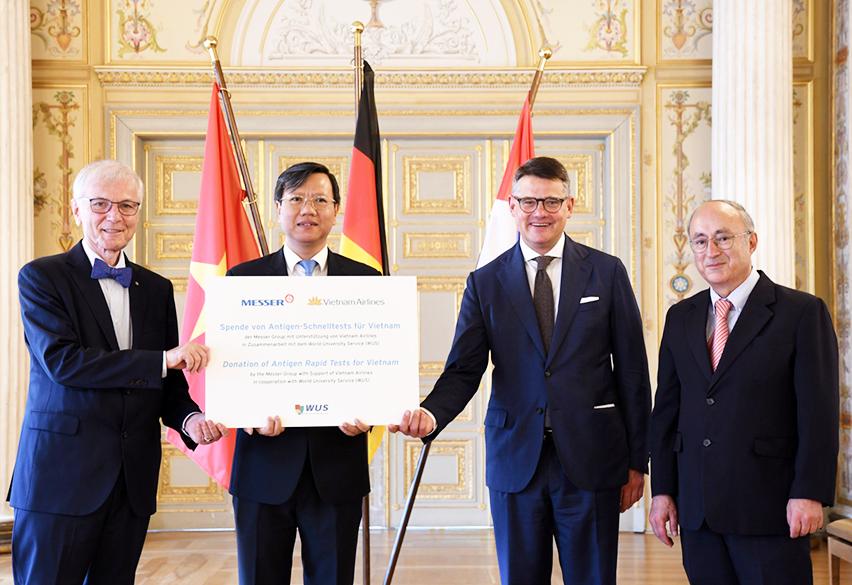
UN Goal 3 - Good Health and Well-beeing
Safety of our employees
In order to ensure the safety of our employees, our network of safety officers study and document all safety-related incidents at Messer. Information and training materials help further improve the safe handling of our products and applications and encourage safe behavior by employees at the various workplaces.
|
|
|
The number of reported industrial accidents with loss of working hours increased at Messer from 44 in 2020 to 48 in 2021. The rate of loss of employee working time per million hours worked (accident frequency rate) increased from 2.0 in 2020 to 2.18 in the year under review. The number of working days lost per million hours worked (industrial accident severity rate) rose from 56.3 in 2020 to 69.15 in 2021. A total of 81 reportable industrial accidents were recorded in 2021, which was two fewer than in the previous year. The accident frequency rate of reportable industrial accidents per million hours worked decreased from 3.7 to 3.67. Unfortunately, we suffered one death among Messer’s workforce last year due to a traffic accident.
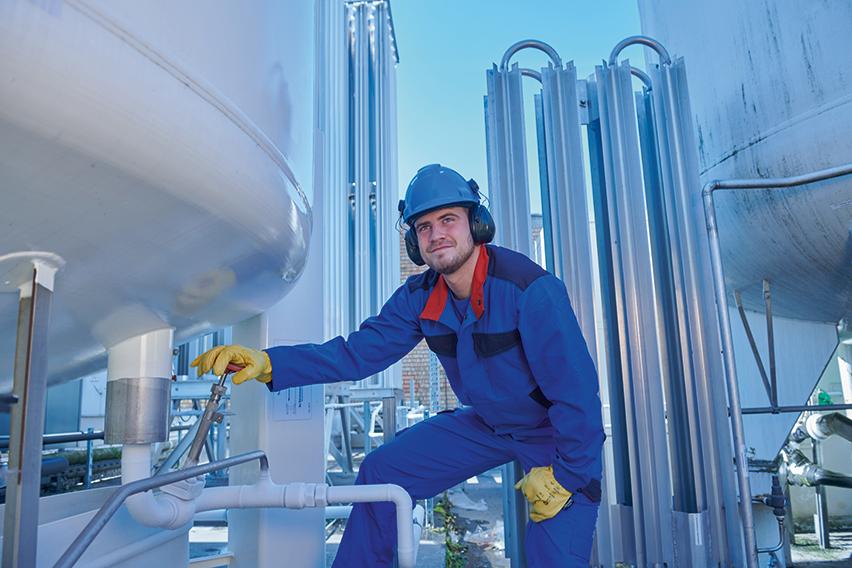
Safety Week 2021
As in the previous year, this year’s Safety Day once again took the form of a Safety Week: from September 13 to 17, 2021. Each national subsidiary was free to choose the optimal timing for its own Safety Day during that week. Pandemic-related precautions also had to be taken. The interconnecting motto of Safety Week 2021 was “Managing risks.”
Examples of Safety Week implementation
At Messer’s German locations in Bad Soden, Krefeld and Bad Hönningen, Messer Safety Day took the form of a virtual meeting: A presentation explained the significance and sense of risk analyses. Practical examples showed how complex professional risk management can be.
At our production sites in Castrop-Rauxel, Salzgitter, Siegen and Speyer, the employees gathered for in-person meetings in small groups.
At Messer in France, a total of 17 in-person workshops were held in small groups at nine locations. Two virtual meetings were also organized, where one of the main messages was that risk management concerns all of us and not just our employees in the production facilities or filling plants.
Because Messer in Poland equipped its locations with defibrillators in 2021, Safety Week there started with an online training course about their operation. Presentations about risk management and a subsequent feedback session rounded out the activities.
Messer in Switzerland organized a fire protection exercise for employees. Among other things, employees learned how to use a fire blanket and to identify various types of fire extinguishers.
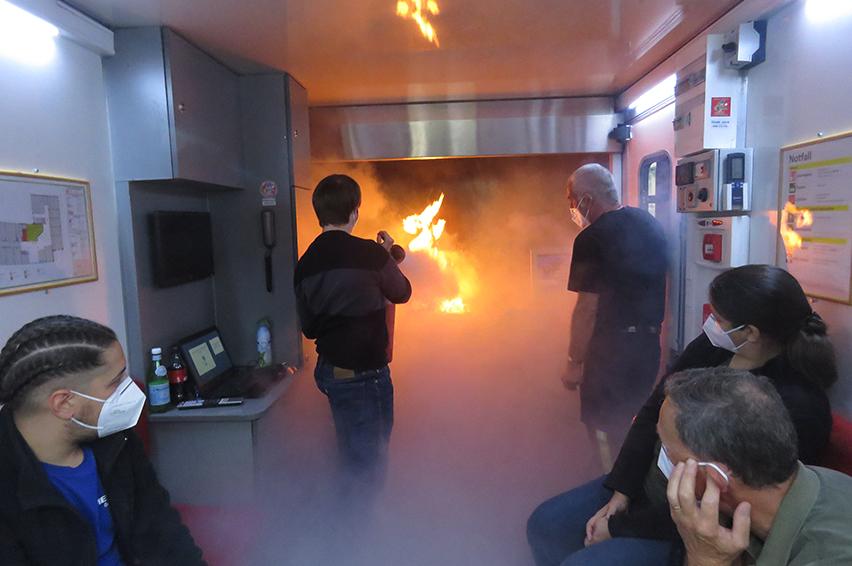
Messer in Spain organized all events as online meetings. There were video conferences where the significance and purpose of risk analyses and concrete measures were presented. Employees with direct access to the company’s own computers attended the video conference in the conference rooms of the production plants.
The team from Messer in Thailand organized a meeting in the hall of its filling plant. The presentation emphasized personal accountability among all employees – every time and everywhere.
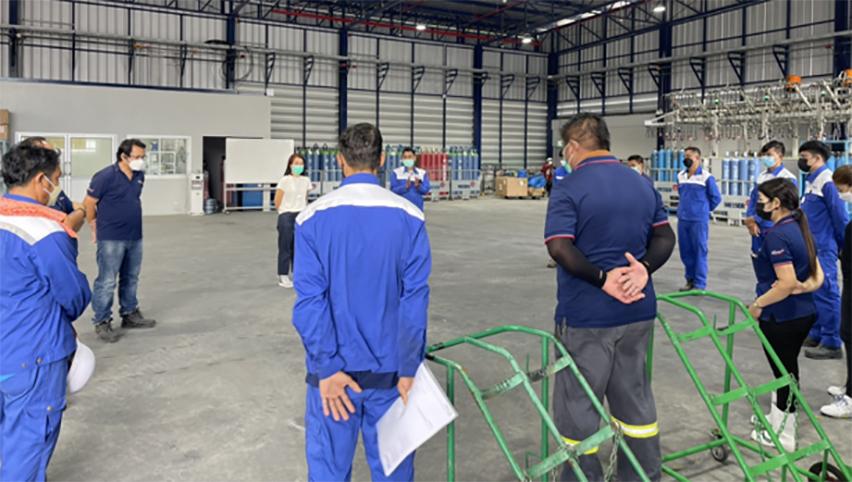
In Hungary, Dr. Emil Toldy-Schedel, founder of Hungary’s first post-Covid center, gave a presentation. He explained the complexity of a therapy process for treating the long-term effects of a Covid-19 infection.
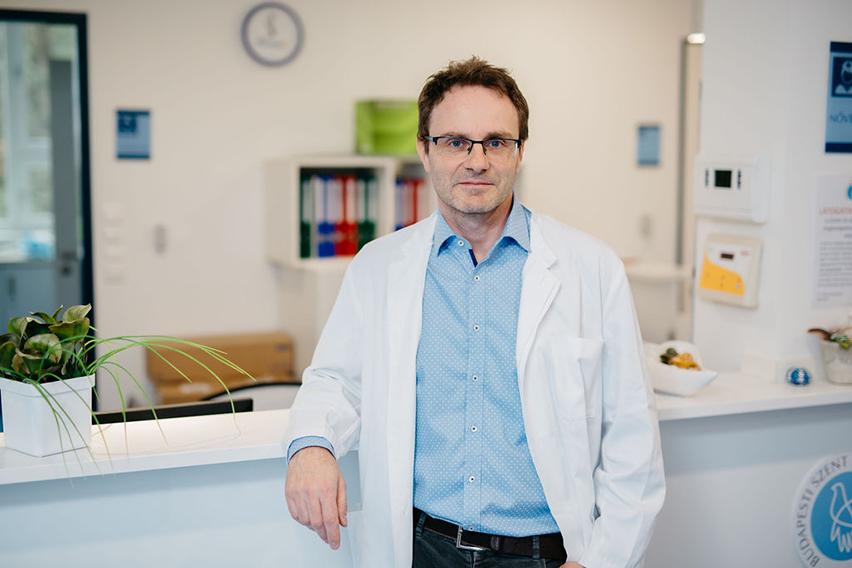
Europe: EIGA safety awards
Every year, the European Industrial Gases Association (EIGA) recognizes member companies for accident-free work at their sites. In 2021, this included four Messer locations and companies. The Bad Soden (Germany) site and the Dugi Rat (Croatia) site each received a “Silver Safety Award” for ten consecutive years without reportable work-related accidents. The Pančevo (Serbia) site and the Saint-Herblain (France) site each received a Bronze Safety Award for five consecutive years without reportable work-related accidents.
Americas: Safety awards of the Compressed Gas Association
In North America, Messer was recognized by the Compressed Gas Association (CGA) for its safety performance in several categories. One Messer site received the safe facility performance “Silver Award” for 500,000 Hours or 10 Years with no lost time work accidents. Another site received the safe facility performance “Bronze Award” for 250,000 Hours or 5 Years with no lost time work accidents. Messer Americas was recognized with the Fleet Safety Excellence Award for bulk gas transportation, over 20 million miles per year. Finally, a Messer fleet engineering supervisor was recognized with the CGA’s Charles H. Glasier Safety Award in recognition of his safety leadership in the industrial gas industry.
Spain: FEIQUE award for safety
On October 8, 2020, Messer Ibérica was honored for the seventh consecutive time with the safety award of the Spanish chemical industry employers’ association (FEIQUE) for another accident-free year. Messer Ibérica has reported zero industrial accidents for more than 18 years now at the Vila-seca air separation unit, more than 11 years at the El Morell site, and more than 10 years at the Alicante filling plant.
China: Award for safe production
In 2019, the companies of the Messer Group including Western Europe held a combined total of 1,452 customer safety seminars, which were attended by 4,392 people in all. The facilities operated at our customers’ sites underwent technical inspections an average of 1.07 times and they underwent safety audits an average of 0.15 times. The 2020 fiscal year will mark the first time that the corresponding data will be available for Messer in North and South America. In 2019, we reissued our “Pocket Safety Guide” brochure series. It provides information about the safe transport and handling of gas cylinders, the safe transport of dry ice, and the content of gas cylinders.
Safety of our customers
Messer assists with development of an UV-C desinfection system
The worldwide coronavirus pandemic has underscored the importance of regularly disinfecting hands and surfaces and complying with hygiene measures. In 2020, Messer worked with Heraeus Noblelight to develop a mobile UV-C disinfection system for decontaminating surfaces and shapes of all kinds. To make it as versatile as possible to use, the system is designed as a hand-held device. The system from Heraeus’ Soluva product range can be used to sterilize not only production machinery and vehicles, but also public buildings and offices, as well as numerous fabrics, motor vehicle interiors, and control panels, along with many other surfaces.
Messer itself is relying on the mobile UV-C disinfection system throughout Europe to disinfect gas cylinders for medical oxygen when hospitals or patients return them for refilling. Disinfection with UV-C light offers many advantages over the chemical approach: it considerably reduces the amount of effort required; it minimizes risks for operators, consumers and the environment; and it lowers the risk of material damage to pressure tanks and their accessories.
Safe handling of gas cylinders
Three new video clips from Messer informed viewers how to deal with gas cylinders safely. They describe the labeling of the cylinder contents and demonstrate the most important rules for transport and handling. The clips are a supplement to the pocket guides, which are available to download as PDFs at messergroup.com. They cover these topics comprehensively.
Safety of our logistics and vehicles
To manage the road transport of gases as safely as possible, Messer uses – in addition to the statutory regulations – a proven transport safety concept. In Europe, by signing the European Road Safety Charter, we have also undertaken to focus specifically on the safety of our fleet.
For our logistics, we developed safety measures on the national and international level. A continuous exchange of experience among logistics and safety personnel helps to further improve the level of safety in this area.
For the most part, Messer employs external carriers to transport our gases, with the exception of Messer in North America where employee drivers transport gases. Accordingly,
While Messer in America uses its own employees to transport gases, Messer in other regions primarily contracts external transport companies. In this case the legally required training of the drivers is the responsibility of those companies. We supplement their training courses with a driver training program developed by Messer Corporate Logistics. This is supported by an on-board computer system, which has been used in the vehicles since 2019. It records safety-related driving data, and thereby contributes to goal-oriented training. Based on driving data and integrated sensors, it also encourages more defensive driving through the use of acoustic and visual cues while on the road. This makes our transports even safer while also protecting our environment through lower fuel consumption.
In 2021, there were 74 preventable accidents during the transport of our cylinder gases. In the previous year, that number was 64. That apparent degradation in performance should be viewed, however, in the context of the accident frequency rate per million kilometers driven: it fell from 3.05 in 2020 to 2.13 in the year under review. So in proportion to the distance traveled, there were fewer accidents on average. The number of avoidable accidents while transporting liquefied gases was 161 in 2021 versus 194 in 2020. This positive trend is confirmed by the frequency rate per million kilometers driven: from 0.89 in the previous year, it fell to 0.8 in 2021.
Through appropriate supplier management, driver training courses and technical assistance, such as the new on-board computer system, we want to reduce the absolute number of avoidable accidents and further improve the accident frequency rate. Driver manuals with individually tailored content for operating bulk, cylinder and service vehicles keep all key information on hand at all times.
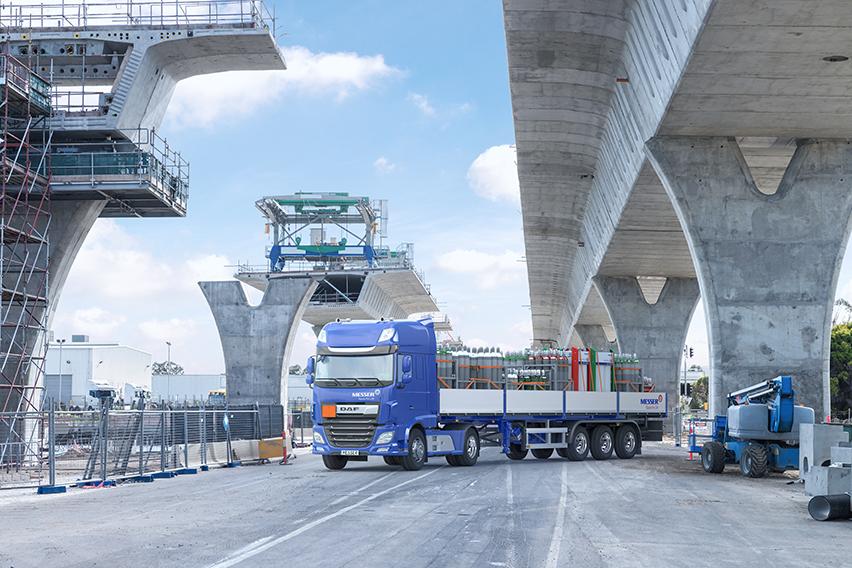
Messer is a partner in the medical and pharmaceutical sector
Messer is active in the medical business in over 20 countries and provides services ranging from consultation on the delivery of medicinal gases or gases as medical devices through to the planning, installation and maintenance of supply systems – a complete service package from a single source. Medical accessories and consumables round out the offering.
As a company that is also active in the pharmaceutical sector, Messer complies with all national, European and international regulatory requirements. For gases as medicinal products, this specifically includes the requirements of (European) Good Manufacturing Practice (EU-GMP) and the specifications of the European Pharmacopoeia. Our gases as medical devices comply with the Medical Device Regulation (EU 2017/745), the previously applicable Medical Device Directives, and the corresponding national laws.
Internal audits, a standardized pharmacovigilance system, and validated procedures and computer systems ensure our product and supply quality.
Supplying medical gases for people suffering from Covid-19
The supply of medical oxygen to hospitals for ventilation purposes for people suffering from Covid-19 was and is especially important:
Supply to the patients during the crisis can be assured by significantly increasing production capacities, installing additional tanks and evaporators at our customers’ facilities, and providing additional transport equipment. These measures are being implemented while applying additional protection systems for our employees.
With a new filling center in Saint-Georges d'Espéranche near Lyon, Messer in France was able to satisfy the SARS-CoV-2 pandemic-driven increase in demand for medical oxygen in cylinders and bundles. The successful start-up of the filling center in early-March 2020 followed several months of preparation along with obtaining the necessary approval from the French regulatory agency for medical devices and health products.
Spain is one of the countries most affected by the SARS-CoV-2 pandemic. Like many of our neighboring chemical companies in the Tarragona chemical complex, Messer in Spain reacted rapidly and increased our production of urgently needed products. In the first weeks of the emergency, we doubled our production of medical oxygen. We delivered oxygen to 170 medical centers in all – 32 of which are hospitals with liquid supply – but also patient transport services and home care providers. We signed a new agreement with a home care provider to supply nursing homes in the Barcelona area. Our engineering and installation specialists are working intensively to expand oxygen supply to hospitals and nursing homes and to install gas supply systems in field hospitals.
Messer in Hungary supplies medical oxygen to some 140 medical facilities nationwide, nine of which are hospitals that primarily treat people suffering from Covid-19. Our teams in Filling regularly and systematically sterilize our medical gas cylinders along with the filling stations. And they carry out their work under extremely strict precautionary measures.
Messer in Serbia has been able to meet the increased demand of hospitals and clinics: as an integral part of the equipment for stockpiling and supplying medical oxygen, we installed additional tanks in the Clinical Center of Serbia, in Karaburma Military Medical Center in Belgrade, and in the military hospital in Niš. At Zemun Clinical Center, we expanded supply capacities by also adapting the central pipeline supply and three substations to the increased demand for medical oxygen. In addition, transportable cryogenic tanks were installed in the Clinical Center in Kragujevac, in Zvezdara Clinical Hospital Center, in the Infectious Disease Clinic in Belgrade, in “Dragiša Mišović” Clinical Hospital Center – the maternity and children’s hospital in Belgrade – and in Karaburma 2 Military Medical Center.
New York was affected by the coronavirus pandemic like no other metropolitan area in the USA. Due to the tremendous demand for medical oxygen, we increased production in our own plants. Newly configured truck routes ensured continuous delivery. Our teams monitored the systems every day, reacted rapidly, and collaborated closely with every hospital. This also included the solicitation of new demand quantities along with information on how to recognize when our bulk equipment might need maintenance.
The “Expofutura” convention center in Pereira, Colombia, was temporarily converted to a field hospital to treat people suffering from Covid-19. This added 45 patient beds to the region’s capacity. Messer in Colombia also installed a piping network to supply medical oxygen.
National Nurses Week in Colombia
During 2020's “National Nurses Week”, Messer honored the healthcare personnel who work for the company’s own REMEO Medical Services. The REMEO program of Messer in Colombia offers life-saving medical oxygen and home care for people on artificial ventilation. Messer also remains firmly committed to supplying products to people suffering from Covid-19 – both in REMEO centers and in hospitals throughout Colombia that depend on Messer’s medical gases and services.
In Colombia, Messer is the market leader for stationary and home care, supplies hospitals with medicinal gases, and helps them develop their gas supply systems. Although the systems generally run only as far as the hospital rooms or operating rooms, in Colombia the supply is designed for the patients themselves. Along with the permanently installed infrastructure, Messer also supplies inhalers and ventilators as well as other accessories needed for the supply of medicinal gases or breathing air to individual patients. In so doing, Messer supports more than 36,000 people at home, who rely on supplemental oxygen to breath. In addition to gas in cylinders, most of them receive oxygen concentrators that filter oxygen from the surrounding air. Within the framework of its REMEO program, Messer also maintains six clinics of its own for some 350 people whose severe chronic respiratory diseases necessitate continuous care. The REMEO clinics also have sleep laboratories for treating nocturnal respiratory disorders. In all, Messer employs some 1,200 nurses and caregivers in Colombia, who are specially trained and can develop their expertise considerably through their work with REMEO.
Spain: Gas supply for people with cerebral palsy
In the Province of Tarragona, the Spanish foundation “Fundació La Muntanyeta” supports people with cerebral palsy, in order to defend their rights and improve their quality of life. More than 100 people receive care in a school, a day care center and a dormitory. In 2019, Messer actively supported the construction of a day care center and additional dormitory rooms and provided a vacuum system and medical oxygen supply for all rooms. People with cerebral palsy often suffer from respiratory trouble. According to a concept from Messer, the supply system makes it possible to provide the healthcare in the room that the affected person occupies. They can remain in their own private space, and therefore in a comfortable environment, when they need medical assistance.
Czech Republic: Sport and relaxation for work at Messer
Health is about more than just medicine – a positive work environment is also important for one’s well-being. For that reason, Messer in the Czech Republic furnished its headquarters in Prague with a new break area that includes a kitchen, a rest zone and two telephone rooms in 2019. And the offices of the Czech joint venture MG Odra Gas in Ostrava-Vratimov have also been renovated and equipped with sport areas. With these investments, Messer in the Czech Republic has been creating the right conditions for a satisfying, healthy workplace – and thereforealso for a motivated, effective team.
Hungary: Company health insurance for all employees
Since 2019, through its company health insurance fund, Messer Hungarogáz offers its employees the full range of private medical services. The high-quality healthcare services of Medicover are available to the employees in all medical areas, including examinations, state-of-the-art diagnostics, and hospital care. The agreement is supplemented by the full spectrum of emergency services throughout the capital city of Budapest. In this way, even in an emergency, employees and their families have ready access to high-quality medical services without waiting periods.
Germany: Christmas donation for children with cancer
In 2019, once again, Messer companies in Germany donated some 5,500 euros – profit from the sale of food, beverages and stainless steel art – to the association “Hilfe für krebskranke Kinder Frankfurt e.V.” (“Frankfurt Helps Children with Cancer”). November 2019 marked already the fifth time that Messer has organized a Christmas market on Messer Square at the corporate headquarters.
Spain: Sporty kids
In 2019, Messer started supporting the “Montbike Messer Kids” mountain bike club, where girls and boys from 5 to 14 years of age practice. They already have competed in mountain bike and cross-country races in Catalonia and other regions of Spain as well as in international competitions in France and Belgium. Three club members are already classified as Catalonian champions.
Switzerland: Promotion of disabled sports
For many years now, Messer in Switzerland has been supporting the association PluSport Behindertensport Schweiz. That commitment to the promotion of disabled sports in Switzerland was recognized once again in 2019.
Slovenia: Support for running events
Messer in Slovenia supports regional sporting events in which employees of Messer Slovenija also participate. One of them is Dani Bastašic, who works as a warehouse clerk in the cylinder gases area. Each year he runs in more than ten races throughout Slovenia – including the 2019 edition of the “Vetrov tek” race, which was the 11th time it has been held in Ruše. Supported by Messer, the competition attracted many running enthusiasts of all ages.
Brazil: Cancer prevention awareness
In recent years, Messer in Brazil has launched initiatives for the early detection of breast and prostate cancer. To raise the workforce’s awareness of cancer prevention, virtual meetings with doctors were held, e-mails were sent out, and information was provided via LinkedIn. In Brazil, breast cancer is one of the most fatal diseases in women from 35 to 54 years of age. Prostate cancer is considered to be the second most frequent form of cancer among men.
Spain: Safety training at two locations
Messer in Spain conducts annual safety drills. In November, their plants in El Morell and Vilaseca simulated hazardous conditions that can occur in connection with oxygen and hydrogen. The exercises were supported by the fire departments of the Tarragona chemical complex, which are maintained by the member firms of the local chemical association.
USA: Cooperation with rescue personnel
Jason Caver, plant technician at Messer Americas in Birmingham, Alabama organized plant tours for local rescue personnel in small groups. The visitors were given an overview of the operations of the plant. Site tours focused on the rescue personnel’s correct response during potential emergencies on the company grounds along with the minimization of associated dangers.
USA: Warning about falling objects
Messer Americas used online training courses to raise awareness for the dangers of falling objects. Employees of Messer and of outside companies participated. DROPS, as the training program was aptly named, relied on the train-the-trainer model, whereby people who had already been trained could pass their newly gained knowledge along to the rest of their team.
Resupplying oxygen during the pandemic
The coronavirus pandemic caused a dramatic increase in the demand for medical oxygen, especially during the second and third waves. Messer undertook a series of actions to address it. In filling plants for cylinder gases, which normally manage with a day shift, additional shifts were organized. At peak times, some plants worked around the clock. The same was true of logistics. One unit that had been shut down was restarted.
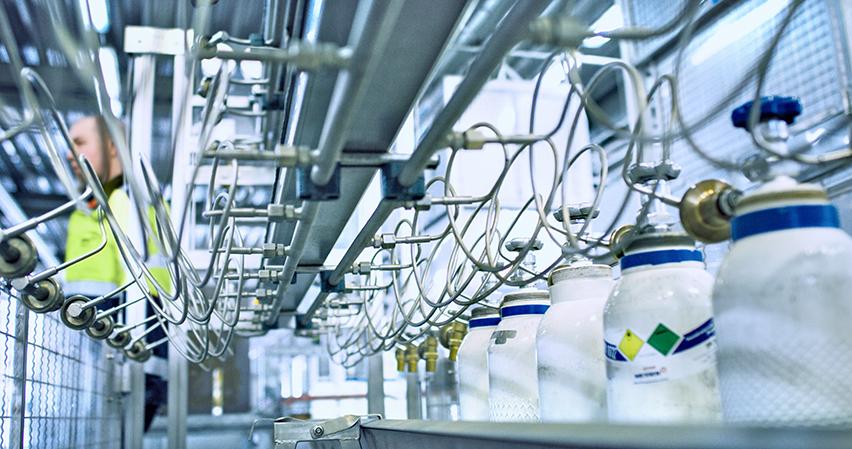
Dry ice protects mRNA vaccines
At -70°C, the mRNA vaccine against the Covid-19 virus remains stable for a long time. To maintain that temperature while transporting the vaccine, dry ice is often used: it has a temperature of -78.5°C. Since the approval of the first mRNA vaccine, the Messer subsidiary ASCO has experienced a huge increase in demand for dry ice and the associated equipment. Many logistics companies have built up the relevant infrastructure, often relying on expertise and products from ASCO and Messer as well as partner companies.
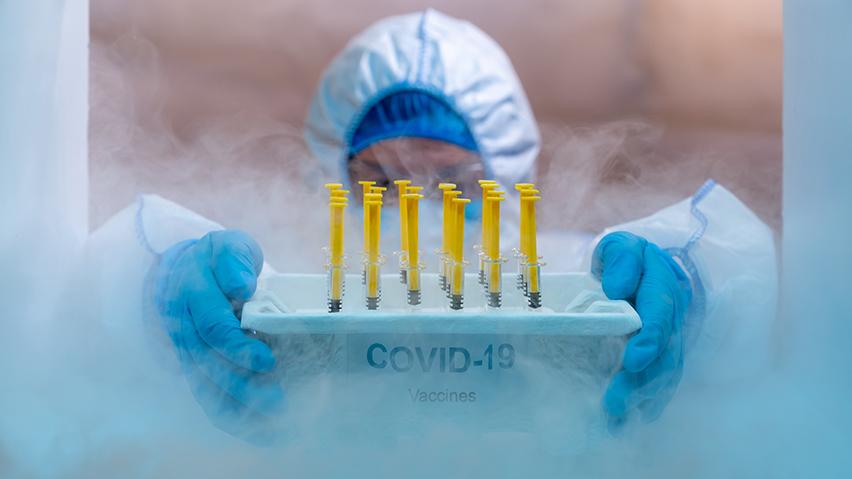
Freeze-drying for health
Freeze-drying can keep the active ingredients of drugs and vaccines as well as the vitality of bacteria cultures intact for extended periods. And liquid nitrogen is ideally suited to provide the required cooling. Messer works in close collaboration with manufacturers of the equipment required for these applications.
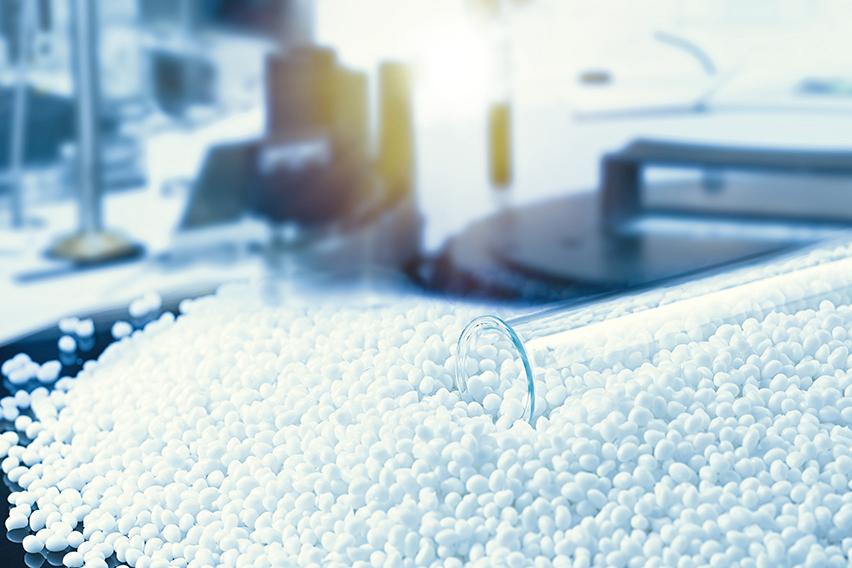
Gas mixture for fertility clinics
Along with cryogenically liquefied nitrogen, the fertility clinics of the international Vivaneo Group in some countries use a ternary mixture from Messer to grow egg cells and embryos in the incubator. In this new collaboration, Messer had two strong sales arguments: the application-specific gas mixture itself and its immediate availability – six weeks is the typical lead time in this market. Messer also supports the fertility clinics with reliable liquid nitrogen service.
Austria: Medical oxygen cylinders for India
In early May of 2021, Messer in Austria delivered 400 steel cylinders for medical oxygen, which were ordered by the Austrian Ministry of the Interior and the Organizational Development Department of the Workers' Samaritan Foundation Austria. The cylinders were part of an aid shipment sent to India by air freight. At that time, Indian hospitals and clinics were in an extremely critical situation due to the Covid-19 pandemic. Among other things, there was a serious lack of medical oxygen and oxygen tanks.
Colombia: Specialized in healthy sleep
During the coronavirus pandemic, Messer in Colombia developed a concept for providing online information to people who suffer from sleep apnea. The offering featured webinars led by experts from the fields of medicine, therapy and psychology, who specialized in the treatment of sleep disorder-related diseases.
France: Exchange with medical professionals
On March 30, 2021, a medical expert panel convened for the first time at Messer in France. The purpose of the event was to prepare for the market launch of Serynox/Placynox, an equimolar mixture of oxygen and nitrous oxide. Participants discussed its use and the associated benefits in the medical field, including obstetrics.
Germany: Gases for leak checking
Pharmaceutical packaging must be sealed to maintain the sterility of the contents and keep contaminants out. Seals are inspected using laser beams and sensors along with purge and calibration gases. The German machinery manufacturer Wilco has automated this process with high-tech machines and procures the necessary laboratory gases from Messer. Moreover, Wilco uses CO2 for so-called “bombing.” This involves exposing containers to a high-pressure carbon dioxide atmosphere in a closed chamber. The process detects any leaks in a matter of seconds.
Germany: NO gas mixtures for a hospital in Langen
Asklepios Klinik in Langen, Germany, expanded its ICU bed capacity. While on a ventilator, intensive care patients there receive a precisely metered quantity of nitrogen monoxide, which Messer provides in medical gas cylinders with nitrogen as a carrier gas. Messer also supplies consumables such as tubing for metering and measurement systems along with various accessories.
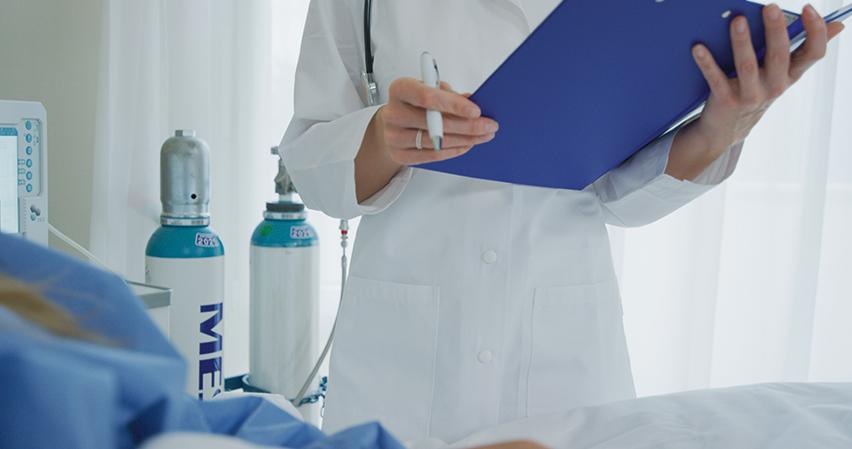
Hungary: Gas cylinder trolley for hospitals
The Hungarian sales team developed a gas cylinder trolley specifically tailored to meet the needs of hospitals and clinics. It is handy, easy to move, and offers space for two medical gas cylinders. A quick-change system makes it possible to switch the hose connection from one cylinder to the other very easily. The new trolley is used to supply medical gases for in-patient care.
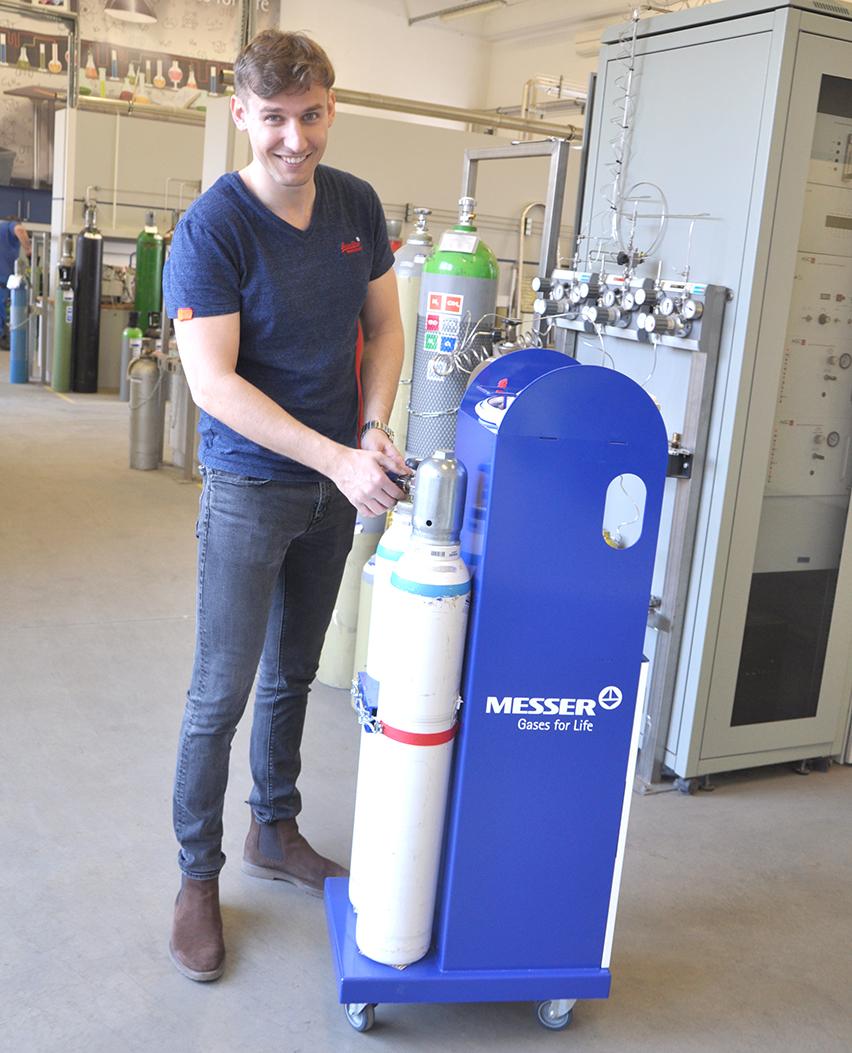
Hungary: Gases for Covid-19 research
Messer in Hungary signed an agreement with the National Public Health Center (NNK) to supply special gas mixtures and CO2. The gases are needed for coronavirus research. CO2 serves as the atmosphere for bacteria cultures and cell growth.
Hungary: Messer supports post-Covid center
Messer supported the establishment of Hungary’s first post-Covid center at Szent Ferenc Hospital in Budapest with a donation, gases expertise and the necessary products. Messer installed the technical equipment for the sophisticated gas supply system and satisfied the dramatically increased demand for gases used in post-Covid therapy.
Netherlands: Covid-19 rapid breath analysis
The Dutch company Breathomix specializes in breath analysis and the development of so-called “electronic noses,” which can be used for the simple, rapid detection of a wide range of diseases, including pulmonary diseases. The “SpiroNose” electronic nose analyzes the full range of volatile organic compounds in exhaled air in real time, and can thereby rule out a SARS-CoV-2 infection within one minute. The device is calibrated with one of our gas mixtures.
Slovakia: Evaporators for hospitals
To ensure an adequate supply of oxygen during the coronavirus pandemic, Messer installed higher capacity oxygen evaporators in several Slovakian hospitals. As the main provider of medical gases in Slovakia, we also resupplied them with the necessary oxygen.
Spain: Medical gases for Covid patients
Since early 2020, Messer has been supplying medical gases to Burgos University Hospital. During the second wave of the coronavirus pandemic, Burgos was one of the hot spots in Spain. The university hospital, one of the largest hospitals in the region, treated most of the Covid cases there, so the demand for medical oxygen rose dramatically. Messer installed a mobile auxiliary tank along with an additional evaporator and ensured the resupply of medical oxygen.
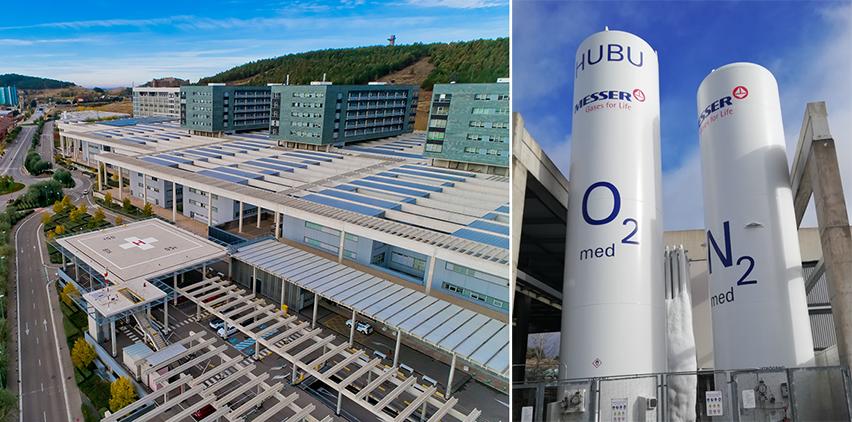
Spain: Stem cells from umbilical cord blood
Stem cells from umbilical cord blood likely hold the key to healing some serious diseases. At the Spanish cell bank VidaCord, parents can store the valuable material for future use. The cord blood is collected after birth and the nucleated cells, which also include the hematopoietic stem cells, are separated and cryogenically stored. The cooling and storage facilities use liquid nitrogen from Messer.
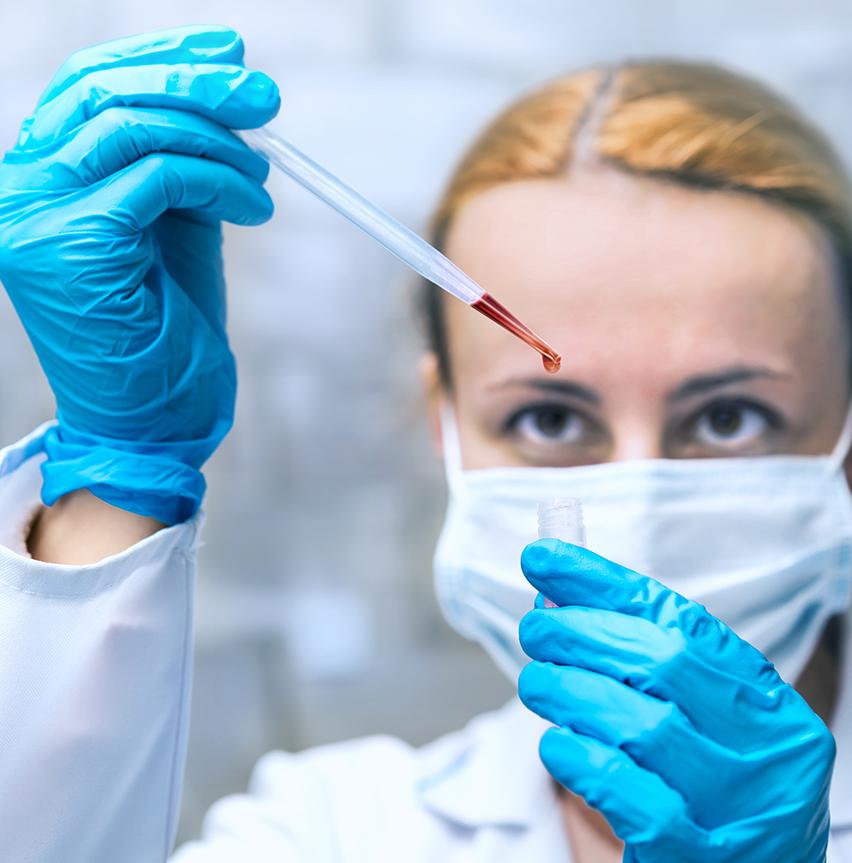
Colombia: Support for patients and victims of violence
Employees from Messer Colombia participated in the “Reading to our Patients” program at REMEO healthcare facilities. The program which encourages spending time with patients by reading to them provided much needed companionship. Employees also donated clothes to support women who are victims of violence and provided clothes and toys for their children through the Fundevida Foundation.
Spain: Donation for popular sports
Messer in Spain organized several activities to promote sports for children and adolescents and handed over donations to the Johan-Cruyff Foundation and the Costa Daurada soccer campus. The Cruyff Foundation develops sport projects for abused children and for children with disabilities. The Costa Daurada soccer campus is an association dedicated to the promotion of soccer sports for children and adolescents from 6 to 15 years old. Messer sponsors sportswear and accessories for the summer campus.
Switzerland: Recognition for promotion of disabled sports
For many years now, Messer in Switzerland has been supporting the disabled sports association PluSport. In 2021, we received another certificate in recognition of our support of disabled sports in Switzerland.
Vietnam: Covid rapid tests donated, donations received
In July 2021, Messer donated 30,000 Covid-19 rapid antigen tests to Vietnam. Messer regularly provides support to communities in areas surrounding its Vietnamese production sites and has helped establish and upgrade several hospitals and schools there in recent years.
Our worldwide workforce is also committed to supporting Vietnam: the proceeds from an in-house solidarity campaign helped rebuild the apartments and homes of our Vietnamese workforce. They were damaged or destroyed by tropical storm Molave. The donations also procured a power generator for the medical facility of the municipality of Dung Quat and repaired a school.

UN Goal 4 - Quality Education
Education, advanced training, know-how transfer
Messer is committed to the education and training of talented young professionals, who represent an important investment in the competitiveness and capability of our company. Some of that training takes place at various locations, supplemented by multi-week assignments abroad. As in the previous year, the training quota at Messer in 2021 was 1.3 percent.
Open dialog and in-house transmission of expertise are important to us. That’s why we promote the establishment and maintenance of cross-regional and intercultural networks. In 2021, most network meetings were held virtually. We use this to win over even more networking participants and to network our workforce on the professional level to an even greater extent. In all, employees participated 20,509 times – in most cases virtually – in site conferences or network meetings designed for strategic integration or know-how transfer. By contrast, that figure was 15,559 in 2020.
Selected network meetings of specialized groups
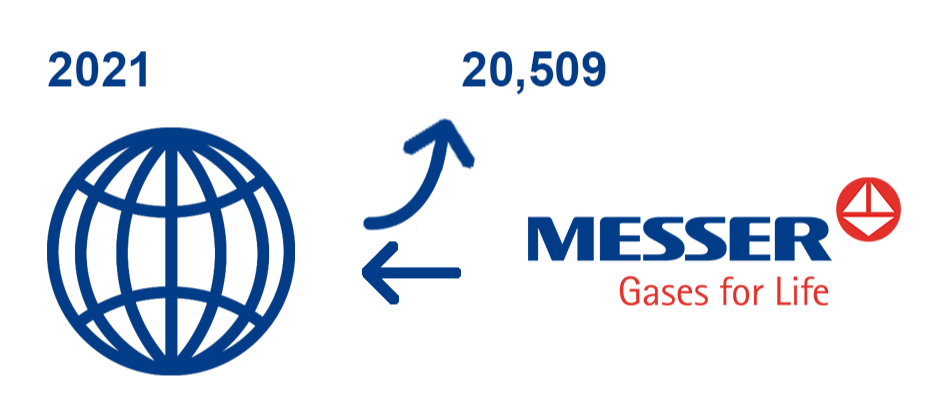
Messer reinforced digital networking activities in connection with the in-house Global Finance Conference. Along with existing channels, this communications concept relied on two new digital formats: The “Quarterly Touchbase,” in which reporting topics were discussed, and the “Finance Forum” for a topic-based exchange on innovations and best practices in the finance area.
For all regions, Corporate Application Technology held virtual meetings in the Food, Welding and Cutting, and High-Temperature Processes segments, as well as the annual Applications Manager Meeting.
The Global Workshop Specialty Gases was also held in four separate events, with participants from Europe, China, ASEAN as well as – for the first time – North and South America. It focused on exchanging information among the regions along with developing synergies and cooperation.
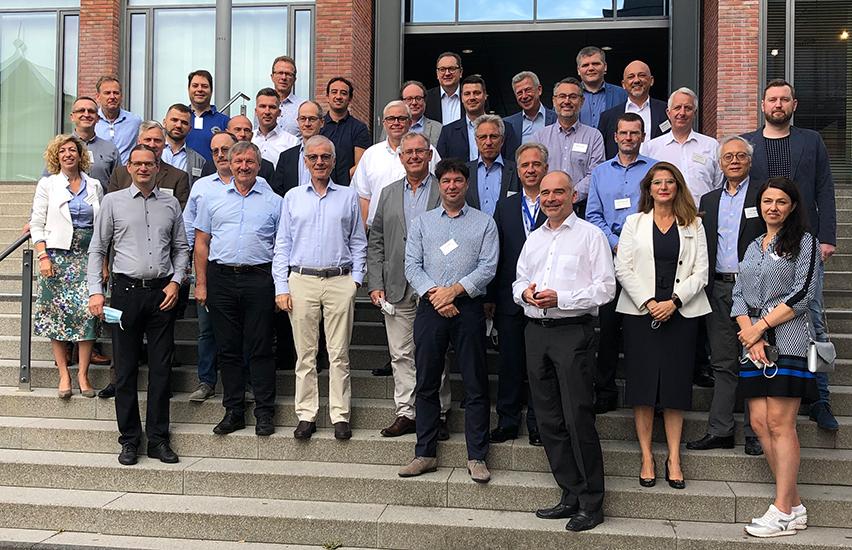
In September 2021, Messer held the Global Sales Meeting as a hybrid conference: While a large share of the European team traveled to Bad Soden to participate in person, the remaining employees of the international sales network and invited guests accessed the event virtually. Topics covered sales digitalization measures, business growth in the “clean hydrogen” segment, and the launch of a new system for Customer Relationship Management (CRM).
In 2021, Corporate Logistics organized three virtual meetings of the management teams in charge of logistics in the national subsidiaries. These meetings focused on current developments and mutual exchange, with the goal of further raising the productivity of logistics processes. Through the continuous optimization of supply chain management, Corporate Logistics is making a key contribution to greater efficiency and profitability.
Qualification offensive
We made good use of the time during the lockdown to qualify employees. Our “Messer Innovation Forum” advanced training platform for application engineering is designed for our customers, sales representatives, sales managers, application specialists and technicians. One of the aims of the forum is to transfer know-how from the individual divisions and departments to the national entities and subsidiaries. In the first half of 2020, our application specialists conducted a total of 100 webinars, for which 1,920 colleagues in Europe, Asia and the Americas registered. The software and the presentations were also made available to our teams in France, enabling them to train some 400 additional participants at the national level.
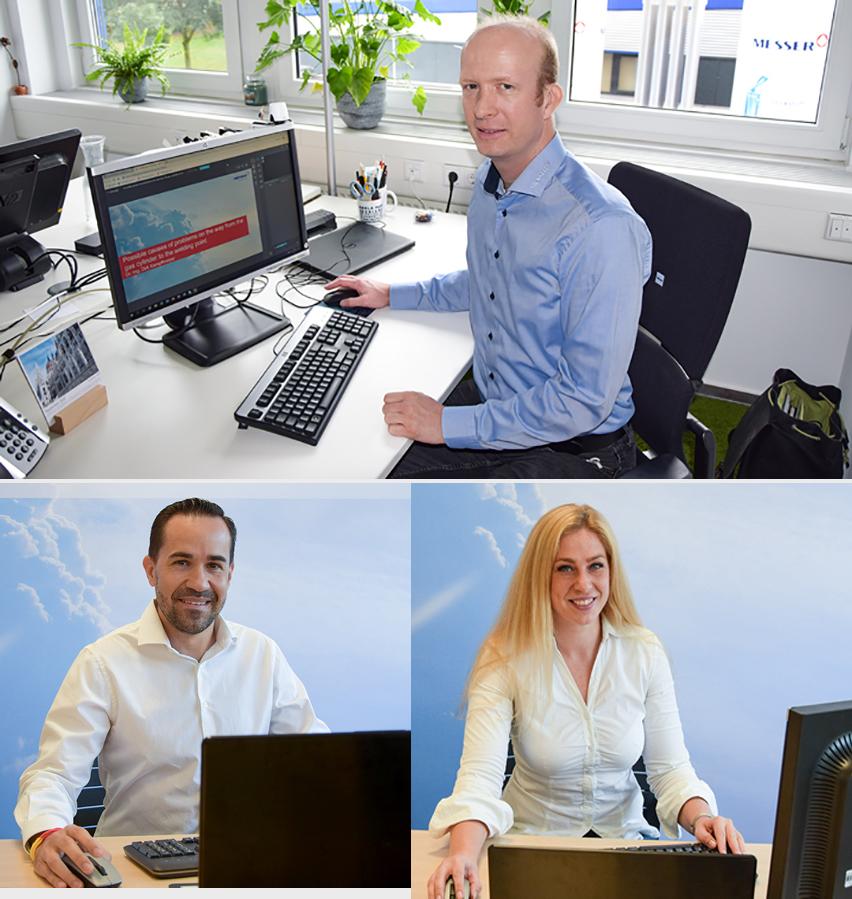
Spain: Virtual guidance and Messer Award for students
In May 2020, we organized a virtual visit of our production site in El Morell, Spain, for more than 60 chemical engineering students and teachers at Rovira i Virgili University (URV) in Tarragona. Videos presented the separate process steps and equipment of the plant and audiovisual materials were used to provide commentary. Due to the existing restrictions, we also presented the Messer Award to URV students in a virtual ceremony. The undergraduate students defended their projects online before a jury comprised of professors and Messer employees. Representatives of the university, the Chemical Business Association of Tarragona, and Messer participated in another virtual event during which the prize for the best project was awarded.
Hungary: Experience instruction for the blind
As part of an initiative launched by the “Institute for the Blinds,” our Messer team in Hungary participated in an interesting project: With the support of two physics teachers, interactive classes were provided for blind people. Experiments and demonstrations involving the properties of our “Gases for Life” were presented in a way that they could be felt or heard. The sense of taste was also stimulated – by ice cream previously frozen with liquid nitrogen. Some of our employees volunteered to assist in the project.
Serbia: Making learning fun
Messer in Serbia supported the “Battle for knowledge” program, with the goal of supporting developmentally disabled children. This took place at special education schools with, among other things, “Bee Bots,” which look something like bees. These small, easy to use “learning robots” were procured to make the transmittal of instructional matter more fun. They help to promote equality of opportunity for these children in national and European school competitions as well as in society in general.
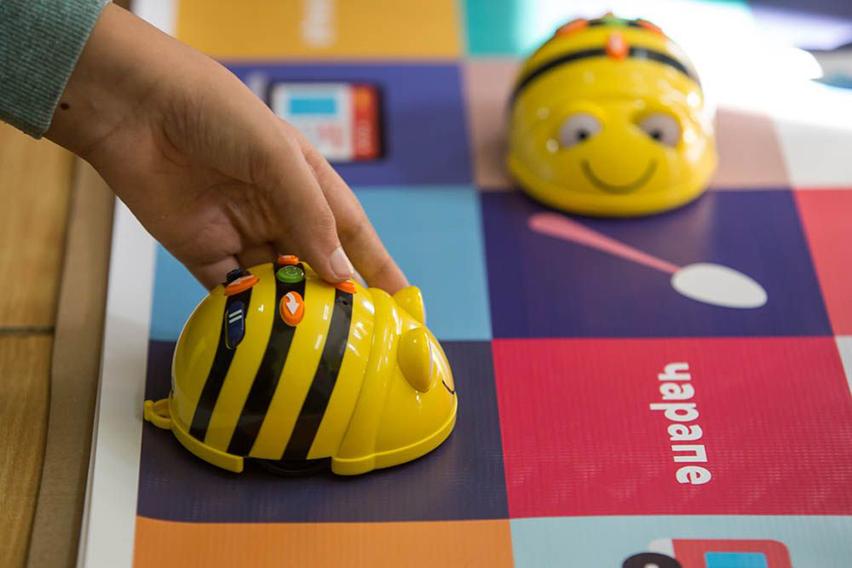
Dr. Hans Messer Foundation
The purpose of any foundation should be to support projects and ideas that are given no or insufficient consideration within the framework of basic state provision. The Dr. Hans Messer Foundation also pursues this idea by supporting and recognizing scientists who gain prominence through special or outstanding achievements, by awarding scholarships and prizes, and by supporting scientific and educational establishments.
The Dr. Hans Messer Foundation’s activities encompass support and funding as well as operational aspects. It operates as a charitable foundation with legal capacity established under private law, making a varied and ongoing contribution to the promotion of science and research as well as school and vocational education. This work is becoming increasingly important in this day and age as the state is often unable to provide sufficient funding. In this way, thirst for education, innovation, scientific curiosity and pioneering spirit are rewarded.
The purpose of the Dr. Hans Messer Foundation is to be a driving force for education and science. According to its charter, the Dr. Hans Messer Foundation supports science and research, public and vocational education, and the provision of help to students. In all, more than 20 million euros have been spent for foundation purposes to date.
The Board of the Dr. Hans Messer Foundation determines the focus of the foundation’s work with the aim of defining a specific direction. The focal areas can change, however, or apply for only a certain period of time. The foundation currently focuses on science and research grants primarily in STEM fields, i.e. science, technology, engineering and mathematics. The field of medicine also receives regular funding. The Dr. Hans Messer Foundation awards a number of different scholarships to students, undergraduates, doctoral candidates and professionals. In addition, special scholarship programs are also set up.
Foundation prizes of the Dr. Hans Messer Foundation
To provide specifically targeted support to young scientists and their research, the Dr. Hans Messer Foundation continuously awards foundation prizes. The Foundation Prize 2021, for example, was given to the Technical University of Darmstadt for the promotion of outstanding achievements in the areas of natural science and engineering as well as economics, social sciences and the humanities. At 50,000 euros, it carries the highest endowment of any award for young scientists at the Technical University of Darmstadt. The prize is intended to fund material and personnel resources for research projects.
Recipients of the award were Dr. Meike Saul (Technical University of Darmstadt, Faculty of Biology) for her research work "Exosomal microRNA-574-5p: Small molecule with a large impact on inflammations and cancers" and Prof. Dr. Vera Krewald (Technical University of Darmstadt, Faculty of Chemistry) for her research work "Light-driven nitrogen fission: At the right wavelength and with the right impetus".
A cross-disciplinary awards committee with representation from the foundation and the university board determines the prize recipients.
Messer Innovation Forum
The Messer Innovation Forum’s webinars have established it as a platform for application engineering-related advanced training. A total of 159 webinars were conducted in 2021, reaching 870 external and 940 internal participants. As in the previous year, topics covered the full range of application areas, including food, metallurgy, welding and cutting, industry and chemistry/environment. The platform was used by the national subsidiaries and also by ASCO.

Bosnia-Herzegovina : “Focus on Cylinder Gases” training completed
In February 2019, various departments of Messer in Bosnia-Herzegovina completed a training course developed by the Academy Messer Group. “Focus on Cylinder Gases” concentrated on the strategic improvement of marketing activities. The training course, which started in September 2018, consisted of six two-day workshops. On the first day, practical exercises were used to strengthen sales skills. The second day consisted of training on various subjects such as welding and cutting, medicine, special gases or the packaging of food under protective gases.
Application Engineering online platform – Messer Innovation Forum
February 2019 marked the launch of Application Engineering’s new online continuing education platform “Messer Innovation Forum”. It uses webinars to pass along application knowledge and is oriented toward customers, salespeople, sales managers, applications specialists and technicians. One objective is to transport the know-how from the individual fields to the national subsidiaries. The scope of training covers a broad spectrum and is regularly repeated – also according to individual need.
This makes it possible to communicate specialized information quickly and cost-effectively, for example, in preparation for an upcoming customer visit. Additional benefits include reduced travel times along with fast, straightforward training for new employees. During the first two months of the program, the first webinars reached more than 250 participants.
Hungary: Messer innovation forums: Dimensions of metalworking and new trends in efficient, eco-friendly water treatment
In 2019 in Hungary, professional forums on wastewater treatment as well as gas metal arc welding, laser technology and 3D metal printing were held under the new name “Get into Gases – Messer Innovation Forum.” The purpose of these innovation forums is to present the most advanced and exciting innovation projects and trends from research and technology in a special gases application field. The two high-caliber events drew more than 260 highly qualified specialists together and ushered in a number of business opportunities. Even the professional media rated the innovation forum on welding as the foremost professional event in this field.
Hungary: Welding courses also for young professionals
In 2019, Messer in Hungary gaves training courses in welding technology for metal and steel construction companies as well as for technical schools. Among other things, these courses aim to offer the future generation of welding specialists practical training that addresses the needs of the industry. Participants also get the chance to learn about the benefits of using our three-component mixtures.
Continuing education and support
The worldwide Covid-19 pandemic has changed how people think about continuing education. At Messer, we used the extensive offering of virtual webinars to provide continuing and advanced education for employees in 2021. Participation in paid seminars averaged 15 hours per person in the year under review. On average, a total of 114.5 euros per person were spent on advanced training. In tracking the cost and hours of continuing education, Messer Americas took into account only training courses involving Compliance.
Webinars for sales teams
Messer is characterized by the fact that we adapt our gas solutions individually to our customers’ business models. To do so, our sales teams must have extensive expertise across the broad spectrum of gas applications. And that is why the online tool “EduDip” was used for continuing education once again in 2021, along with the new webinar series, to keep up to date even under “pandemic conditions.”
France: Part-time university studies
In 2021, Messer in France signed employment agreements with 13 part-time university students. This part-time training and continuing education arrangement is offered in all work areas – in Production, Human Resources and Accounting, as well as in Sales and Marketing. Messer in France has a long tradition of supporting part-time university study. It enables us to attract new talent, pass along our expertise, and benefit from fresh ideas.
USA: Cultivating future managers
Messer Americas recruited new collegiate graduates from ten universities in the USA. Within the framework of its two-year Graduate Development Program, these new hires become familiar with the different areas of the company. This includes two assignments within their respective specialty area and a third assignment to another business unit. As part of our D&I initiatives, we have increased the percentage of women recruited and ensured the ten universities selected are representative of different ethnicities.
Spain: Messer Award for technical students
In June 2021, the Messer Award was presented in Spain for the ninth time. It was given to chemical engineering and food biotechnology students at Rovira i Virgili University in Tarragona (URV). The chemical engineering students who received the award submitted plans for an acetone production plant including sustainability study.the students studying food biotechnology designed a production facility for kefir-based ice cream.
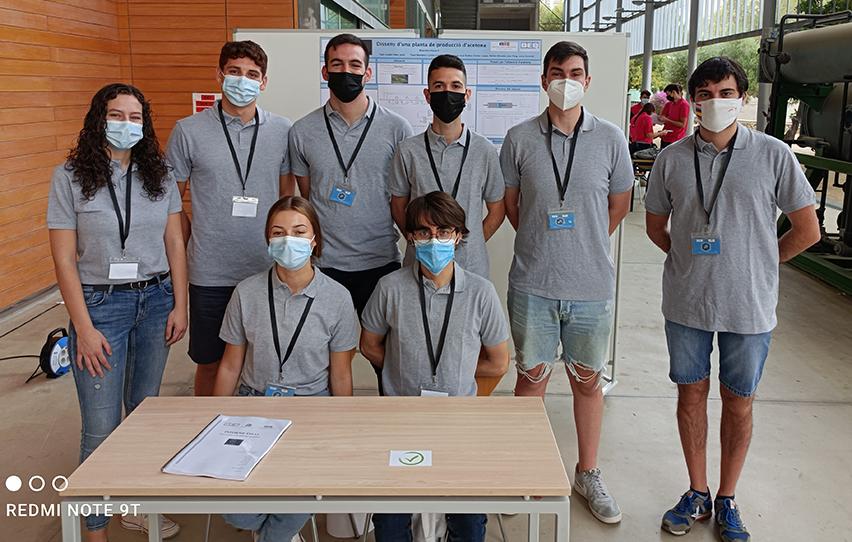
Spain: Messer Award for MBA students
Messer presented an award to the students who completed their Master in Business Administration and Management (MBA) at Rovira i Virgili University with the best academic performance of 2021. Presented for the ninth time, the individual award went to Xavier Carbonell Maté, Regional Mechanical Engineering Manager EU at Lear Corporation. The best project team was also recognized.
Spain: Grant for radiosurgery
Messer in Spain awarded a grant for clinical research in radiosurgery to Dr. Silvia Tuna, radiation oncology specialist. It enables her to participate in a clinical research project in the field of cerebral and extracerebral radiosurgery in the Department of Oncology and Radiotherapy at the Vithas Consuelo Hospital in Valencia. Messer has been working together with the Vithas Foundation for 12 years. Vithas is one of the largest private hospitals in Spain.
Colombia: Laptops for remote learning
Messer in Colombia donated laptops to six healthcare workers from its own organization, whose families previously had no computers of their own. The devices were provided to children who received online classroom instruction due to the pandemic.

Hungary: Support for three relief efforts
Messer in Hungary supported three relief efforts: One donation went to an organization that is helping a child who suffers from leukemia and whose family needs financial support. A local animal rescue station and an institution that promotes better education for children from the poorer regions of the country were also supported.
Spain: Computers donated
Messer donated eleven computers to the Red Cross of Tarragona. They will be distributed to the regional offices of the aid organization in support of training courses. This initiative seeks to narrow the digital gap for socially disadvantaged communities. Secondhand computers were also provided to the neighborhood association of the La Floresta district. It organizes refresher courses and computer training especially for middle-aged people to help them search for employment.
UN Goal 5 - Gender Equality
Diversity and equality
Diversity and equal opportunity are anchored in our mission statement. Our forward-looking and sustainable Human Resources policies ensure a level playing field for professional success, respect cultural differences, and promote interaction among each another. For Messer, diversity is essential to innovation and sustainable business success, and mutual trust and respect form the basis of our corporate culture.
Diversity management
The goal of our diversity management program is to create a respectful work environment that is free of prejudice, regardless of the employees’ gender, nationality, ethnic or social origin, religion, ideology, disability, age, sexual orientation or gender identity. Since 2019, Messer Group has been a recipient of the Total E-Quality Award for equal opportunity in personnel and organizational policy with the special citation for diversity. Valid for three years, the award is supported and recommended by the German Federal Ministry for Family Affairs, Senior Citizens, Women and Youth as well as by the German Federal Ministry of Education and Research.
In addition, we are signatories to the “Diversity Charter,” an initiative that promotes diversity in companies and institutions. Our interdisciplinary team and contact persons responsible for diversity management in our international subsidiaries help us deliver on our diversity commitment throughout the organization.

In 2021, the Americas nominated a Diversity and Inclusion Officer, as well as D&I Ambassadors for each of the countries in the Americas region. The D&I Officer together with the D&I Ambassadors help advance diversity and inclusion efforts through dedicated initiatives and concrete actions. To progress the Americas D&I agenda, a formal program was established focusing on three key pillars: education, engagement and process.
Diversity Report
In May 2021, Messer published its second annual Diversity Report. A wide range of data are collected anonymously, including the workforce’s key indicators relative to gender along with length of company service, age distribution and nationality, and the diversity management actions are also reflected. This monitoring will help us achieve the established objectives and metrics.
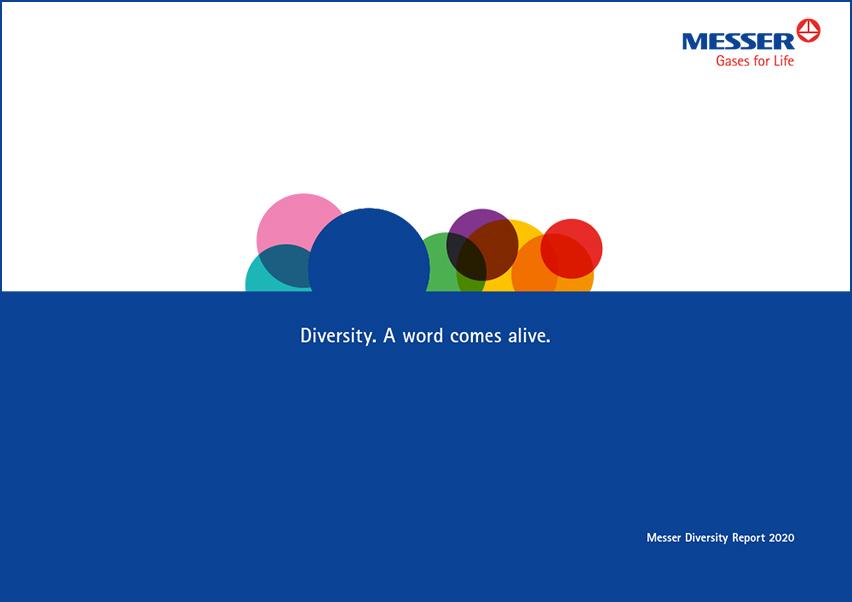
Share of women and equality
As of December 31, 2021, Messer employed 10,209 people; on December 31, 2020, that figure was 10,764. The share of women was 28.1 percent, which was slightly below the 28.4 percent share of the previous year. The share of women in first and second level management positions was 25.1 percent versus 24.1 percent in 2020. The share of women in management positions at Messer in the Americas (35.8 percent) was significantly higher than in Western Europe (23.8 percent) or Central and Eastern Europe and Asia (21.4 percent collectively).
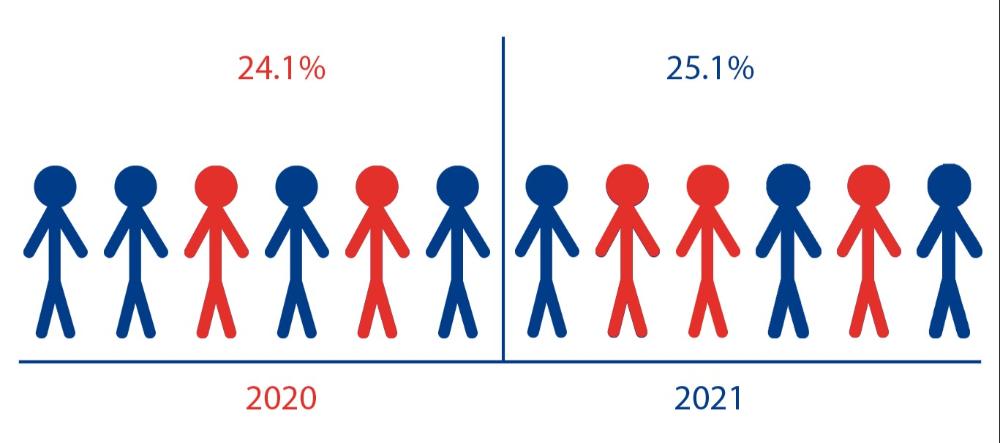
The share of women in the first and second levels of management will be raised over the long term, with the goal of establishing mixed-gender management teams with a 30-percent share of women by 2030.
Our salaries are based on function, market, performance, education, experience and number of years of service, as well as any collective wage agreements or comparable collective wage agreements and adjustments for inflation. It goes without saying that our remuneration policy makes no distinction among genders.
Messer Group earns the Total E-Quality award
In 2019, the Messer Group was recognized for equal opportunity in personnel and organization policy for the first time by the non-profit association Total E-Quality Deutschland e.V. The Total E-Quality award is supported and recommended by the German Federal Ministry for Family Affairs, Senior Citizens, Women and Youth as well as by the German Federal Ministry
of Education and Research. Among the 13 new award winners, only four earned the supplementary award for “Diversity” – and one of them is the Messer Group. It is valid for three years.
Made in Germany – Made by Diversity
In 2019, the Messer Group participated in the “Made in Germany – Made by Diversity” initiative, speaking out along with some 50 other German family-run businesses in favor of an open-minded attitude toward the outside world and against xenophobia.
Messer Group signs Diversity Charter
In November 2019, Stefan Messer signed the Diversity Charter, sending a signal of commitment to diversity and respect at Messer. The Diversity Charter is an initiative that promotes diversity in companies and institutions under the patronage of German Chancellor Dr. Angela Merkel. In signing the charter, the Messer Group undertakes to create a respectful work environment that is free of prejudice, regardless of gender, nationality, ethnic origin, religion or ideology, disability, age or sexual orientation and identity of the employee. The signing falls within the scope of measures developed and implemented by the Diversity team in the context of the Diversity Management program.
Unconscious bias training
In 2021, Messer established an international training program against unconscious biases. Unconscious biases and prejudices are considered to be among the greatest barriers for diversity strategies. They can affect hiring, for example, when recruiters unconsciously give preferential treatment to people of their own gender, skin color, orientation or cultural affiliation. Messer’s international management team received training in the form of a comprehensive and mandatory e-learning course. In a first stage, the training course was then expanded to the international HR network team and the workforce in Germany. It uses examples to illustrate the problems that “fast thinking” can create – both in private life and at work. Building on that foundation, managers were then trained in techniques designed to help them take more conscious decisions, and therefore better ones.
A leading provider of unconscious bias training was selected by the team in the Americas to facilitate its training program, which is formally being rolled out to the entire organization.
The unconscious bias e-learning courses will continue its expansion in 2022.
Supervisory Board of Messer SE & Co. KGaA reflects gender parity
Messer appointed Sabine Scheunert to its Supervisory Board, which now comprises four women and four men. Ms. Scheunert is the Vice President of Digital & IT Sales/Marketing for Mercedes-Benz Cars at Mercedes-Benz AG. In her executive board function at Mercedes, Ms. Scheunert is responsible for all IT-based marketing, sales and after-sales activities as well as the complete digital customer experience of the brand.
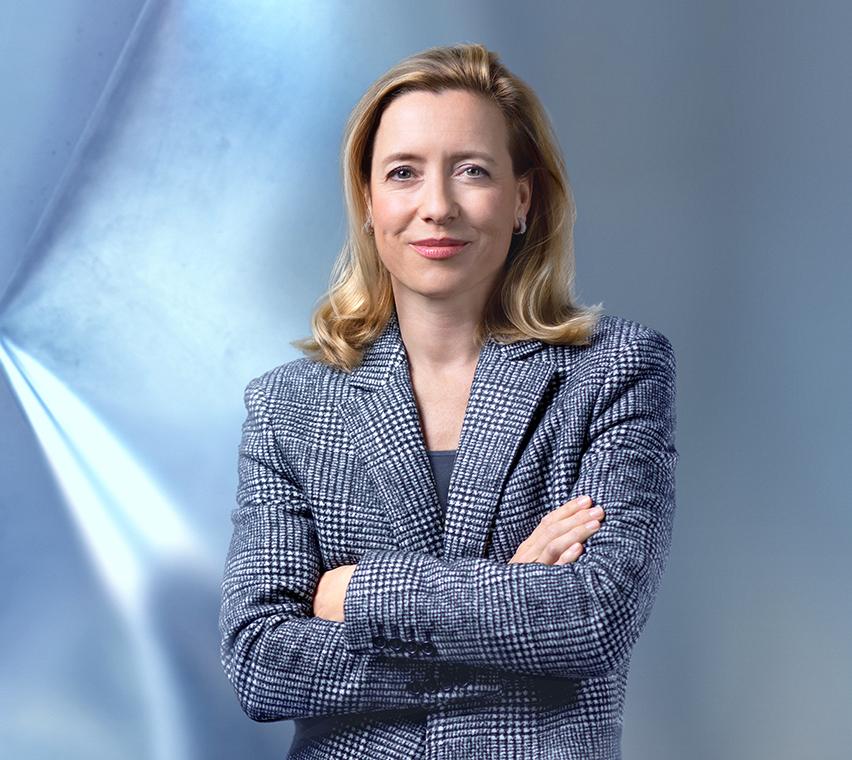
Colombia / Chile: International Women’s Day activities
In March 2021, Messer’s subsidiaries in Colombia and Chile organized many activities to honor the accomplishments of women and to raise awareness for equal rights. These activities were conducted in conjunction with International Women’s Day, which is celebrated on March 8. Webinars featured interviews with female employees in management positions, and a workshop focused on the importance of gender equality. Activities were rounded out with tips on how to promote human rights and diversity in our everyday lives along with recognition of important contributions made by women leaders.
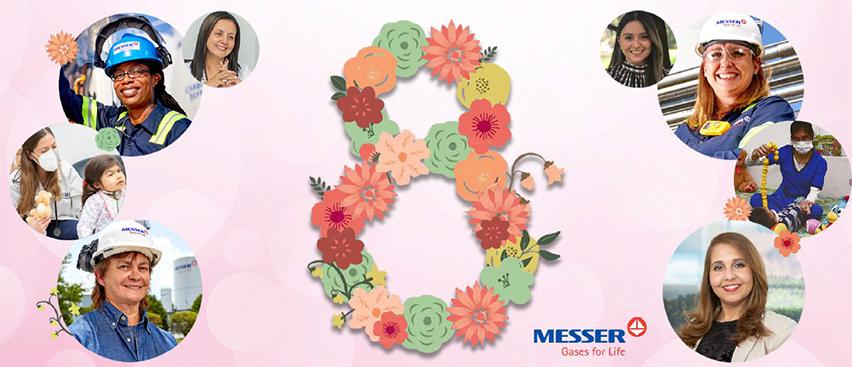
USA: Messer signs CEO Action for Diversity & Inclusion pledge
Messer America’s CEO, Jens Luehring, signed the CEO Action for Diversity & Inclusion pledge. The CEO Action for Diversity & Inclusion is an organization with over 2,000 CEO signatory companies that are devoted to driving measurable action and meaningful change in the workplace. Additionally, the company promotes celebrating diversity recognition events including, Pride Month, Martin Luther King Jr. Day, Hispanic Heritage Month, Veterans Day and Global Diversity Awareness Month to engage employees and promote inclusion.
UN Goal 8 - Decent Work and Economic Growth
Acquisition of parts of Linde’s and Praxair’s American business
Messer Group acquired the majority of Linde AG’s gases business in North America and certain Linde and Praxair business activities in South America effective March 1, 2019 in a joint venture – called Messer Industries GmbH – with CVC Capital Partners Fund VII (“CVC”). Messer Industries invested a total of around 3.6 billion US dollars (3.2 billion euros). Messer Group contributed the majority of its Western European companies to the joint venture. Over the course of the next few years, the joint venture will be fully integrated into the family-run Messer Group, thereby establishing a global gas group under the leadership of the Messer family. Messer Group’s regional operations are currently focused in Eastern Europe and Asia. Asia already represents the largest industrial gases market and is expected to have the highest growth rate in the medium term. Also with Messer Industries’ participation, in 2019 strategies were developed for the Americas and Western Europe, in order to sustain business success in the coming years. The common aim that they all share is to achieve safety, customer focus, profitable growth and fair payment for our products through a team culture focused on efficiency, success and motivation in combination with innovation and a highly satisfied workforce and clientele.
Germany : Cornerstone for new air separator
In June 2019, the cornerstone was laid for Messer’s third air separation unit in Germany. Together with the gas manufacturer basi Schoberl, Messer is investing some 32 million euros in the production of oxygen, nitrogen and argon. Construction on the grounds of SAINT-GOBAIN ISOVER G+H AG in Speyer is scheduled for completion in spring of 2020. Messer has already been supplying gases to the customer by trailer since May 2019. In the near future, the new on-site air separation unit will minimize those gas shipments and the accompanying carbon footprint.
Hungary: Investments reinforce market position
In the period from 2017 to 2019, Messer invested 37 million euros to build up its Hungarian market. With gas production units and plants at twelve major customers, Messer is the market leader in the on-site atmospheric gases business in Hungary. In 2019, Messer signed an agreement with MOL Petrochemicals, a leading petrochemical group, for the construction of a new onsite unit to supply nitrogen and instrument air for a new polyoil complex in Tiszaújváros in northern Hungary. When the unit goes into operation in 2021, it will be one of Messer’s largest on-site units in southeastern Europe. Messer also built two new nitrogen generators in Hungary – one in Dunavarsány and one in Hatvan – and a third one is currently under construction. In response to the growing demand, the construction of two additional CO2 plants has tripled the utilization capacity of the carbon dioxide field near Ölbő, Hungary, over the past two years.
Switzerland – Once again awarded the “Credit Rating Certificate”
In 2020, the credit agency Bisnode D&B Schweiz AG granted Messer in Switzerland a “Credit Rating Certificate” with “Risk Indicator 1” (which stands for minimum default risk) for the tenth consecutive time. Only two percent of all companies in Switzerland meet the requirements for that best category. The certificate sets Messer in Switzerland apart as a trustworthy, reliable, financially healthy and stable business partner. Bisnode D&B is a partner in the network of Dun & Bradstreet, the world’s largest service provider for business-to-business economic data.
China: Growth driver for the Messer Group
In 2019, Messer achieved another breakthrough in the electronics industry and put gas supply plants into operation in Sichuan at Truly and BOE for, among other things, high-purity nitrogen. BOE and Truly are leading companies in the electronics market in China. In addition, Messer China signed a supply contract for ultra-high-purity industrial gases with HKC Mianyang Photoelectric Technology Co., Ltd. HKC is a leading supplier of large-format LCD displays. In March, another CO2 recovery unit of Messer China began producing food-grade CO2. Located on the grounds of Yunnan Dawei Ammonia Producing Co., Ltd., it is Messer’s fourth CO2 unit in China and its second in Yunnan Province. Through purification and liquefaction, it converts the excess carbon dioxide generated by Dawei’s production process into quality products for use in food, pharmaceuticals, and industrial and agricultural applications
In September, Messer China laid the cornerstone for another air separation unit and a condenser in Hunan Province.
In October, a second air separation unit and a condenser were put into operation in the central Chinese city of Chongqing. The new capacity makes Messer the leading supplier of liquefied atmospheric gases in Chongqing and now also enables us to supply gas via pipeline to other industrial customers and chemical companies in the chemical park.
Vietnam: Significant growth in the steel and electronics sectors
In 2019, Messer put two new air separation units into operation to supply industrial gases to a new Hoa Phat steelworks in Dung Quất, Quảng Ngai Province. That makes Dung Quất one of our company’s largest production sites in the world. In Hai Duong, Messer Vietnam put the fourth air separator into operation to supply the same customer. In the electronics segment, Messer has been supplying Seoul Semiconductors with oxygen from a generator since June 2019.
Thailand: Second anniversary
Since January 2020 the still-young Messer Thailand has been operating for two years. In 2019, a new head office opened in Bangkok and a bulk tank farm opened in Samut Prakan. The company expects to have its own production site within the next few years.
Americas: Messer engages in targeted business expansion of its new operations
In 2019, Messer Industries USA invested in the construction of a new CO2 plant in Keyes, California. The plant delivers 450 tons of carbon dioxide per day and supplies many companies in northern California and surrounding areas. Carbon dioxide is primarily used in the food and beverage and electronics industries. Messer currently operates two CO2 plants and two air separation units in California.
Messer Industries USA put a new air separation unit (ASU) into operation in Adel, Georgia, investing more than 40 million dollars in the highly efficient plant. It supplies gases to companies across in the southeastern U.S., strengthening Messer’s presence in that growing region. Our customers there serve the healthcare sector, produce food and beverages, manufacture metal and glass, and operate independent welding and gas centers.
Messer Industries USA is also investing more than 34 million euros (38 million dollars) in the construction of a new air separation unit in Indianapolis, Indiana. Scheduled for completion in early 2021, the facility will produce the atmospheric gases oxygen, nitrogen and argon in technical and medical grades. Future customers will come from the healthcare sector as well as from the chemical, food and beverage, glass and metal processing industries.
Satisfaction of our employees
In 2021, the average length of service of our employees since joining Messer was 9.7 years versus 10.2 years in 2020. Total staff turnover fell slightly from 13.2 percent in 2020 to 10.1 percent in 2021.
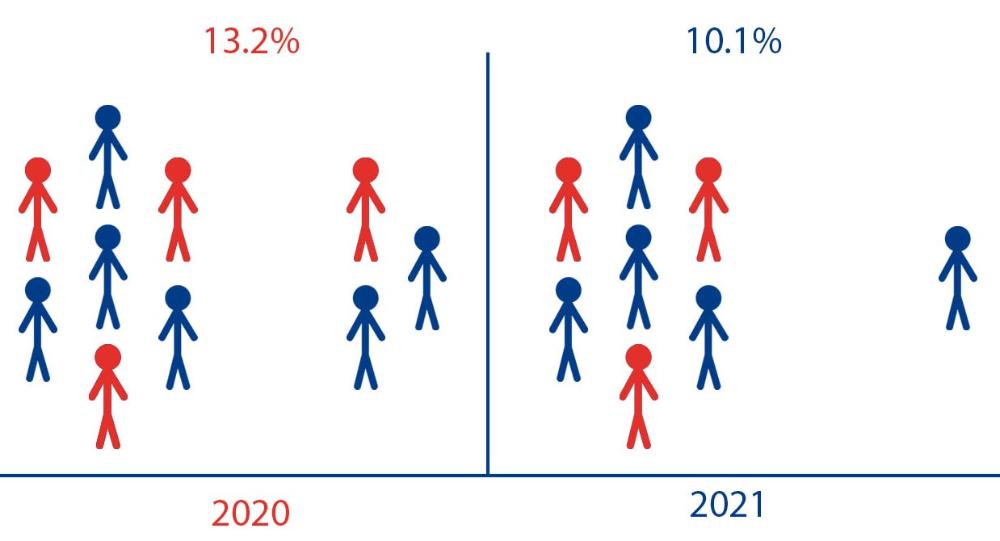
The employee survey in Europe in 2020 identified three areas in which local organizations should place greater focus: Digitalization, communication and employee development. To improve internal communication, Messer launched an international app in 2021: the “Beekeeper” app facilitates worldwide exchange between organizations and their teams: there are different streams for information, messages and files. Moreover, Beekeeper makes it possible to conduct anonymous and non-anonymous surveys, send out newsletters, and disseminate information campaigns. The Corporate Communications area was redesigned at the same time. Now it focuses more on content and in-house communications and is no longer organized according to communication channels. A “digital newsroom” reinforces cooperation with the communications officers in all companies.
Since the end of 2019, Messer Americas has been conducting surveys annually, in order to determine the needs and requirements of the workforce and to establish appropriate employee development programs. Their survey results from 2021 demonstrated indicators of employee engagement in the areas of company pride, safety and culture. The survey also provided employees an opportunity to express why diversity and inclusion (D&I) are important and what makes them most proud to work at Messer.
Satisfaction surveys
Messer conducts employee surveys in Europe and the Americas.
In Europe, 1,421 people participated in the survey; that represents 46 percent of the European workforce. The results point to an emphasis on work safety as well as a strong, committed corporate culture: 92 percent of respondents, for example, agreed that safety is the highest priority at Messer; 92 percent also indicated that they were satisfied with how Messer has handled the Covid-19 pandemic. 94 percent of participants said they were proud to work for Messer; and 89 percent agreed that they have a positive feeling about the direction in which Messer is headed. When asked to name three areas on which our local management is focusing greater attention, respondents identified employee development, communication and digitalization.
Since the end of 2019, Messer Americas has been conducting surveys at six-month intervals, in order to determine the needs and requirements of the workforce and to establish appropriate employee development programs. In the most recent survey at the end of 2020, 54 percent of employees in the Americas participated. As in Europe, the employees gave particularly positive assessments of the safety culture and pandemic management and also strongly agreed with the strategic direction and mission of the company.
New Purchasing Policy for Electricity
In the context of our Compliance Management System (CMS), a new Purchasing Policy for Electricity was adopted in 2021. It is designed to help minimize electricity costs for each air separation unit, negotiate the best possible contract terms, and make use of favorable market conditions when buying electricity. The policy applies to all consolidated Messer companies in Europe.
Change in the legal form of Messer
In 2021, Messer Group GmbH was transformed into a limited joint-stock partnership (KGaA) and has since traded under the name of Messer SE & Co. KGaA. The KGaA legal form allows us to ensure that Messer is geared to the future as a global group with enhanced operational and organizational scope. It ensures continued control and influence on the part of the shareholder family. The new legal form will allow the family’s fiscal and financial objectives to be achieved with even greater flexibility in future.
Over the next few years, the plan is to fully integrate Messer Industries GmbH, the joint venture created in 2019, into the family-owned company Messer SE & Co. KGaA. The development and implementation of a global strategy will then be possible for the merged industrial gases group. Furthermore, this will also facilitate the leveraging of some existing minor efficiency reserves.
The economic activity of Messer SE & Co. KGaA is mainly focused on Eastern Europe and Asia. The Asia region represents the world’s largest industrial gases market with the highest growth rates. Messer Industries has regional and product-specific business operations in North and South America as well as Western Europe. What unites them all is the focus on safety, customer orientation and profitable growth. We aim to achieve appropriate payment for our products through a team culture geared towards efficiency, success and motivation, a high level of employee and customer satisfaction as well as innovation.
China: New air separation unit for biotech customer in Chongqing
At the beginning of 2021, Messer concluded a gas supply contract with Calysseo (Chongqing) Co., Ltd., a joint venture between Adisseo, a global leader in the manufacture of feed additives for animal nutrition, and Calysta, a producer of alternative proteins. According to the provisions of the contract, Messer will build a new air separation unit for Calysseo as the world’s first large-scale FeedKind protein production facility, which will produce 20,000 metric tons of protein a year. The new air separation unit is due to go into operation at the beginning of 2023. Until then, Messer will, for the most part, supply oxygen and nitrogen to Calysseo by pipeline from an existing unit. This unit also has a liquid capacity – for the market in Chongqing – which will allow Messer to further strengthen its leading position.
China: Messer supports growth of lithium-ion battery industry for new energies
In China, Messer put an on-site nitrogen generator into operation at Hunan Yuneng New Energy Battery Materials Co., Ltd. (Yuneng) in Xiangtan, Hunan province. The remote-controlled on-site unit allows Messer to supply this major customer with nitrogen to support their long-term growth. Yuneng is China’s leading manufacturer of lithium iron phosphate (LFP), the cathode material for lithium-ion batteries. In mid-2021, Yuneng announced a five-fold increase of its capacities at the Xiangtan site and, at the same time, the construction of a new LFP plant in Anning, Yunnan province. At the moment, Messer is building another nitrogen generator there, which is scheduled to go into operation in the third quarter of 2022. Yuneng has been working with Messer since 2016. The new projects will further strengthen our strategic partnership.
Colombia: New nitrogen liquefier in Tocancipa
In Colombia, Messer is investing in a nitrogen liquefaction plant at the Tocancipa site, near the capital city of Bogotá, to expand its liquid capacities and meet the increasing demand for nitrogen in the region. The liquefier will supplement the existing air separation unit at the site.
Czech Republic: Market position in Central Europe further strengthened
Following the purchase of parts of Air Liquide Czech Republic, the acquired Air Liquide entity and Messer in the Czech Republic merged on January 1, 2021. An important component of the transaction was the takeover of a cylinder gas filling plant and an on-site oxygen production facility. Added to this are 60 bulk tanks installed on site for major customers as well as over 28,000 gas cylinders and 1,200 cylinder bundles acquired as part of the deal. In addition, Messer’s distribution network in the Czech Republic has grown by a further 38 Gas Centers.
Hungary: Nitrogen production facility for MOL
Messer built a facility for the production of nitrogen and compressed air for the petrochemical group MOL in Tiszaújváros. MOL is building a new polyol production plant in the eastern Hungarian town. Polyols are basic raw materials with a very wide range of uses in the chemical industry. Among other things, they are required for the production of polyurethane plastics. It is the biggest investment in MOL’s history; commissioning is planned for 2022. The new nitrogen and compressed air facility is the most efficient of its kind operated by Messer in Hungary. Messer already operates an air separation unit at the same site.
Serbia: New specialty gases plant in Pančevo’s industrial area
Messer commissioned a new specialty gases plant in Pančevo’s industrial area, further enhancing efficiency and capacity in this segment in Europe. The plant produces a wide range of high-purity gases, standard mixtures and individual gas mixtures. With high-quality specialty gases products, we meet the exacting requirements of our customers and make our contribution towards a greener living environment. The classic applications for high-purity gases and their mixtures include their use as test gases in research and development, in medicine and in measurement technology, for example for air purity. The new specialty gases plant directly adjoins the helium filling plant operated by Messer in Pančevo since 2011. This eliminates the need for the previous transportation routes to the former specialty gases site.
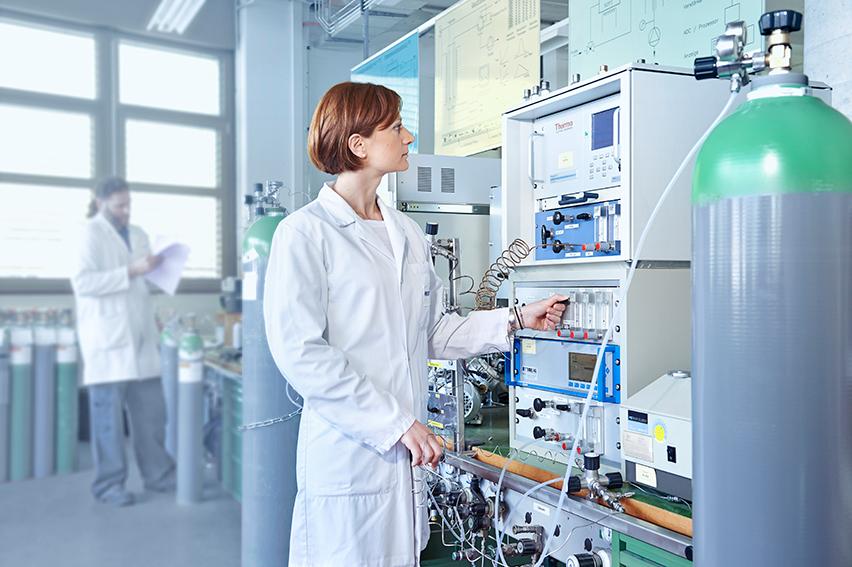
Slovenia: Automated filling in Črnuče
In April 2021, Messer commissioned a new filling plant in Črnuče, near the capital Ljubljana. It is equipped with state-of-the-art 300-bar filling technology which facilitates automatic control and monitoring of the filling process. The E-ccts customer cylinder tracking system is available for post-delivery tracking. It allows customers to follow cylinder movements in their own company and make a contribution to the sustainable circulation of “returnable cylinders”.
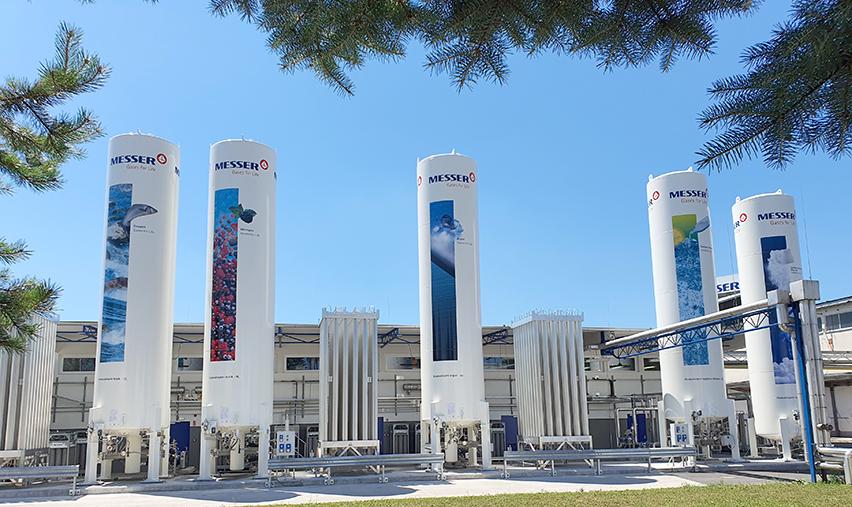
Switzerland: New filling and quality control facility
Existing premises at our Lenzburg site were completely renovated and repurposed for filling and quality control of specialty gases. For specialty gases filling, the facility now houses three universal filling stations, a bundle filling station, a filling stand for reactive and toxic gases as well as a ppb filling station. In addition, there is a separate weighing room. The quality control laboratory was also converted and re-equipped to meet current requirements. A further universal filling station is planned for expanded production in future.
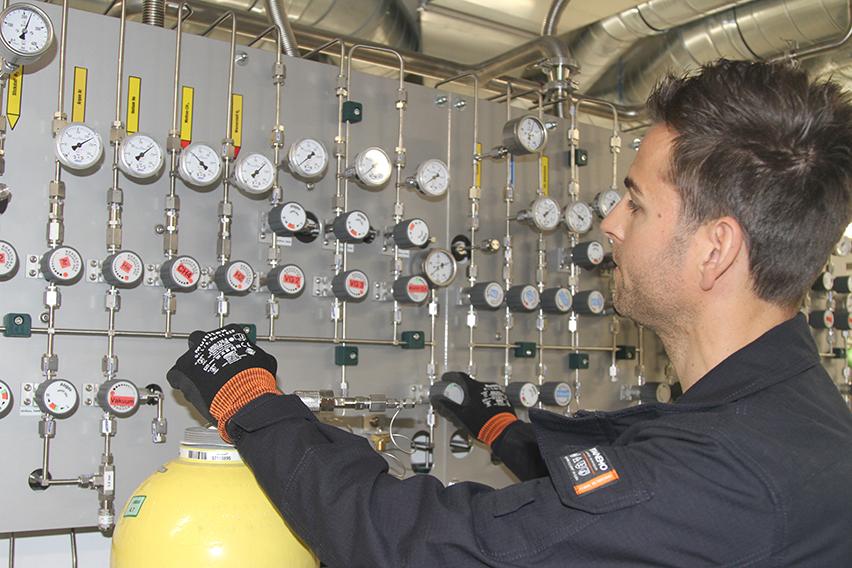
USA: New air separation unit strengthens market position in the Midwest
Messer and North Star BlueScope Steel (NSBS) agreed an increase in the supply capacities of gaseous oxygen in Delta, Ohio. NSBS is a leading manufacturer of hot-rolled sheet steel for the automotive, construction, energy and manufacturing sectors. Messer is investing in the construction of a new air separation unit (ASU) to increase the oxygen supply to 700 metric tons a day. This investment underlines our commitment in terms of expanding our on-site business in the U.S. while at the same time conducting a strategic expansion of our US bulk business. Apart from supplying NSBS, Messer will use the new ASU to expand its own liquid capacities in Delta and thereby increase growth and supply reliability for customers in the expanding market of the Midwest.
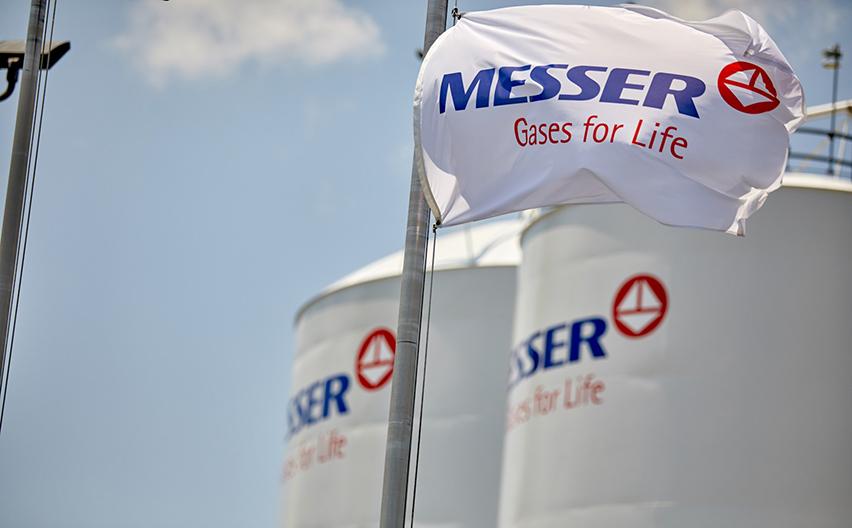
Vietnam: New air separation units for an expansion of Hoa Phat Dung Quat
Messer and its strategic long-term partner in Vietnam, the Hoa Phat Group, signed a new pipeline contract for the supply of oxygen, nitrogen and argon for an expansion of the Dung Quat steel complex. Hoa Phat’s new investment is aimed at significantly reducing Vietnam’s import of flat steel products and supporting the development of the local automotive and engineering industries. In addition to its three existing production facilities, Messer is investing in two new air separation units to supply Hoa Phat with sufficient gas volumes. Moreover, a new rare gas production unit is planned for the production of krypton, neon and xenon.
Switzerland: “Credit Rating Certificate” from Bisnode D&B Schweiz AG
In 2021, the credit agency Bisnode D&B Schweiz AG awarded a “Credit Rating Certificate” with “Risk Indicator 1” (which stands for minimum default risk) to Messer in Switzerland for the eleventh time in succession. Only two percent of all companies in Switzerland satisfy the conditions for this top rating. The certificate distinguishes Messer in Switzerland as a trustworthy, reliable, financially healthy and stable business partner.
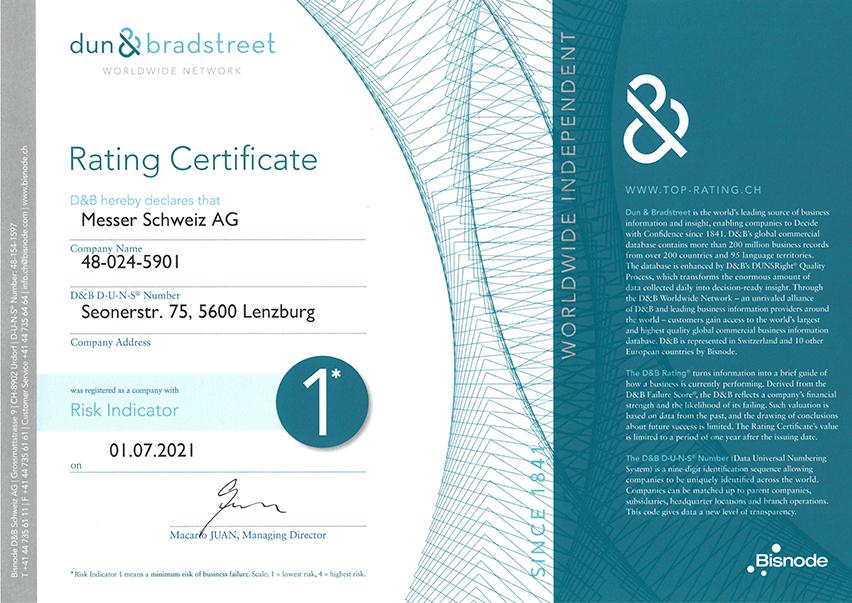
Brazil: Great Place to Work
For the fourth year in a row, Messer Brazil earned recognition from Great Place to Work! This award was based on the evaluation of Messer Brazil’s overall work environment, including respect for all in the workplace, pride, impartiality and business safety practices.
USA: Expanded hydrogen supply for car manufacturing plant
At a car manufacturing plant in Greer, South Carolina, Messer installed a redundant hydrogen supply system with high-capacity pumps and a 90,000-liter liquefied hydrogen tank. Messer has already been developing, installing, operating and maintaining the hydrogen supply and refueling infrastructure for the manufacturing plant since 2010. It supplies more than 700 forklifts and material handling vehicles today – one of the largest fleets of this type in the USA.
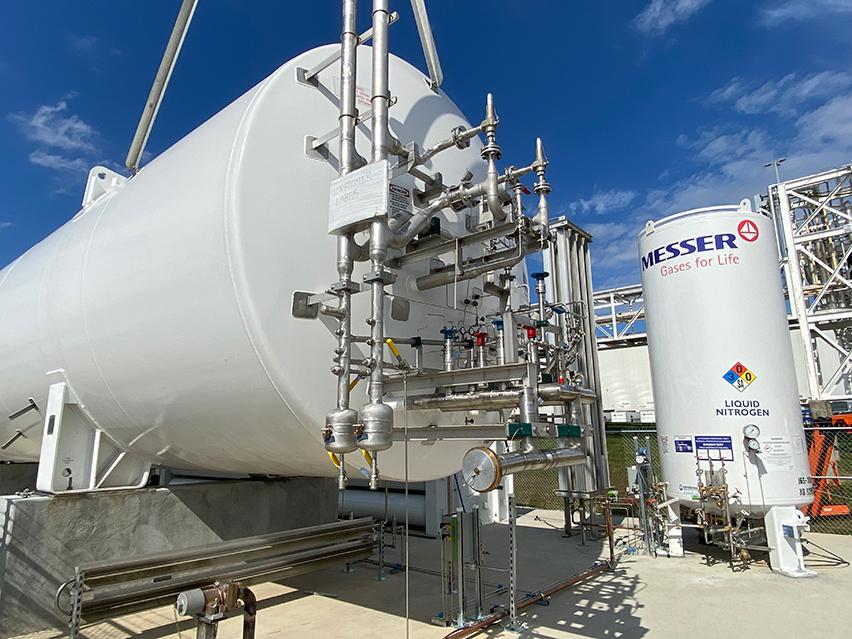
Canada: Remote maintenance for dry ice machine
To keep up with growing demand, a Canadian dry ice manufacturer raised its production capacity with the addition of a dry ice machine from ASCO. It can produce up to 400 kilograms of dry ice per hour in the form of slices or pellets. While setting up the machine and during the start-up phase, the Swiss ASCO team provided support to the Canadian customer via remote maintenance.
UN Goal 9 - Industry, Innovation and Infrastructure
France: Messer presents Silensnow technology at Solutrans
Messer presented its new Silensnow technology at Solutrans in Lyon, France, on November 19 - 23, 2019. Together with its partner Frappa, Messer developed the new cryogenic Silensnow technology for the temperature-controlled transport and logistics sector. This patented process for vans uses dry ice snow – carbon dioxide in solid form at -78.5 degrees Celsius – as its source of cooling. The cooling capacity of the dry ice is achieved through an indirect cooling system. This process meets the environmental and regulatory requirements of transport companies. Moreover, Messer has developed its own service station, which makes it possible to fill the system with dry ice safely and rapidly. As a byproduct of the chemical industry, the CO2 from Messer is collected and cleaned, liquefied and appropriately certified. It is used in a variety of applications. With Silensnow, it is used as a source of cooling when transporting fresh and frozen products to urban areas.
Efficiency increase through digital improvements
Messer Group and Messer Industries Western Europe are pursuing the goal of a strategically and technically reoriented IT infrastructure with modern, globally established standards. A standardized and flexibly scalable IT structure will create the basic conditions for improved business processes, for greater efficiency, flexibility and agility. Online collaboration and protection against cybercrime will also be reinforced.
Moreover, Messer continuously invests in a visible, modern internet presence that offers visitors satisfactory information and an easy means of contact. User-friendly e-services, online shops and search engine-optimized content will help customers find the desired search results and thereby make their purchase decision. In operation since October 2020 under the banner “Perfect Match,” the expanded digital platform now includes local e-services and online shops for hardware products such as pressure regulators and cylinder valves. Warehouse inventories and personalized sale prices can be displayed here.
Employees in the USA and Canada have access to a new SharePoint-based intranet for greater productivity. The new communication platform is compatible with mobile devices.

Among other things, it offers a search function, links to support tools and process support tools, and quick links to frequently visited resources and websites. The new SharePoint-based intranet solution will also be available in South America, thereby increasing networking opportunities for employees of our subsidiaries in both North and South America.
Since 2020, ASCO Carbon Dioxide has been offering digital add-on products to its customers in the dry ice production segment: The “i-Series Product Line” develops the potentials and benefits of networking and IIoT (Industrial Internet of Things) for their dry ice production units. Based on sensor components and state-of-the-art communication technology, ASCO offers services in the area of remote access, remote data and remote management services to interested companies. With this development – just like with the market launch of the new portable CO₂ safety detectors – ASCO is addressing specific customer requests.
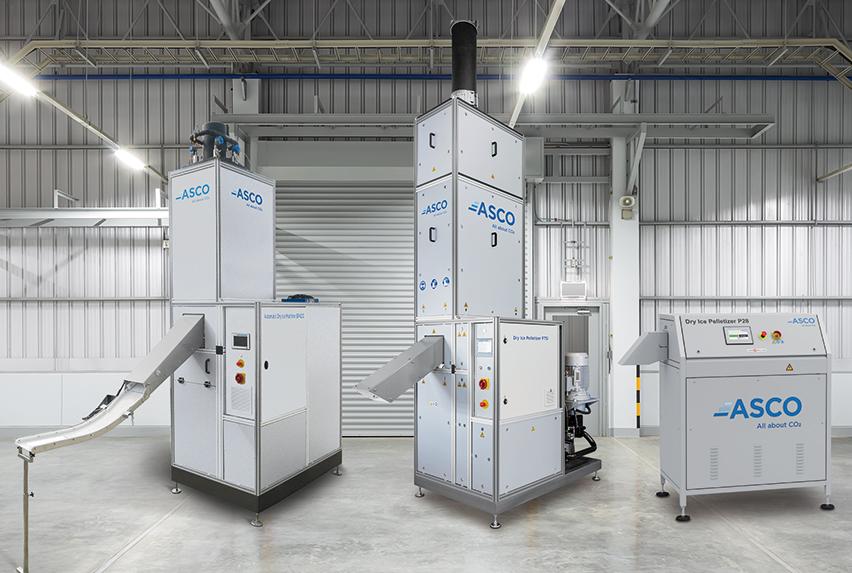
New CRM for long-term customer retention
Messer has decided to introduce a new unified Customer Relation Management (CRM) system which ensures better efficiency and service quality in the area of sales while at the same time improving process organization. Once it has been rolled out, the new CRM system will support the day-to-day business processes of almost 1,000 Messer employees in Europe in 15 languages. It will also further increase our productivity and efficiency for our customers, enabling us to retain them in the long term.
Added value enhanced through digitalization
Messer uses digital applications to optimize business and production processes as well as internal and external communication. As part of the changes to our IT infrastructure, we have decided to use globally established standards for all our national subsidiaries in order to allow us to operate our central IT systems and applications and ensure even better protection of the information they provide. We support our production, bulk and cylinder gas management – from filling to taking back the empty cylinders from customers – with a digital cylinder tracking system. Bulk management is supported, among other things, with a tool for digital on-site processing of liquid gas transport orders. We are rolling out our bulk tank telemetry system to all tank facilities in Europe to improve trip planning, protect the environment and reduce costs.
Advanced Process Control and automatic filling of our bulk fleet
Environmental protection and cost reduction are also the aims of our Advanced Process Control system, which helps reduce the consumption of electrical energy in the operation of our air separation units through digital process optimization. Furthermore, we are introducing standardized automatic filling systems at all our European sites. This will make it possible to fill our bulk vehicles around the clock without the support of local operators. The system facilitates checking of driver and vehicle licenses. The driver is assigned a filling station, the filling pump and quality analysis are activated, and the necessary transport and delivery documents printed out.
Remote Operation & Control Centers
Over the past three years, we have succeeded in introducing largely automated control processes for our facilities. In addition, we have begun to establish central Remote Operation Centers (ROC). In each case, the purpose of this is to group a number of our facilities into clusters that are monitored simultaneously by the operators of large central on-site facilities. There will no longer be shift and weekend working at the facilities being monitored. The first cluster was established in 2021 in Southeast Europe. At the moment, the plants in Škofja Loka (Slovenia), Bor (Serbia), Zenica (Bosnia and Herzegovina) and Resita (Romania) can be monitored from Smederevo (Serbia).
Worldwide container location tracking via GPS
In 2021, Messer in Europe equipped the first helium containers suitable for sea freight with a new telemetry system. It features GPS positioning, allowing the exact location of our containers on the high seas to be determined at any time. In addition, the fill levels and pressure of the tanks are transmitted via GSM (Global System for Mobile Communications). This can help improve supply chain efficiency and facilitate identification of technical problems.
China: Accelerating the digital transformation
In China Messer is actively using digitalization initiatives to improve internal cooperation, increase operating efficiency, support business growth and reduce costs. “Accelerating the digital transformation” is one of the core elements of Messer’s latest strategy update. One of the highlights of 2021 was the implementation of the Cylinder Business Management System (CBMS), which was introduced at three companies in the fourth quarter of 2020. The CBMS covers the entire cycle of the cylinder business process and also serves as an effective tool for managing cylinder stocks. In 2021, a further six companies successfully completed the introduction of the CBMS.
Columbia: Digital transformation of work processes
In Colombia, Messer implemented a tool that contributes to the digital transformation of work processes with our customers. The tool facilitates digital analyses, mobile applications and the integration of social media. It allows our sales team to interact even more effectively with existing and potential customers. Another benefit of the application is that it helps to identify potential new business, implement virtual sales strategies and improve how users experience our website.
Germany / Serbia: First start-up via Remote Desktop
The start-up of a facility was carried out via online communication for the first time. Following the construction of our new oxygen and nitrogen liquefier at Smederevo, Serbia, which was challenging due to the pandemic, engineering teams in Serbia and Germany were in direct contact via live transmissions for several weeks to prepare the start-up via Remote Desktop. The first deliveries of liquid nitrogen and oxygen from the new liquefier took place in mid-April 2021. The Smart Glasses used by Messer in Serbia and Corporate Engineering & Production have, for several months, been a helpful tool in other start-ups and maintenance work as well.
USA: Focus on digital transformation
At Messer Americas, digitalization is becoming an integral part of the business strategy and delivered through a wide portfolio of technology enabled transformation projects . The focus is on leveraging technology platforms to enhance our core gas application technologies, improve the customer experience and empower employees . Cloud computing services, mobile tools, data and analysis platforms, robotic process automation (RPA) and artificial intelligence (AI) are among the many examples where digital technologies offer Messer considerable benefits and transformation potential.
USA: Process optimiziation through digitalization
The "Supplier Information Management" (SIM) platform allows Messer Americas to speed up and simplify the search for suppliers or service providers. Using SIM, our employees have access to an online form that requests the country-specific requirements for each supplier. After completing the entry and submitting it, the request goes through the relevant approval processes via digital workflows and is supplemented with the requested supplier information. SIM has improved process consistency and simplified the process steps.
USA: Greater productivity through digitalizated supply chain management
As part of its digitalization initiative, Messer in the Americas introduced a digital delivery process for customers and a new app for its driving personnel. Installed on digital tablets, it facilitates the entry of trip-related information and electronic proof of delivery (e-POD). Control functions ensure that the right tank is filled, stipulated product specifications are fulfilled, and customer deliveries are completed. The app facilitates quicker trip planning as well as faster invoice processing for our customers.
Vietnam: Remote-controlled operating control system
With the increasing number of air separators and generators at different locations in Vietnam, Messer put a new remote-controlled system into operation at the beginning of 2021 via a highly secure Microsoft cloud server that would allow all production facilities to be put into safe mode if an unexpected external event occurred that could lead to a shortage of operators on site. After the difficult typhoon season at the end of 2020 and the COVID-19 pandemic with its associated lockdowns, as well as for the prevention of other unexpected situations, this system ensures that expert support can be accessed from other sites at any time. Our Messer production team underwent training in the operation of the system to get to know all the particularities of the individual production sites in Vietnam.
Vietnam: Entire maintenance process now digitalized
In 2021, Messer completed the implementation of a new Computerized Maintenance Management System at all its Vietnamese production sites and for all major customers. The entire maintenance planning process, plant monitoring and management, as well as calibration/inspection information and maintenance reports are now digitalized processes. This led to an immediate increase in productivity, cost savings, reduced use of paper and better service quality for Messer’s bulk customers.
Non-contact service via ShareView app
In view of contact restrictions during the coronavirus pandemic, the “Messer ShareView” e-service offered clear benefits. “Messer ShareView” enables our specialists to make virtual contact with customers virtually – to provide direct assistance and advice with technical problems in production operations, for example. The app can be installed on computers, tablets or smartphones and is easy to use. It is designed for the digital transmission of live streams, chats and documents.
Spain: Digital quality certificates
After batch analysis, Messer in Spain issues the appropriate quality certificate for the food-grade and specialty gases it produces and also for the Diveline and Pharmaline brand gases it produces. In the past, that certificate was printed out and affixed to the individual cylinders. With the introduction of digital certificates, Messer is helping to improve quality control processes: the certificate is stored in the filling plant and can be called up with a QR code on the cylinder. In addition, digital safety information for pressurized gas cylinders has been introduced. All cylinder labels include the corresponding QR code.
Messer – A winner of the Axia Best Managed Companies Award 2020
After 2016 and 2019, Messer, the world’s largest family-run industrial gases specialist, has once again earned the Axia Best Managed Companies Award in 2020. Presented by Deloitte, WirtschaftsWoche, Credit Suisse and the Federation of German Industries (BDI), the award and stamp of quality recognizes extremely well-managed companies. As one of the award winners, Messer once again impressed the jury with its first-class business management characterized by high innovative force, a strategy focused on the long term, and strong governance structures. In justifying the award, Deloitte observed that Messer is not only a benchmark for extremely well-managed medium-sized companies, but at the same time emblematically represents the future of Germany as a business location.
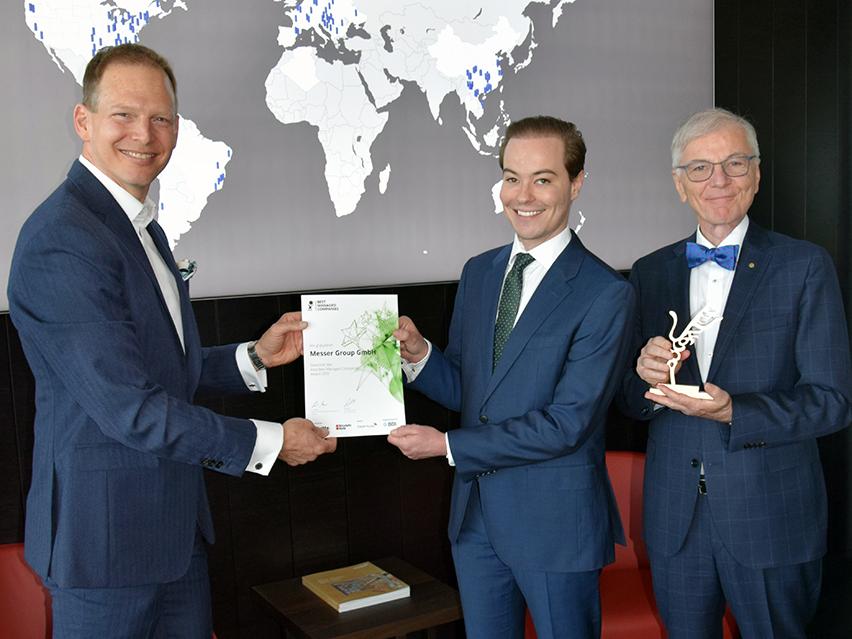
International: Superconductivity for large consumers
The global demand for electricity is growing – and with it, the demand for power lines. But there is less and less space for new transmission line routes. Innovative high-temperature superconductors can alleviate the bottlenecks. Despite their name, they must be cooled with liquid nitrogen. Messer developed a cooling system that can reduce the combined energy losses from the cooling by up to 50 percent. It works without a return line or a recirculation pump, and intermediate cooling stations are not required. This reduces investment costs significantly. This technology makes it possible to implement up to 100-kilometer-long, energy-efficient superconducting cable runs inexpensively and with very high operational reliability.
International: Superconductivity for large consumers
Industrial power lines must provide a great deal of electrical power, however, part of which is lost due to electrical resistance. Superconductors that conduct electricity without losses solve this problem. The prerequisite for this is a very low operating temperature. In the context of the DEMO200 project, a superconducting busbar system is being developed for series production. For DEMO200’s pilot project, which started in 2020, Messer developed a new technical approach for cooling the busbar: to reach the required operating temperature of minus 206 degrees Celsius, the minus 196 degree liquid nitrogen is further “subcooled.” For this purpose, it is fed into a vacuum-insulated tank where expansion under negative pressure cools it down to minus 209 degrees Celsius.

Germany: Fuel from sewage sludge
Together with twelve other partners from five European countries, the Fraunhofer Institute for Environmental, Safety, and Energy Technology UMSICHT is carrying out the EU project “TO-SYN-FUEL.” It is designed to show how thermo catalytic reforming (TCR) can be used to convert organic waste – in this case, sewage sludge – into biofuels, green hydrogen and biochar. In 2020, a demonstration unit went into operation. It converts 500 kilograms per hour of dried sewage sludge into about 50 liters of standard-grade gasoline and diesel. Messer in Germany supported the project with regard to the technical layout along with the specification and design of the hydrogen tank.
Deutschland: Kraftstoff aus Klärschlamm
Gemeinsam mit elf weiteren Partnern aus fünf europäischen Ländern führt das Fraunhofer-Institut für Umwelt-, Sicherheits- und Energietechnik UMSICHT das EU-Projekt „TO-SYN-FUEL“ durch. Es soll zeigen, wie mit Hilfe des thermokatalytischen Reforming (TCR-Verfahren) organischer Abfall – in diesem Fall Klärschlamm –, in Biokraftstoffe, grünen Wasserstoff und Biokohle umgewandelt werden kann. 2020 ging eine Demonstrationsanlage in Betrieb, die pro Stunde 500 Kilogramm getrockneten Klärschlamm in etwa 50 Liter normgerechtes Benzin und Diesel umwandelt. Messer in Deutschland unterstützte das Projekt bezüglich der technischen Auslegung sowie der Definition und Konzeption des Wasserstofftanks.
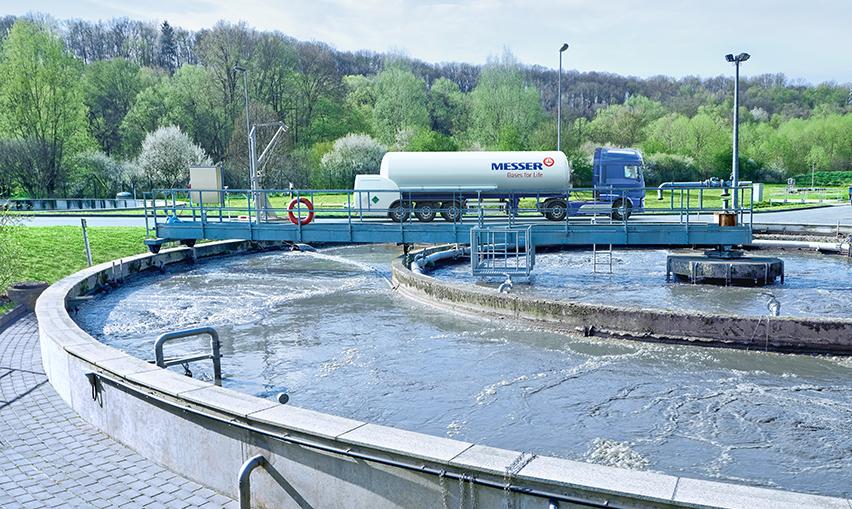
Germany: Toyota and Messer present the “one-stop shop”
Toyota Tsusho and Messer presented the “one-stop shop” in Höchst. This joint concept for fuel cell-powered buses offers all the associated services from a single source – including the necessary hydrogen infrastructure. Patricia Vasconcelos, Managing Director of the Portuguese bus manufacturer CaetanoBus, used the workshop to give a live demonstration of her company’s fuel cell-powered bus. The event was hosted by industrial services specialist Infraserv and organized by LEA LandesEnergieAgentur Hessen.
Hungary: Hydrogen ice stops nuclear fusion
A few years from now, the ITER nuclear fusion reactor currently under construction in Cadarache, France, will begin fusing hydrogen isotopes. In order to be able to stop the reaction, if necessary, the fusion laboratory of the Energy Research Center in Budapest is developing a secure shutdown mechanism based on the introduction of -260°C hydrogen ice. It is fired at high speed into the target area, where it lowers the temperature and therefore the energy level of the plasma. The fusion laboratory’s gas supply system, which operates at a pressure of 300 bar, was installed by Messer. Messer also supplies the project with high-purity gases such as hydrogen, helium, argon, neon and nitrogen.
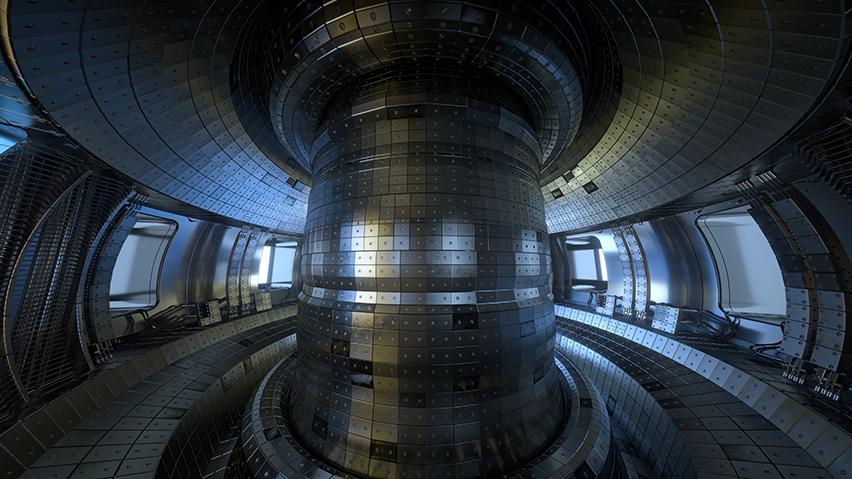
Spain: Emission-free through Tarragona
The City of Tarragona wants to convert its fleet of buses to emission-free vehicles. For the test drive with a hydrogen-powered bus, Messer delivered the gas from a fuel pump installed at the company’s site in Vilaseca. Along with the municipal authorities of Tarragona, Toyota and CaetanoBus were also involved in the organization of the test run. Together with Messer, they offer a comprehensive solution for the operation of hydrogen-powered bus fleets.
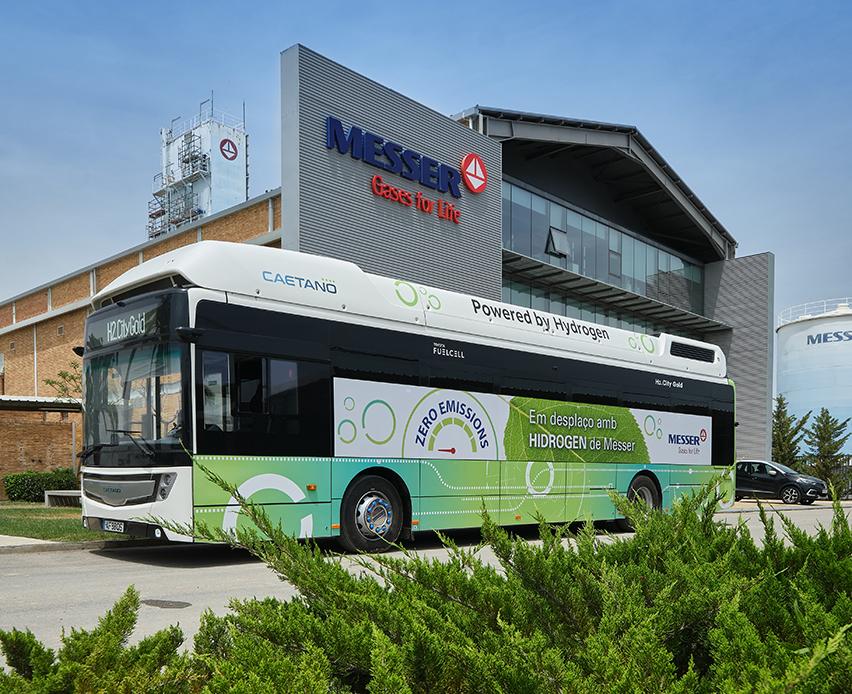
UN Goal 12 - Responsible Consumption and Production
Greenhouse gas emissions
In accordance with the GHG (Greenhouse Gas) Protocol, for calculation purposes we classify greenhouse gases into three categories: direct emissions (Scope 1), indirect emissions from procured energy (Scope 2), and other indirect emissions in the upstream and downstream supply chain (Scope 3), measuring the emissions in terms of CO2 equivalents (CO2e).
For 2021, the following changes apply to the calculation of greenhouse gas emissions:
- Dual calculation approach for Scope 2, presenting both the location-based method as previously used and a new, market-based method.
- Extension of the scope of calculation for Scope 3, including additional categories recommended by a joint working group comprising industrial gases companies and industrial gases associations.
In the financial year 2021, the total greenhouse gases emitted directly and indirectly as a result of Messer’s activities in production and logistics worldwide, i.e. Scopes 1 & 2, stood at 5.46 million metric tons of CO2e. That was 680,000 metric tons more than in the previous year, when the combined value was 4.78 million metric tons of CO2e. This 14.2 percent increase is primarily attributable to two factors: First, our sales growth, and second, the less favorable CO2 factor for energy in Asia due to the lower quality electricity mix caused by the electricity shortage.
The CO2 emissions intensity of Messer’s worldwide activities (Scopes 1 & 2), measured as the ratio CO2e per Euro of sales, stood at 1.55 CO2e/€ in 2021, slightly above the combined value of 1.53 CO2e/€ measured for 2020.
Scope 1
Scope 1 includes direct emissions generated in our production facilities. In particular, this applies in connection with the production of hydrogen, carbon dioxide and nitrous oxide. Other direct emissions are generated in logistics by the combustion of fuel. In 2021, Scope 1 for Messer worldwide totaled 240,300 metric tons of CO2e. In 2020, the comparable value was 220,600 metric tons of CO2e. This 8.9-percent increase is attributable to Messer’s strong sales growth, which was over 10 percent in 2021.
In 2021, the bulk and cylinder fleet of Messer including Western Europe consumed 35.37 million liters of diesel fuel. In 2020, that value was 29.95 million liters. Our fleet traveled a total of 114.30 million kilometers in 2021, versus 96.98 million kilometers in 2020. The increase of more than 10 percent is in line with the growth of our activities in 2021. The average rate of diesel fuel consumption once again remained nearly unchanged; in 2021 it was again 0.309 liters per kilometer traveled.
We express the trend in distance traveled per metric ton (payload) of liquefied industrial gases or cylinder gases for Messer worldwide in 2021 with an index value of 99.4; in 2020 the index value was 101.9. The slight decline in this parameter resulted from, among other factors, the fact that the seamless supply of medical oxygen during the coronavirus crisis also required additional routes in 2021.
As in 2020 already, the year under review 2021 was marked by challenges arising from the coronavirus pandemic. From a logistical perceptive, ensuring supply, notably of medical oxygen, to our customers was especially challenging. It was our top priority. Despite all of our efforts to work efficiently, however, we were unable to reach all of the targets that we had set for ourselves relative to the KPIs in the logistics area.
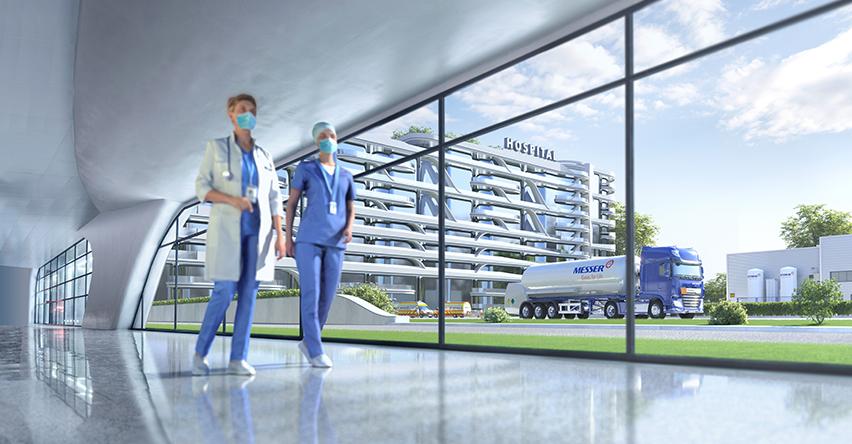
In Croatia, the Czech Republic, Serbia and China, Messer produces nitrous oxide (N2O). This gas is used in medical applications and in the electronics and food industries. In Switzerland and China, Messer operates a total of six company-owned hydrogen plants. Three other hydrogen units located on our customers’ premises in Austria and Hungary (on site units) are not included in the calculation of our own CO2 footprint. In its gaseous state, hydrogen is used in many industries – e.g. as a food additive in hydrogenation or fat-hardening, in heat treatment processes, as an energy source, or even as an emissions-free fuel.
Scope 2
Indirect CO2 emissions under Scope 2 relate to the production process of the purchased electricity. For Messer Group-wide in 2021, that value, location-based, increased from 4.51 million metric ton in 2020 to 5.22 million metric ton in 2021, of which 1.47 million metric tons related to Messer in North and South America. This increase of 0.71 million metric ton growth in 2021 vs. the previous year’s figure is primarily attributable to the strong growth of our business as well as the increase of the emissions factor in Asia: as long as the global trend toward more green electricity continues, we will also continue to purchase more emission-free electricity. As a result, our indirect CO2 emissions under Scope 2 – which make up more than 90 percent of the total emissions generated from our own activities – will follow the downward trend, until the long-term goal of climate neutrality is reached.
With regard to the air separation units that we develop and build, we pay particular attention to their energy-efficient design and the cost-effective procurement of energy used to operate them.
For example, to optimize our electricity procurement, we use calls for tenders throughout Europe, long-term framework agreements, and continuous monitoring of futures and spot markets. A centralized team provides advice and support to our subsidiaries when they purchase electrical power. That team also uses regular comparative analyses to study electricity costs and the use of renewable energies.
The location-based emissions factor increased by about 3.3 percent versus the previous year; this was mainly due to our activities in Asia. Our absolute global CO2e footprint increased by about 15.6 percent in 2021, because we consumed in total about 12 percent more electricity for the product volume manufactured.
In 2021, our production units consumed 11.9 TWh of electricity worldwide, which was 1.3 TWh more than in 2020. This change was due to a strong increase in electricity demand in all regions: relative to 2020, it rose by 14.8 percent in Asia, by 10.3 percent in Europe, and by 9.7 percent in North and South America.
Despite efficiency improvements and the procurement of renewable electricity, e.g. through power purchase agreements (PPA), indirect CO2 emissions (Scope 2) continued to rise Group-wide. The reasons for this are the growth in sales through new air separation units along with the higher utilization of existing units.
In view of the decarbonization program and the goal to reduce greenhouse gas emissions, alongside the previously used “location-based" method, the “market-based” calculation of GHG emissions pursuant to the GHG Protocol is being used for the first time. For 2021, the GHG emissions were estimated to be 5.48 million metric tons.
Scope 3
The emissions documented under Scope 3 are indirect emissions unrelated to the purchase of electricity. This applies to the major upstream and downstream activities. Examples of this include the purchase of commodities, services and capital goods, the consumption of other energy, and the electricity transmission losses not included in Scope 1&2, as well as business travel, employees’ commute to and from work, and products sold.
The Group-wide total CO2 equivalence value for the greenhouse gas emissions under Scope 3 in 2021 was 2.95 million metric tons. This was significantly higher than the comparable figure for 2020. The latter accounted only for other energy consumption, business travel and the employees’ commute to and from work, however. After a thorough review of our previously applied estimation method, we have started to revise the estimate of the main categories of Scope 3. This applies to all main categories that significantly impact the integration of upstream and downstream supply chains related to our activities.
Water consumption
Most of the water that we consume is used to cool the compressors in our air separation units. In 2021, our Group-wide water consumption was 17.5 million cubic meters, which represents an increase of 900,000 cubic meters over financial year 2020. This 5.4-percent increase is attributable to the increase in production in 2021.
Our main manufacturing processes – air separation, CO2 purification and liquefaction – need no water within the actual production process streams. But they do generate a great deal of heat, mainly during the compression of gases. To carry that heat away, most units have an open cooling water circuit: the cooling water absorbs heat from the respective sources and discharges it to the atmosphere in an open cooling tower. There, part of the circulating water evaporates and another part is removed to prevent insoluble components from thickening. Fresh water must be fed back into the system to replace the water that is evaporated and/or removed. This results in the only direct water consumption of our manufacturing processes. The quantity of make-up water added is directly dependent on a unit’s electricity consumption. It averages about two to three cubic meters per hour per megawatt of electrical power.

Energy management system certifications
Our commitment to environmental protection is also reflected by our quality management system, which regulates our operations the world over. We are certified according to ISO 14001 and RCMS in 59 consolidated companies. ISO 14001 is an internationally recognized standard developed by the International Organization for Standardization (ISO). It defines requirements designed to help organizations establish, implement, maintain and continuously improve their environmental management systems. RCMS certification serves the comparable purpose and function for our American production sites.
Customer service
We act sustainably to meet our customers’ needs, which include the reduction of their own carbon footprint. We achieve this through the impact of our gas applications on their production processes, through an efficient supply of gases – via on site units, for example – and through the use of emission-free or low-carbon products such as green hydrogen.
In customers’ industrial processes, our “Gases for Life” provide for greater safety, efficiency, quality, capacity and environmental compatibility and / or reduce the associated emissions and costs. To fully realize these potentials, we work closely with our customers, supply application engineering equipment and expertise, and help design and optimize processes. In addition, we provide our customers with process development support.
Messer, including its Western European companies, signed more new bulk contracts than in the previous year: In 2021, 31.1 percent of new contracts with explicitly positive overall effect on the environment were signed; in the 2020 financial year, that figure was 29.7 percent.
The increased number of new contracts based on applications with positive effects on the environment include, among other things:
- Increase in applications and installations with oxyfuel in Europe, especially in the non-ferrous and glass segments
- Continued implementation of cryocondensation units
- Further development of oxyfuel and hydrogen-oxygen combustion technology, both in the company’s own competence center and through sponsored R&D projects
In addition, the installation of on site units that produce industrial gases eliminated the need for some bulk deliveries, thereby reducing emissions by 4,800 metric tons of CO2e in the financial year 2021. That represents an additional 14-percent reduction relative to 2020 – despite growth that was observed in the context of increasingly dynamic activity overall.
In 2021, Messer further intensified its commitment to clean hydrogen: A cooperation agreement was signed with Siemens Energy to collaborate on green hydrogen projects in the 5-to-50-megawatt range for industrial and mobility applications. Messer in Spain has already applied to the Spanish government for funding for three such green hydrogen projects in the chemical complex in Tarragona.
Together with Toyota Tsusho, Messer is offering the “One-Stop Shop” to bus operators. The concept bundles all the products and services required to operate hydrogen-powered, fuel cell electric bus fleets.
Messer is part of the joint venture “HyDN” in the district of Düren, Germany, where a new production facility for green hydrogen is being installed. Messer’s expertise in the efficient operation of gas production facilities and refueling infrastructure will help ensure the effective operation of fleets of fuel cell electric buses and trains.
In Spain Messer participated in a conference in Reus on hydrogen and sustainable mobility organized by the Chair for the Promotion of Business Innovation, the URV Foundation (University of Rovira i Virgili), and Hydrogen Valley of Catalonia. Companies such as Repsol, Enagas, Messer Ibérica and Technip explained their commitment to the development of the value chain for green hydrogen. Jordi Soler, head of hydrogen business development for Messer in Spain, presented the company’s activities in the sustainable mobility area and emphasized the importance of the hydrogen value chain as an energy vector.
In the USA, Messer Industries has substantial experience in hydrogen for vehicle refueling applications. At a car manufacturing plant in Greer, South Carolina, Messer supplies the technology and the hydrogen for one of the largest fleets of forklift trucks and other industrial handling equipment in the USA. In 2021 the facility installed by Messer was extended and the service and hydrogen supply contracts were successfully renewed.
Serbia: Welding gases for solar thermal energy
In 2019, Messer supplies argon, methane, oxygen and acetylene to Master Solar in Šimanovci near Belgrade. The company produces equipment that makes thermal use of the sun’s energy. Along with collectors, this also includes stratified charge storage tanks for water warmed by the sun. Master Solar’s high-quality units have proven their worth even under extreme climate conditions. The gases are used for various welding processes, including CMT (cold metal transfer) welding, which produces particularly high-quality, practically splatter-free welds.
China: Neutralizing and saving with CO2
In 2019, Messer supplies CO2 and hardware to Gezhouba Environment & Engineering to neutralize alkaline wastewater. The company cleans sludge pumped from Dian Lake. The largest inland lake in Yunnan Province is polluted due to over-fertilization. An alkaline, calcareous agent is used to extract water from the sludge. That process wastewater is then highly alkaline and contains about 500 milligrams of lime per liter. Carbon dioxide, introduced with tubular reactors built by Messer, lowers the pH and softens the water. Unlike the previously used hydrochloric acid process, this method releases no chloride ions. Now the treated wastewater can be pumped right back into the lake. And process costs have also been reduced by more than 30 percent.
Slovenia: Water purification conference in Slovenia
In June 2019, together with the Institute for Environmental Protection and Sensors IOS, Messer Slovenija organized a professional symposium on the purification of process water and wastewater in the paper and metal industries. Experts from Messer showed participants the possible uses of industrial gases and how they affect the processes of conditioning, purification and neutralization of industrial water, including specific examples from industrial practice.
Brazil: Sustainable CO2 production in Jandaia do Sul
Messer further expanded its carbon dioxide (CO2) capacities in the south, southeast and mid-west of Brazil: at our Jandaia do Sul site, pure, food-grade CO2 is being produced from maize for the first time in Brazil - with production taking place throughout the entire year and without seasonal interruptions. The sustainably produced CO2 allows us to meet the increased demand across various industries. The decision to expand CO2 capacities at the Jandaia do Sul site is a clear commitment on the part of Messer to further expansion in the Brazilian market. Our CO2 production site links to the rail network to facilitate logistical access to Curitiba, São Paulo and the ports of Santos and Paranaguá as well as the entire southern region.
China: More environmentally friendly iron production
Xianggang Messer signed a new gas supply contract with its Joint Venture partner and, at the same time, largest pipeline customer, Xiangtan Iron & Steel, for the construction of a VPSA (Vacuum Pressure Swing Adsorption) unit. The new production unit will facilitate economically efficient production of oxygen to meet the customer’s increased demand for oxygen enrichment for their blast furnace. Increasing the oxygen enrichment ratio means reduced consumption of coke, which leads to greater efficiency and lower emissions in the iron production process.
Czech Republic: New nitrogen production facility for Energoaqua
Messer put another nitrogen production unit into operation for Energoaqua in Rožnov pod Radhoštěm. Energoaqua is a service provider and supplier of electricity, heating and industrial gases for a range of companies in the adjacent industrial park. The company has been operating an on-site nitrogen production unit installed by Messer for approximately ten years. Demand at the industrial park has increased greatly since then, which is why Messer has been supplying Energoaqua with additional liquid nitrogen and other industrial gases by tanker for years. The new on-site production facility allows Energoaqua to produce the nitrogen independently with high reliability of supply – with the additional benefit of eliminating the CO2 emissions and noise pollution associated with nitrogen deliveries by road tanker.
France: New CO2 recovery plant in Lacq
Messer is building a second CO2 purification and liquefaction facility in Lacq with a capacity of 60,000 metric tons a year. The two storage tanks for our new CO2 recovery plant in southwest France were delivered at the beginning of July 2021. The tanks – 29 meters in length and weighing 53 metric tons – were manufactured in Turkey and transported to Bayonne by sea. From there they were transported onwards by truck, which was done at night in order to minimize the impact on traffic. Work on the construction of our new CO2 recovery plant began in March 2021. The start of industrial production is planned for July 2022.
The additional production capacity will allow Messer to further enhance security of supply of CO2 for its customers in France and Spain.
Germany: New nitrogen supply system at Nowega
On October 1, 2021, Messer took over regular operation of a nitrogen production facility at Nowega in Rehden, one of the transmission system operators for natural gas in Germany. Nowega uses the nitrogen to ensure the supply of ‘L-gas’ quality natural gas in its network area even in periods of peak demand. Thanks to the nitrogen production facility, the previous road tanker deliveries are no longer necessary, reducing the strain on the road network and cutting noise pollution. Further CO2 emissions are also avoided thanks to the fact that the nitrogen does not require to be liquefied as part of the on-site production process. In total, Messer and Nowega are contributing to environmental protection by reducing climate-damaging emissions by up to 16,400 metric tons a year. Moreover, the nitrogen production facility has significantly increased Nowega’s security of supply of natural gas.
Serbia: CO2 production plant in Rusanda
Messer is investing in a highly efficient CO2 purification and liquefaction facility in Vojvodina. The crude CO2 gas – with a high CO2 concentration and high pressure – comes from a natural gas processing plant. At this facility, the sour gas is conditioned by separating the CO2 so that it can be fed into the natural gas network. At our CO2 plant, the relatively high methane content in the crude gas is used to generate electrical and thermal energy. This makes the production of 40,000 metric tons of high-purity liquid CO2 per year particularly economically efficient. The plant, which is due to go into operation in the fourth quarter of 2022, will allow Messer to further strengthen its provision of a reliable and cost-effective supply of CO2 to customers in Serbia and the region. It will also create the conditions for a significant expansion of our customer base in the region.
Serbia: Expansion of oxygen supply at Metalfer Steel Mill
Metalfer Steel Mill is one of the leading manufacturers of steel products for the Serbian construction industry and the only producer of reinforcing steel in Serbia. In view of the increased demand for industrial oxygen, Messer and Metalfer Steel Mill signed a new long-term supply contract in 2021. In future, the oxygen for Metalfer will come from a dedicated VPSA (Vacuum Pressure Swing Adsorption) unit, which is scheduled to go into operation at the end of August 2022. The solution implemented on site will make the transportation of oxygen by road largely superfluous. This will reduce the ecological footprint and lower the company’s costs.
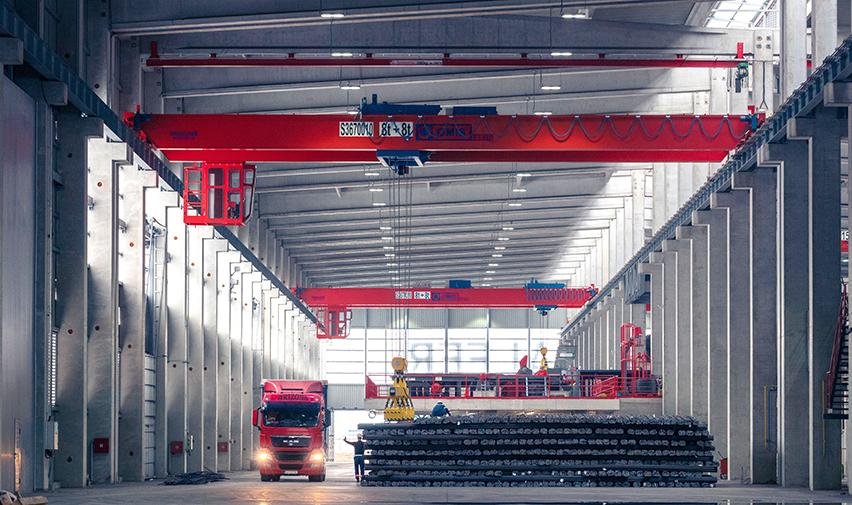
Slovakia: First facility for the production of argon from synthesis gas at Duslo
At the Duslo, a.s. site in Šaľa, Messer put into operation an argon production facility based on residual gas from ammonia synthesis for the first time. The purge gas contains the rare gas argon as well as methane, nitrogen and hydrogen. These gases are also recovered by the facility in accordance with Duslo’s quality requirements. Technically, the facility features fully automated operation and maximum energy integration. In full operation, an annual reduction of up to around 500 metric tons of CO2 emissions can be achieved thanks to shorter transportation routes. Moreover, this investment allows us to increase our argon capacities and further strengthen our market position in this segment.
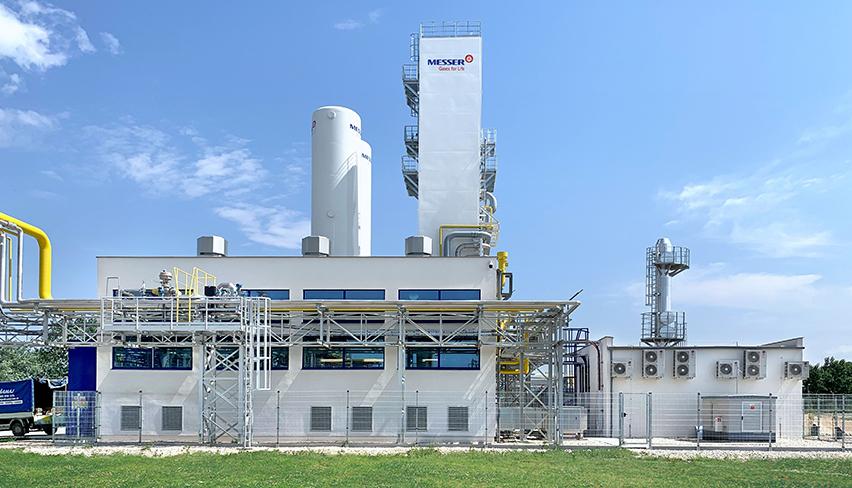
Slovenia: New oxygen production facility at Steklarna Hrastnik
Steklarna Hrastnik develops and manufactures engineered glass products from one of the clearest types of glass in the world. This long-established company has been using oxygen in the production process for over 50 years, and since 2013 it has been harnessing the advantages of our oxy-fuel technology. In 2019, Steklarna Hrastnik and Messer signed a supply contract for oxygen from an on-site unit (CryoGox), which went into operation at the beginning of September 2021. Steklarna Hrastnik uses the pure oxygen generated by the on-site unit in glass production in its new G furnace, with a 60 percent reduction in the carbon footprint. Steklarna Hrastnik wants to convert its processes to green technologies, and the new on-site oxygen production unit is another step in this direction.
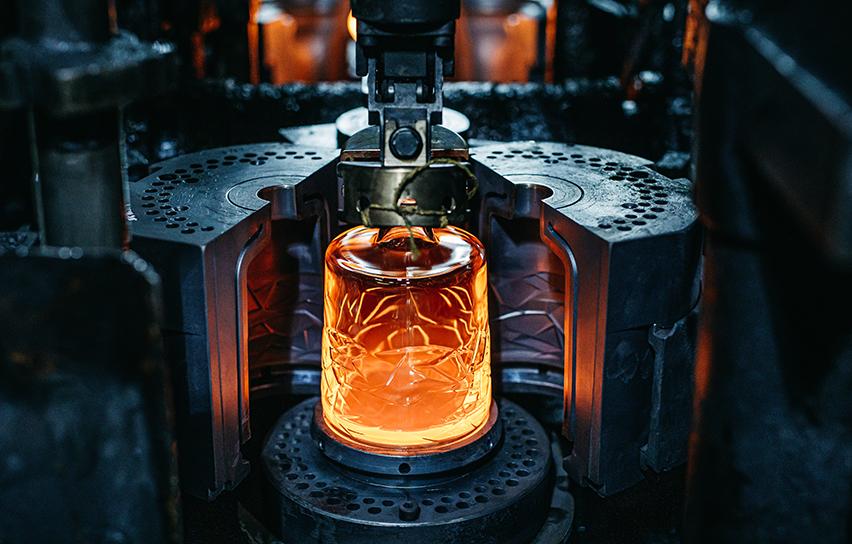
Spain: Successful modernization of CMG-II air separation unit in Vilaseca
The end of November 2021 saw the successful completion – on time and on budget – of the modernization of the CMG-II air separation unit (ASU) in Vilaseca, in the southern part of Tarragona’s petrochemical industrial park. The main aim of the project was to reactivate an existing air separation unit in an environmentally and, at the same time, commercially attractive way. This was achieved by significantly improving the specific energy consumption of the unit, previously assessed as ready for decommissioning. Messer intends to operate the now completely renovated unit for at least the next ten years. This has made it possible to avoid all the environmental impacts that would have been associated with the construction of a new unit.
The project involved completely overhauling all the process machinery, improving the control system, checking all the pressure vessels, removing obsolete equipment and components and carrying out a comprehensive technology upgrade. The latter comprises using a completely new Front End with a new air compressor and a new adsorptive air purification system. All the work was completed in a record time of ten months and without a single safety or environment-related incident.
The CMG-II ASU was built in 1977. Since the Messer-IV ASU was commissioned in 2009, the CMG-II ASU has been used as a backup supply for our industrial gases pipeline network in the Tarragona Industrial Park.
USA: Construction of a new air separation unit in Texas announced
Messer announced the construction of an air separation unit (ASU) in central Texas aimed at further expanding its strong supply network for gases in the southwestern part of the country. The new ASU will produce medical and industrial gases that are indispensable for hospitals, food processing and many sectors of industry. The new ASU will operate substantially off energy supplied from an onsite solar panel array. It is the first Messer plant to be powered by a co-located renewable energy source, helping to reduce the company’s carbon footprint.
Vietnam: New nitrogen generator and pipeline connection for solar cell production facilities
In 2021, Messer further consolidated its leading role as a supplier of gases to the solar industry in Vietnam. In October 2021, Messer signed a new nitrogen generator contract with JA SOLAR, a global leader in the manufacture of high-performance photovoltaic products, for their solar cell production facility in Bac Giang. Messer also signed a contract for the piped supply of nitrogen to Trinasolar’s new solar cell production plant, which is located next to Messer’s air separation unit in Thai Nguyen. With these investments, we are ensuring a reliable gas supply to both these global market leaders in the solar industry, while at the same time reducing the carbon footprint of our nitrogen and making solar cell production – so important for green energy – “even greener”.
Sustainable handling of nitrous oxide
Nitrous oxide is both a widely used anesthetic and an extremely powerful greenhouse gas. Messer works together with the Swedish medical technology firm Medclair to prevent unnecessary release. Medclair’s product range includes stationary and mobile devices that capture the anesthetic exhaled from the lungs of patients. These “destruction units” use heat to break the nitrous oxide down into its harmless components – nitrogen and oxygen. Messer and Medclair signed a partnership agreement in December of 2021: Medclair supplies the technology for N2O neutralization; Messer supports sales in the healthcare sector and develops additional markets for the climate protection devices.
Hungary – High-performance compressor for energy efficiency
In its air separation unit at the BorsodChem site, Messer in Hungary replaced three existing compressors with a new high-performance turbo-compressor. The latter went into operation in March 2021 and has been providing far greater energy efficiency ever since. The production capacity has been increased as well.
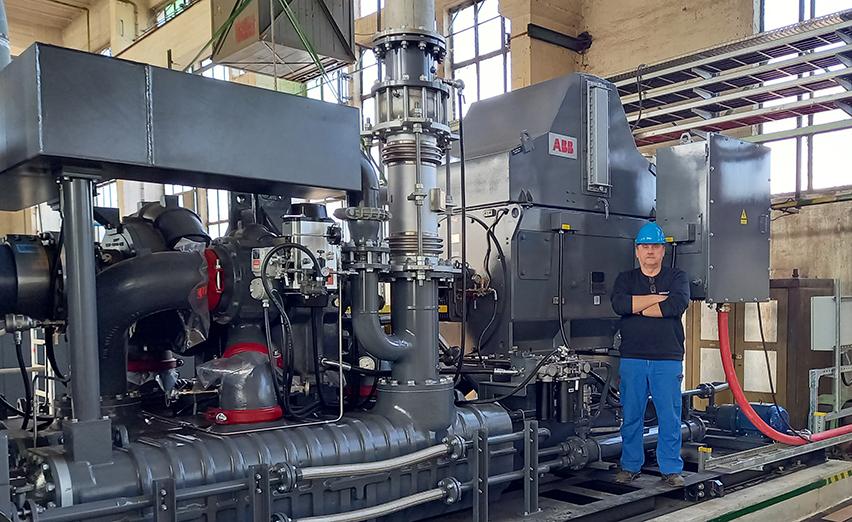
Brazil – Eco-friendly tandem trailer
In northeastern Brazil, Messer is using a new tandem tractor-trailer to transport liquid oxygen. The trailer was developed with the long routes in the region in mind. Thanks to its extended tank capacity, it can satisfy demand with fewer delivery runs. That raises productivity, enables greater sustainability in logistics, and generates less CO2 emissions.
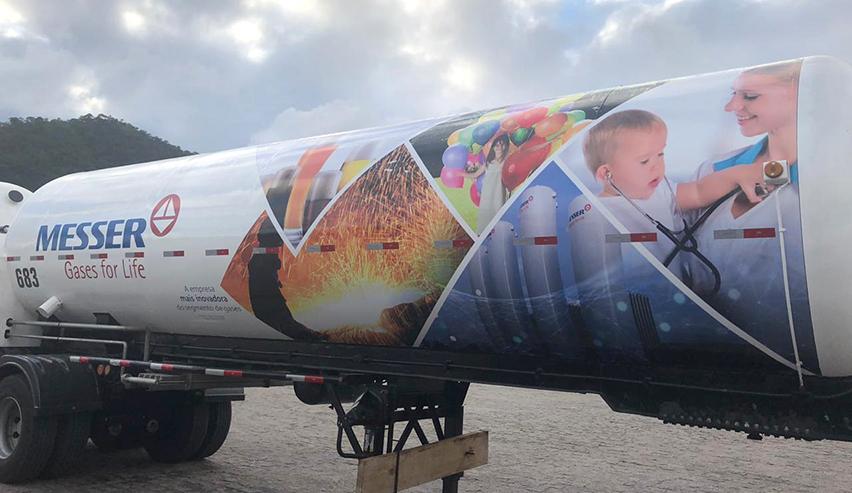
Poland – Optimized filling and air separation
With the support of ACKLogic of Spain, an automated trailer filling system was installed at Messer’s sites in Rybnik and Turek, Poland. It not only simplifies the work of the drivers but also makes the filling process safer and more reliable. A new software-based control system was also used to optimize the air separation process in the production units in Rybnik and Turek. The automated control system makes it possible to reduce energy consumption as well as product losses from venting while maintaining a high argon recovery rate.
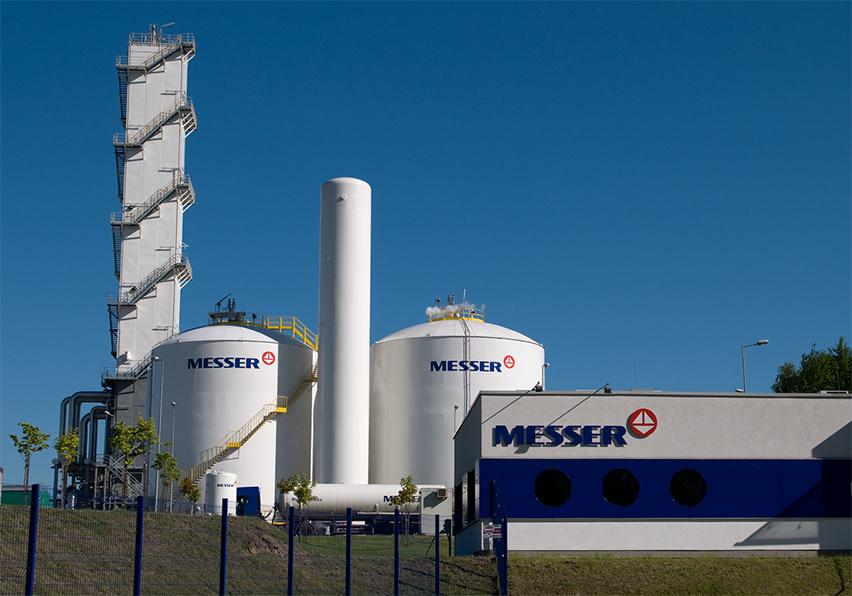
Energy & quality management
Our commitment to environmental protection is also reflected in our worldwide Quality Management System. In 2021, 61 consolidated companies were certified according to ISO 14001 or Responsible Care Management System (RCMS); that was two more than in the previous year. ISO 14001 is an internationally recognized standard developed by the International Organization for Standardization (ISO). It defines requirements designed to help organizations establish, implement, maintain and continuously improve their environmental management systems. RCMS certification serves the comparable purpose and function for our American production sites.
France – Eco-friendly cooling alternative
In May 2021, Messer started up a public EcoLIN station at the Rungis wholesale market near Paris. It was installed on the site of the world’s largest wholesale market for fresh produce. Vehicles that use cryogenic gases to cool their refrigeration compartments can top up their coolant supply any time of day or night – rapidly, safely and automatically. Liquid nitrogen offers an eco-friendly, low-noise cooling option that emits neither particulates nor NOx or CO2.
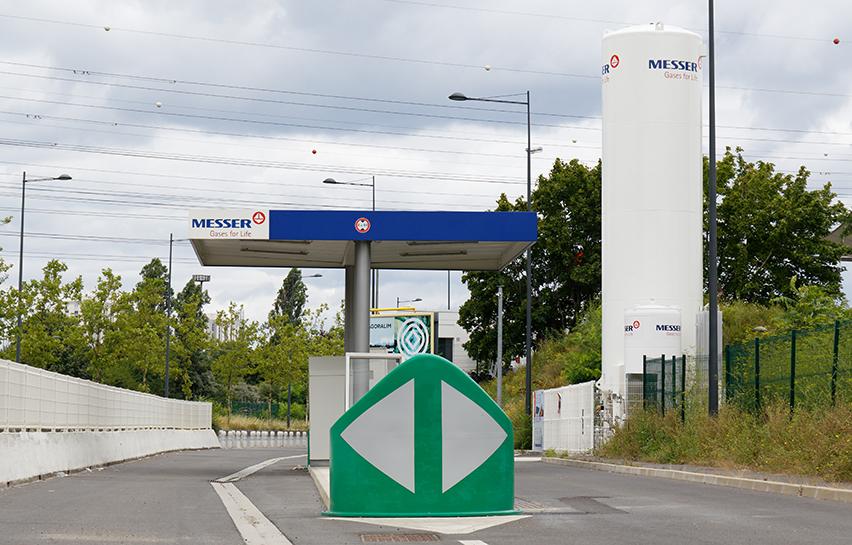
Canada: ISO-certified CO2 recovery unit
Together with HTC Extraction Systems, ASCO delivered a unit for recovering carbon dioxide (CO2) to an Alberta-based applied research organization. It extracts six metric tons of CO2 per day from the flue gas of a natural gas-fired power plant. It is the world’s first CO2 recovery plant certified according to ISO 14034 ETV. The certification was carried out by the independent consulting firm 350Solutions.
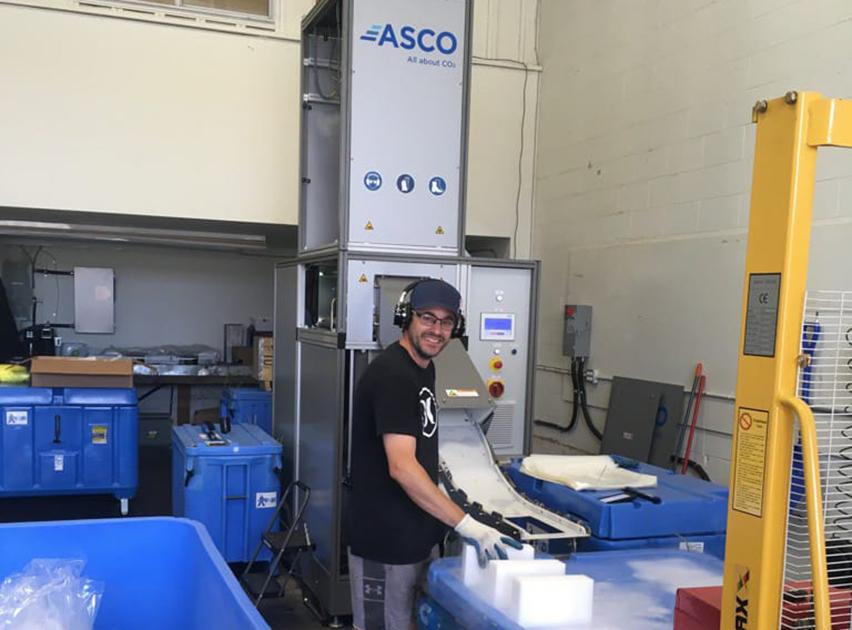
Canada: Eco-friendly cooling technology with CO2
As a refrigerant for passenger car air conditioners, carbon dioxide (CO2) is a climate-friendly alternative to the tetrafluoroethane that was used in the past. With its cylinder gases segment, Messer in Canada is the country’s key supplier of CO2 in the refrigerant quality required for this application.
France: CO2 for sustainable wastewater treatment
At its site in southwestern France, a company specialized in the production of baby food uses CO2 and the Neutrabox injection system from Messer to neutralize alkaline wastewater. This solution is more eco-friendly, more economical and safer than using mineral acids. It also controls pH more effectively and precisely.
Germany: EcoVap reduces ecological footprint
At FKM Sintertechnik in Biedenkopf, Messer installed new liquid nitrogen tanks and an EcoVap unit to make use of cooling energy. The gas is used for inertization in various sub-processes. The EcoVap unit takes the cold released by the liquefied gas in a cooling plant and transfers it to the circulating coolant. This enables FKM to save energy, cut costs and reduce the size of its ecological footprint. The company also uses shielding and process gases from Messer.
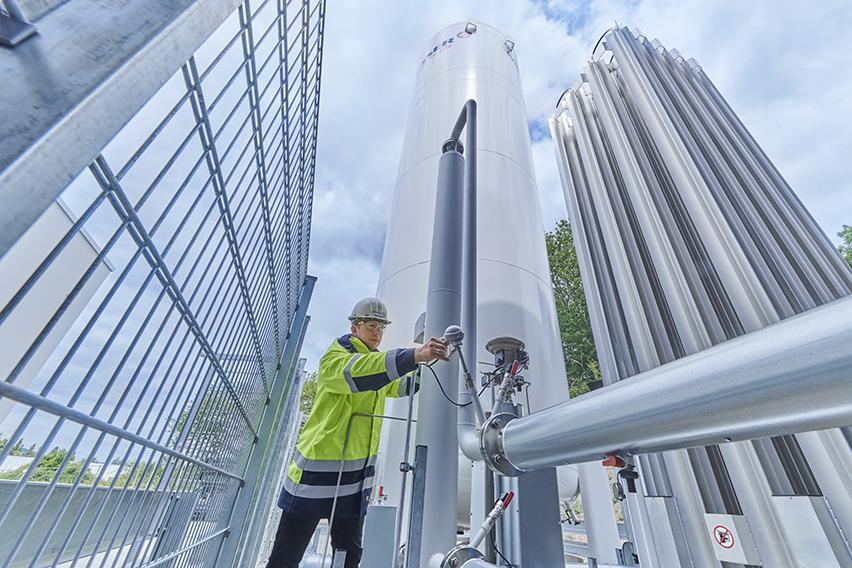
Germany: Hydrogen for public bus service test
In late summer 2021, Messer supplied hydrogen for the trial operation of a fuel cell-powered public bus in the Waldshut-Tiengen district. The four-week test phase successfully investigated the practical feasibility of the vehicle. The bus carried passengers on established routes in normal operation. One fill-up with 38 kilograms held enough fuel for up to 400 kilometers, which more than sufficed for the distance typically traveled over the course of a day, about 300 kilometers.
Hungary: Gases for flexible solar modules
The Swiss company Flisom specializes in the production of ultralight and flexible solar films. At its film production operation in Hungary, Flisom uses argon, helium and nitrogen from Messer. Flisom’s production technology makes it possible to minimize material and energy requirements for a product with both low levelized cost of electricity (LCoE) and high energy output.
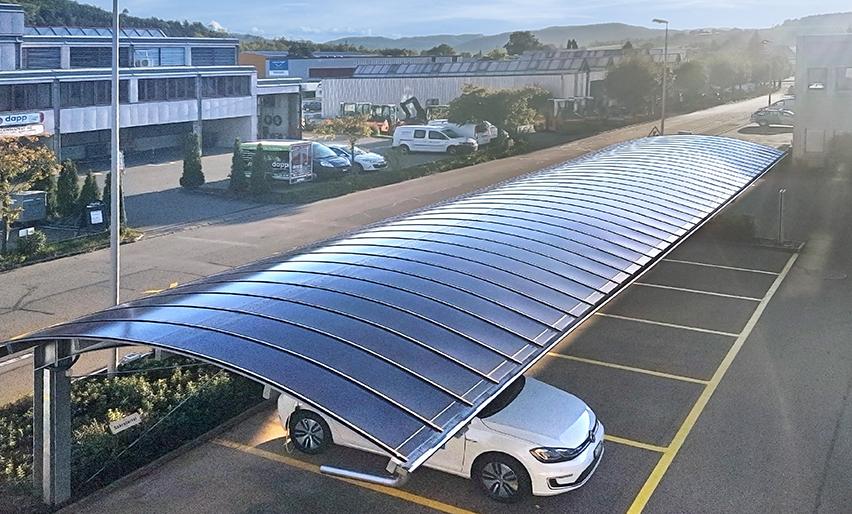
Poland: Oxygen for dairy wastewater treatment plant
Mlekovita Dairy in Baranów has been treating its sewage sludge with oxygen from Messer since 2016 because the addition of oxygen increases the plant’s efficiency. Otherwise, the company would have had to expand its wastewater treatment plant. The gas also helps reduce equipment requirements and the use of chemicals. In a test series, Messer had previously determined the optimal process conditions. The dairy was able to significantly reduce the quantity of wastewater it produces.

Slovenia: On-site oxygen generation benefits glass maker
Messer installed an oxygen production unit in Hrastnik for the glass manufacturer Steklarna Hrastnik. The Slovenian company has been using oxygen to melt glass for more than 50 years now. Previously, the gas has been delivered in tank cars. The new on-site unit significantly reduces the cost and CO2 emissions associated with transport while raising supply reliability at the same time. The use of oxygen increases combustion efficiency in the melting furnace, thereby also lowering CO2 emissions.
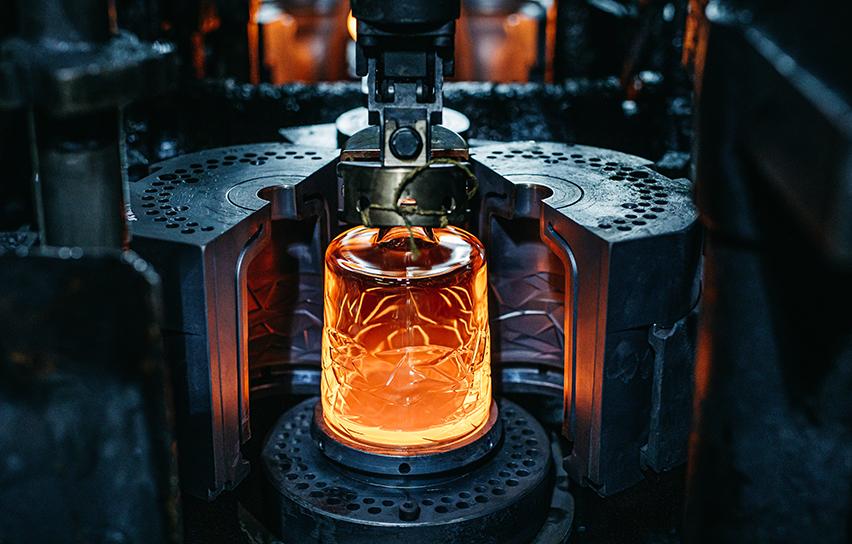
Spain: Refrigeration recycles refrigerant
To recycle refrigerators and freezers, Industrias López Soriano (ILSSA) buys liquid nitrogen from Messer. A plant in Zaragoza uses the cryogenic gas to separate out the environmentally harmful refrigerants in a two-step process. ILSSA has more than five recycling plants in the autonomous region of Aragon, which receive waste materials and waste products from all over Spain. Using state-of-the-art technology, ILSSA extracts an extremely wide range of materials from the waste and returns them to the industrial production chain as raw materials.
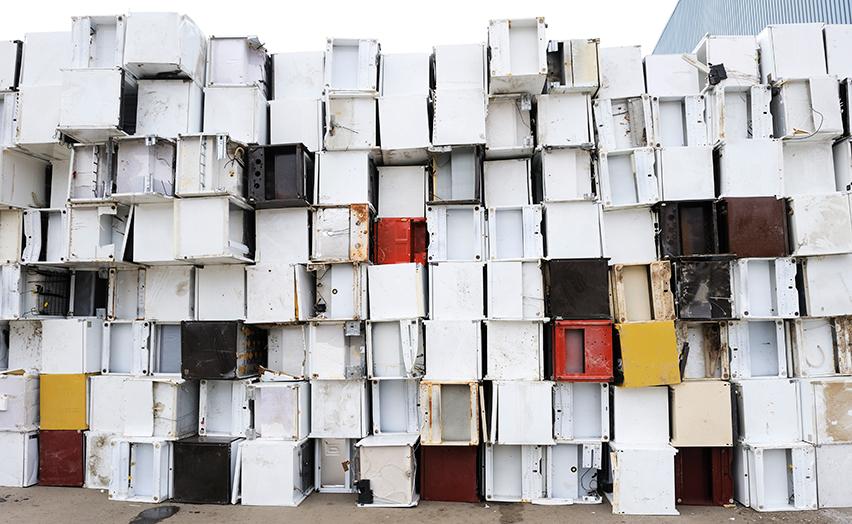
France: Dry ice for food deliveries
When delivering frozen food to end customers in Greater Paris, the retail chain Casino Group’s subsidiary O’logistique relies on SnowDrop units from Messer and MiniCryo boxes from Olivo Cold Logistics. Dry ice snow securely stored in the lid keeps the contents of the delivery boxes reliably cooled for up to 18 hours. A Messer-patented SnowDrop machine produces fresh dry ice snow and automatically feeds it into the lids.
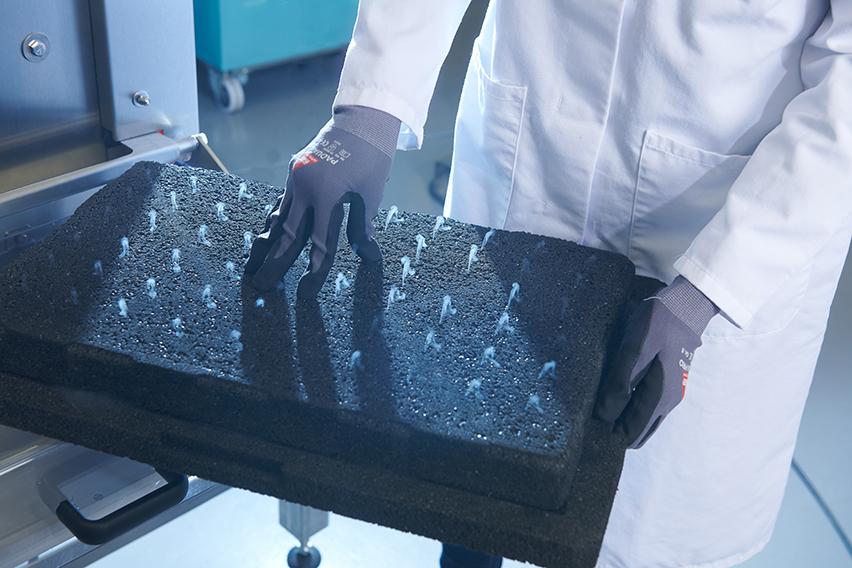
Germany: Proteins from sunflowers
When pressing sunflower oil, only about 40 percent of the seed weight is used for food. Until recently, the remaining components, which contain valuable fibers and proteins, were processed into animal feed or even discarded. The German company Sunbloom has developed a process that now makes it possible to recover proteins from sunflower seeds. Messer supplies Sunbloom with high-purity test gases used in laboratory analyses.

Switzerland: Flavor protection for vegan cheese
The food manufacturer New Roots in Oberdiessbach, Switzerland, has been using plant-based materials to produce alternatives to soft cheese, cream cheese, cheese spread, crème fraîche, fondue and yogurt for the past six years. The protective gas Gourmet N70 is used to package the various cheese spreads. It extends product shelf life, thereby also preventing food waste.
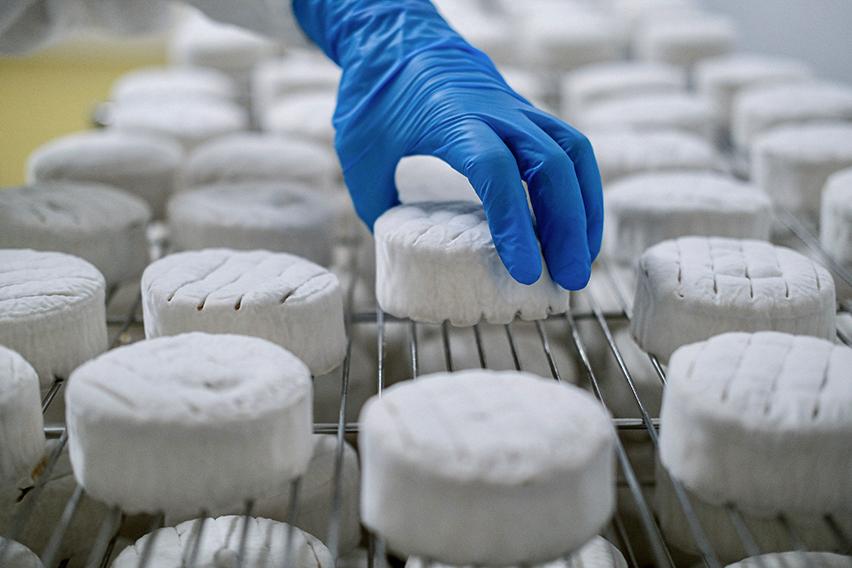
UN Goal 13 - Climate Action
Germany: Cleaning up the banks of the Rhine
Under the motto “Rhine Clean-up to Go,” Messer in Germany worked together with the City of Krefeld and Krefeld’s municipal waste management service GSAK to organize a spring cleanup campaign along the banks of the Rhine. And for the official international “Rhine Clean Up Day” on September 14th, 2019, Messer employees gathered up trash from along the banks of the Rhine and brought it to a collection station set up specifically for that purpose. Germany’s longest river, the Rhine flows from Switzerland to the North Sea.
Germany: Messer pitches in with RhineCleanUp 2020
Messer supported the RhineCleanUp again in 2020 and encouraged our employees to participate in this voluntary activity that removes thoughtlessly discarded litter from the banks of the Rhine. In 2018, together with the City of Krefeld, we organized this activity for the first time. On September 12, 2020, many employees and their families answered our call once again for active environmental protection.
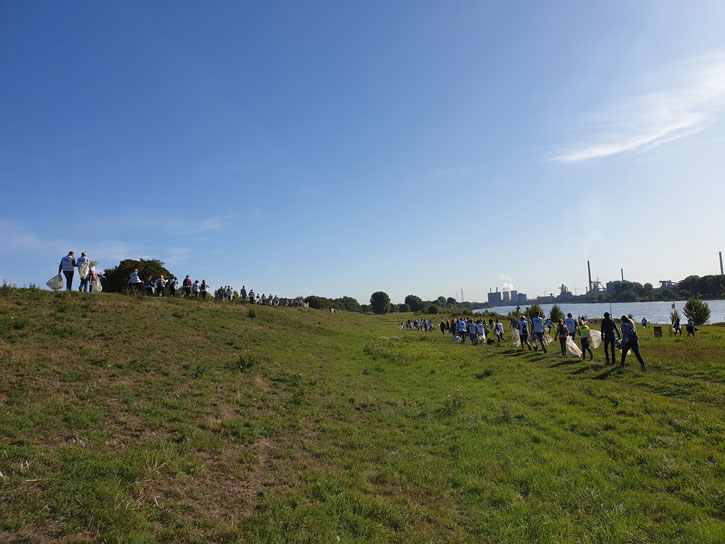
Germany – Campaign for a cleaner Rhine
Together with the initiative’s other organizers Krefeld City Council, the municipal waste management service GSAK and the waste disposal company EGK, Messer solicited volunteers for the “RhineCleanUp” once again this year. This involved cleaning up a 6.5-kilometer section of the banks of the Rhine at Krefeld. In Krefeld alone, over 300 volunteers took part in the transnational clean-up initiative on September 12 2021. The crew also included Messer employees and their families. The aim of this environmental campaign is to prevent even more plastic waste from reaching the oceans. 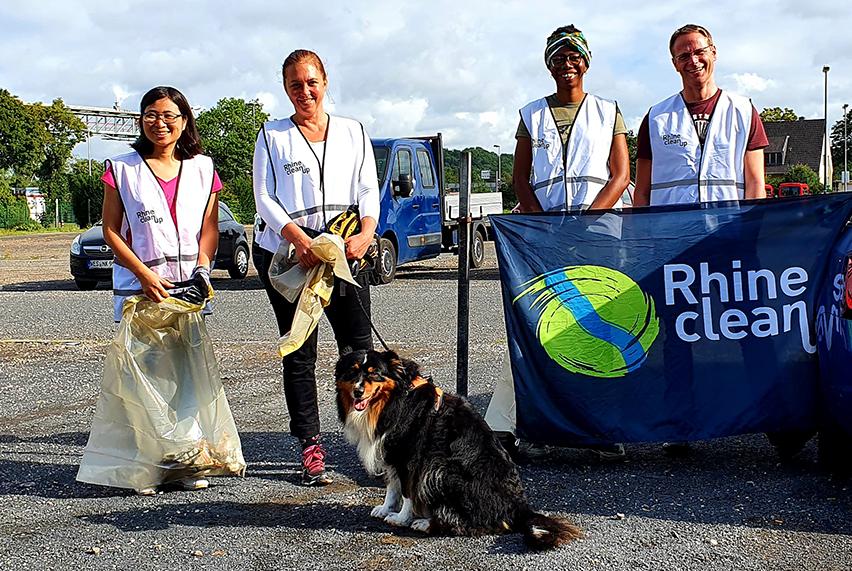
Germany: Healthy company vehicle
Bike riding is healthy and actively contributes to environmental protection. That’s why, since September 2020, Messer has made it possible for its employees in Germany to lease a company bike for a period of three years. The leased bikes or e-bikes can be ridden to work but are also available for personal use.
USA: Support for the 50th edition of Earth Day
April 22, 2020, marked the 50th anniversary of Earth Day, which is dedicated to strengthening our appreciation for the environment. Messer Americas took this opportunity to raise employees’ awareness and reinforce the importance of eco-friendly action – both in the workplace and in the private sphere. Customers were reminded that, within the framework of environmental protection compliance, everything will be done to support the worldwide efforts to minimize climate change.
Germany: Earth Hour 2019
“Earth Hour” – it’s the hour for nature. For the second time, industrial gases specialist Messer also switched the lights off at all its locations in Germany. Millions of people participated in the worldwide initiative of the WWF on March 30th, 2019, from 8:30 p.m. to 9:30 p.m.
Hungary: PET Cup race with boats made of plastic trash
The Tisza River in Hungary is polluted every year by a vast deluge of tons of household waste – mainly PET bottles and plastic bags – washed down from upriver areas in Ukraine and Romania. Every spring, the wave of pollution sweeps across the full breadth of the river, depositing its plastic waste in the floodplain forests along the Slovakian and Hungarian river banks. That’s why a team of wildlife filmmakers from the Filmjungle Society (Hungary) initiated the PET Cup: With strong support from local communities, the PET Cup starts with a social event to collect PET bottles. Several teams then use them to build PET boats for a race. Every year, Messer Hungarogáz supplies dry ice to stabilize the PET bottles, because dry ice generates high pressure inside the bottle. In 2019, PET Cup participants collected more than three tons of trash in three days.
Switzerland: Environment certificate
In 2019 Messer Switzerland received an Environment Certificate from the association PET-Recycling Switzerland (PRS). In Lenzburg, the Messer team collected 216 kilograms of PET beverage bottles for recycling. This saved about 648 kilograms of greenhouse gases.
China: Environmental Integrity Award
In 2019, the Chinese company PMG in Panzhihua received the “2018 Sichuan Environmental Integrity Enterprise” award, which specifies 22 criteria encompassing the avoidance and control of environmental pollution, environmental management, social oversight, and three other categories. Only firms that have achieved at least 95 points can earn the Environmental Integrity Award. Of all the companies that received the award, PMG was also the only one based in Panzhihua, a city in Sichuan province with a population of over one million.
Croatia – Croatian Sustainability Index HRIO
Messer was awarded the Croatian Sustainability Index HRIO in the “Medium-Sized Company” category. The evaluation focused on the company’s attitude vis-à-vis its employees, society, its customers, its suppliers, the government and the environment. The Croatian Sustainability Index HRIO is based on a ranking system that objectively evaluates and compares the social responsibility of companies and also audits compliance with the latest regulations of the European Union. The award is presented in three categories: Large Company, Medium-Sized Company, and Small Company.
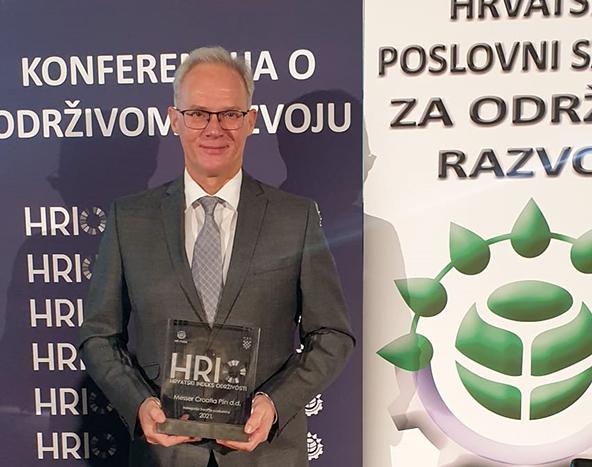
Hungary – Cave research for climate model
Historic climate research forms the basis for the development of long-term climate models. The Institute for Geological and Geochemical Research in Budapest, Hungary, uses gases from Messer to analyze stalagmite and sinter samples from limestone caves throughout the world. They give us a glimpse of a half million years of climate history. The characteristic limestone columns contain trace elements such as phosphorus, magnesium and strontium, the content of which fluctuates according to the climate conditions.

Spain – Responsible Care program
Messer in Spain was recognized by the Business Federation of the Spanish Chemical Industry (Feique) as a Responsible Care company. The reason for this is that Messer is committed to social responsibility and sustainable development in the performance of its activity. In Spain, a total of 59 chemical companies have joined the voluntary Responsible Care program to date. Responsible Care is an international voluntary initiative of the chemical industry for the continuous improvement of safety, health and environmental protection in all operations according to the principles of sustainable development and CSR. Messer companies in the Czech Republic, Germany, the Americas and Austria also support the initiative.
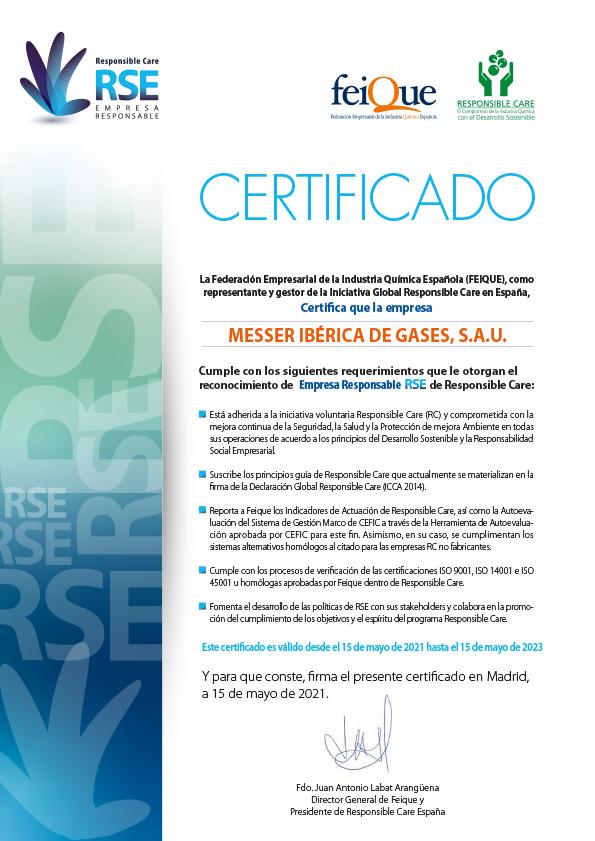
UN Goal 16 - Peace, Justice and Strong Institutions
Messer Compliance Management System
The Messer Compliance Management System (Messer CMS) emphasizes our sustainable understanding of values. It is the binding framework for action to manage conflicts of interest and to comply with applicable laws, regulatory requirements and the rules and regulations of all Messer business units. The Messer CMS serves the goal of creating a relationship with our stakeholders that is based on fairness, solidarity and trust. It supports those responsible in establishing and implementing our value system. In addition, the Messer CMS is intended to prevent potential violations as far as possible in advance. Through their clear commitment, our managing directors and executives support the Messer CMS.
Messer Americas has signed up to the Code of Conduct and also uses its own Code Supplement as well as a Code of Conduct for Supplying Companies. Other guidelines include guidelines on compliance with competition law and anti-corruption, a compliance guide for business partners and a data protection guideline for North America.
Compliance violations and cases of justifiable suspicion
Employees can report violations of applicable law or of the Messer Code ("compliance violations") as well as well-founded suspicious cases to the managing directors and managers at any time via the appropriate hotlines. These ensure that remedial action is taken immediately. In 2022, there were 5 such reports at Messer, compared to 16 in the previous year.
Data security
The Group IT Security Officer of Messer SE & Co. KGaA coordinates responsible security measures for the individual companies. He establishes the associated standards and develops the relevant expertise.
Through our IT security measures, we support the sustainability of our digitalization process and the physical security of our information, as well as the availability of the systems that our business processes require. An international team develops the relevant IT Security services.
In the year under review, various measures were undertaken to reorient completely the IT infrastructure of Messer SE & Co. KGaA. The new IT infrastructure reflects current, globally established standards, which makes it more effective, more stable and more secure – essential preconditions for working even more efficiently.
Raising employees’ awareness of IT risks
At the end of March 2021, to sharpen employees’ awareness of the scope and risks of cyber attacks, we launched the first assessment initiated throughout Europe via an IT security platform. Among other things, content covered e-mail fraud, safe use of the internet, the creation of secure passwords, and the protection of mobile devices. Based on the individual results of that first assessment, employees were referred for relevant training in a second step.
Phishing simulations as training measure
In the context of the “European Messer Phishing Campaign,” several phishing e-mails were sent out to the employees in Europe in 2021. The phishing campaign enables us to use an awareness platform to provide employees with specific training relative to the dangers of cyber crime. In this way, we minimize potential risks and strengthen the expertise of our employees.
At Messer Americas, the assessment of IT risks is part of the risk management program. Regular audits and reviews by third parties assess the security level, and the Executive Committee of Messer Americas receives regular updates on the current state of cyber security. Regular monitoring protects end devices, servers, applications, data and cloud platforms from cybersecurity attacks and threats. Monitoring by the infrastructure and security organization enables rapid reactions to attacks, vulnerabilities or emerging threats.
To raise the employees’ awareness of IT risks, Messer Americas relies on a combination of training, communication and online tools. This improves our ability to detect potential threats such as phishing e-mails or compromised business e-mails and to prevent the problems that would otherwise result from them.
New IT infrastrucuture for enhanced future and data security
Messer is currently implementing one of its biggest IT projects yet in Europe: the complete reorientation and reorganization of our IT infrastructure. In the summer of 2021, we transferred our business-critical systems, such as SAP and trip planning for bulk and cylinder gases, to a new external computer center in Frankfurt/Main. The computer center complies with the applicable international IT security standards for protection against virtual and physical threats. Moreover, it has multiple levels of protection against the loss of power, water supply or Internet connection.
Data protection
Messer undertakes to comply with applicable data privacy regulations. Appropriate structures are designed to guarantee a consistently high level of data privacy.
The Group Privacy Officer of Messer SE & Co. KGaA is responsible for coordinating corporate Data Privacy and provides managerial support for its implementation by the national subsidiaries. Pursuant to the EU General Data Protection Regulation (GDPR) and the German Federal Data Protection Act (BDSG), we handle the data of our employees, customers and business contacts in conformance with the law. Messer also implements legally required data protection measures relative to organization and documentation. Messer’s European national subsidiaries and Messer SE & Co. KGaA publish their data privacy statements on their websites in their respective national language to facilitate understanding.
Messer Americas complies with the applicable data protection laws, the relevant Code of Conduct of Messer SE & Co. KGaA for America and the Code Supplement of Messer Americas. In addition, Messer Americas has adopted its own data privacy guideline for North America. The Senior Counsel & Regional Compliance Officer of Messer Americas, the Head of Human Resources for North America Business Operations and members of the Legal and Compliance Team of Messer Americas are available throughout the Americas for questions concerning data privacy. Messer Americas also consults with external specialists on compliance questions.
Training programs on data privacy are included in the Code of Ethics and Conduct of Messer Americas. The “Code of Ethics and Conduct” e-learning course is mandatory for all Messer Americas employees.
Sustainable, documented supply chain
A sustainable supply chain is a prerequisite for Messer’s economic success. Relationships between Messer and its key suppliers play a crucial role here.
At Messer SE & Co. KGaA, the Logistics/Sourcing and Engineering/Production departments maintain close contact with these key suppliers. These central departments take charge of, or provide assistance with, the procurement of logistics services and commodities throughout Europe. The sustainable quality management systems of both departments are certified according to ISO 9001. Periodic audits of the key suppliers are an important part of their assessment.
The Production department helps the Messer national subsidiaries operate and maintain existing production facilities. The goal is to optimize production processes. Corporate computer-aided monitoring and control improves the cost effectiveness and energy efficiency of our systems, enabling us to reduce continuously the CO2 footprint of our plants. We consistently realize additional optimization potentials identified through regular process and energy audits.
The Engineering department is responsible, primarily in Europe, for the development, construction and modernization of units that produce technical and medical gases. In addition to plant design, project management, construction management, and start-up, this work also includes the procurement/purchasing of all required plant and equipment components. We apply the extensive experience gained during the construction and operation of existing plants to improve the efficiency of our plants continuously and to use technically high-quality, durable and energy-efficient components. Selected specialists work on advanced development for the continuous improvement of our processes – using, among other things, the latest process design programs and software tools.
In collaboration with Messer GasPack, the Logistics/Sourcing department ensures the availability and transport of all kinds of gases. This also includes the development of new logistics concepts and the rollout and operation of optimization and monitoring tools. In addition, procurement activities are conducted and coordinated throughout Europe. This applies for tank cars, stationary customer tanks, evaporators, electricity for the production plants, and gases from external sources. The leasing and periodic inspection of pressure vessels and fittings are another area of activity. The Logistics/Sourcing department also helps the national subsidiaries manage transport contracts and organize the transportation of heavy loads. Handling these specialized functions on a centralized basis not only provides economic benefits, but also serves to maintain consistently high quality standards throughout the company.
The Covid-19 pandemic sharply restricted the ability to conduct supplier audits again in 2021. Some outstanding audits have already been completed and others will be rescheduled for earliest possible completion. These audits focus primarily on the production process, the quality of the products manufactured, and sustainability. Since 2018, key suppliers have been obliged to adhere to the principles of the UN Global Compact, adding appropriate emphasis to sustainability, human rights, environmental awareness and working conditions. In the event of an unsatisfactory assessment, we work together with the supplier to develop adequate improvement measures. Critical non-compliance, however, leads to rejection of the supplier concerned.
Messer Americas also conduct regular supplier audits.
The procurement function concentrates on product category management, strategic procurement and expenditure management within the Procurement organization. This work also focuses on cost savings and occupational safety and health.
Messer Americas’ Sourcing team bundles expertise in the following categories: Indirect, Plants and Production, Merchant Packaged Gas, Customer Engineering Services, Logistics and Fixed Assets. In that context, it focuses on Category Management, Contract Lifecycle Management, Supplier Relationship Management and Compliance. The Sourcing team works closely with the operative team on all current investments. Messer Americas’ Sourcing team is subject to Messer Americas’ procurement policy and Messer Americas’ procurement guidelines.
Messer Americas’ Procurement group uses a supplier management system to guarantee quality and ensure compliance with standards that regulate operating performance, safety, the environment and social responsibility. Suppliers must submit a binding acknowledgment of Messer’s Code of Conduct Declaration. Moreover, Messer in the USA measures compliance with our standards by demanding compliance with our Conflict Minerals Declaration and our Supplier Quality Declaration.
Messer Americas’ Energy team manages the electricity demand – and with it, the Messer’s largest variable cost. In that context, the dedicated energy specialists work closely with the operations team to maximize utility and efficiency. To that end, power consumption is reduced during periods of high electricity prices or power grid emergencies.
In deregulated energy markets, the Energy team has implemented a direct power procurement strategy, which enables Messer to purchase electricity directly from wholesale energy markets. In addition, the Energy team uses an energy risk management program, which has resulted in lower and less volatile electricity costs. In regulated energy markets, the Energy team works closely with utilities, government agencies and other interest groups. This ensures that Messer obtains reasonable electricity rates that are in line with operating costs.
Messer Americas’ Energy team cooperates with local, state and federal authorities. This is the basis for obtaining allowances that reflect the operating flexibility and energy efficiency of Messer’s plants. Moreover, Messer participates in various industrial groups to help shape national and state energy policy. This primarily involves issues such as green energy, sustainability, reaction to energy demand, and the resilience of the electricity grid.
New “Integrity Line” for employees
Messer’s “Integrity Line” offers a new communication platform that makes it easier for employees to report not only improvement suggestions but also perceived irregularities. Observations and suspicions regarding possible compliance violations can be directed to designated contact persons by phone or online – in compliance with the law and in the local language. It is also possible to remain anonymous. To protect not only the reporting individuals but also the employees implicated in the alleged irregularity, the Management Board of Messer issued applicable regulations that define the reporting process and implements the requirements of the EU Whistleblower Directive. The “Integrity Line” and the regulations are part of our Compliance Code of Conduct.
USA – New process-oriented management system
To pave new ways of working, Messer in America implemented the Messer Americas Management System (MMS). It forms the framework for fundamental guidelines, processes and procedures that enable our business to run smoothly. MMS replaces the previous Integrated Management System (IMS) and makes it easier for employees to understand the principal components of our business. MMS is consistent with our principles and with our vision of becoming a preferred supplier.

